-
Posts
281 -
Joined
-
Last visited
-
Days Won
5
Content Type
Profiles
Forums
Downloads
Articles
Gallery
Events
Posts posted by Chief Savage Man
-
-
i hate reddit's layout. i find it to be a chore to read, but i will occasionally go there for a handful of things
-
Chapter Five: Stagnation is Death (Late October 1944)
A late night at the Knights Of The Constitution social club, Sydney, Australia
“And then that damn Chinaman came out and threw salt in the eyes of Big Jack Brown! When the Saboteur tried to get in to pin him after that, the crowd rushed the barricades and tried to kill him! It was wild!”
“I can’t believe you fall for that shit.”
“What’re you talking about?! I saw somebody slash up the Saboteur! He’s lucky he got out of there alive! You can’t fake that!”
“If it’s real, then why haven’t the police arrested that guy?”
“Because he’s got that mask, nobody knows who he is!”
“Yeah, but they put posters all over the city telling you exactly where he will be a week in advance. The police could just go snatch him out of the ring. Use your damn head for once. They put some guy off the street in a red and black mask and made him into a villain. He’s probably not even American.”
“Ahhhh, forget you! Johnny, you like to go! Back me up here!”
The two men at the corner of the bar look over at a graying man, who glances back over the rim of his pint glass.
“It’s fun. But it’s probably fake.”
The skeptic’s face breaks out into a wide grin, showing his handful of missing teeth.
“See?! You’re all alone on this one, buddy! You owe me a drink.”
He waves his empty glass in the face of the wrestling fan.
“But we didn’t bet on anything!”
“No, but since you’ll fall for that fake shit, I could probably con you out of one anyway. But I wouldn’t do that. I’m a nice guy.”
“Gee… what a pal. Hey kid, gimme a refill! And get this asshole one too, because I’m a nice guy too.”
………
“Kid!!”
Carl, the fan, shouts to get my attention. I’ve lost myself in my thoughts again. I stop wiping the bar… how long had I been wiping that same section just now? I don’t even know.
“Yeah, sorry… sure thing, Carl… What are you having again?”
“You forgot? Jesus Christ, kid, there’s only three people at this bar. Get your head together.”
Gus, the skeptic, speaks up.
“Don’t be a shit, Carl. I’ll take some of that stuff Johnny made that tastes like piss. That’s what my rude friend here was having too.”
Johnny, the third man at the bar, slowly raises his head to respond.
“It’s not covered by the ration books so you can either appreciate my piss or find somebody else to give you their ration slips since you drank all yours, you goddamn lush.”
“I know, I know, I’m just messing with you, pal. I mean it is disgusting, but it’s also appreciated.”
I pour three glasses of Johnny’s Piss, which is apparently Knights of the Constitution signature drink.
“We only need two, kid.”
After I hand Carl and Gus theirs, I pick up the third and knock the whole thing back in one gulp. It’s wretched. But it’ll work. Gus narrows his eyes at me. I know that look very well. It means he’s concerned about me.
“Christ, kid. Never you seen you drink like that before. Having a bad day or something?”
I take a moment to recover from the nasty burn of the bootleg liquor before I reply. I’m used to that question too.
“Yeah, I guess.”
“Well… it’s hard to have a good day around here. Can’t blame a man for being mopey.” mutters Johnny, barely loud enough for me to hear him.
http://lpix.org/3133190/australia1.png[/IMG]
Just then, the doors swing open.
“Ah fuck, here we go again.”
Leo strolls in, in an old but meticulously kept suit that is a bit too big on him these days. Behind him is Harry, a younger man, the closest person to my age in the Knights by far, though still a bit older than me. You’d think that would make us obvious friends, but no. He never says much.
“My fellow Americans! How are we all doing today?!”
None of my other three customers say anything. Finally, it falls on me to break the silence.
“I’m fine, Leo. Want anything?”
“Just a moment of your time, Freddie.”
“It’s Eddie.”
Gus snorts into his glass of Johnny’s Piss. Leo ignores both of us and moves on over to the small stage at the other end of the club and stands behind the rarely used podium. The seal on the podium depicts a Statue of Liberty-esque woman, with the Constitution in one hand and a sword in the other. Across the top of the seal reads: KNIGHTS OF THE CONSTITUTION. On the bottom is some shit in Latin. My father told me what it meant once, but I forget exactly. Something about redemption and the homeland.
Nobody at the bar gets up to go join him, despite Leo standing there expectantly. Only Harry takes a seat. After a few seconds, Leo just starts anyway.
“Fellows! We are the Knights of the Constitution! Our mission is to redeem our beloved United States of America from the forces of tyranny which have overtaken her! When I first came to Sydney, I found this hall, bustling with activity, the very center of patriotic resistance to France’s lapdogs! And I believe it can be that way again!”
Johnny slumps further down onto the bar. Gus puts his fingers in his ears and angles himself in his stool so that he knows Leo can see him doing it. Carl picks up his newspaper that he’s already read full through, also intent on obviously ignoring Leo’s speech.
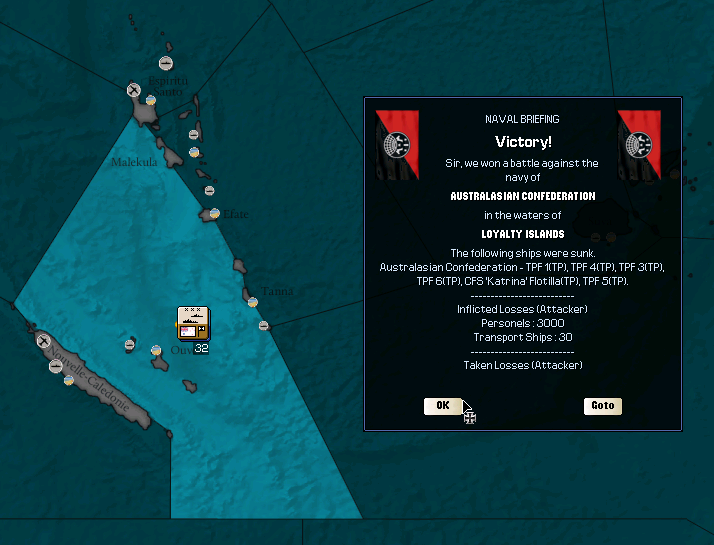
“Where do we start when it comes to revitalizing this movement of ours? Certainly, our strength has dwindled, but just like how the cause of South American liberty lived on so long as Bolivar survived his setbacks, our cause lives on so long as we survive!”
Johnny cackles at this and calls out:
“Hey look everybody, somebody gave Leo a book! And he read it!”
Gus and Carl laugh at that. Leo is visibly embarrassed, but trucks on anyway.
“Let us start by nurturing the good relations which we have. Australia has taken us in, and Australia could use our help in this dark hour! That is why I am asking you to help me collect funds for the widows and orphan of the recent tragedies that have befallen the Entente navies.”
Now it’s Carl’s turn to call out.
“I thought you were told to stop grifting in here! You’re not collecting shit for no fucking widows and orphans and you know it!”
Leo stops for a moment. He looks offended and even hurt by the accusation. I don’t think he’s putting that on. He’s never been a convincing liar. And honestly, even though he’s clearly a moron, I’ve never figured him as a bad guy. But I definitely wouldn’t get involved in any of his schemes.
“I am not a grifter. I am trying to get this organization used to doing things again. We have an obligation to our ally, but the truth is that we cannot depend on them to defeat our enemies using the strategies they’ve employed.”
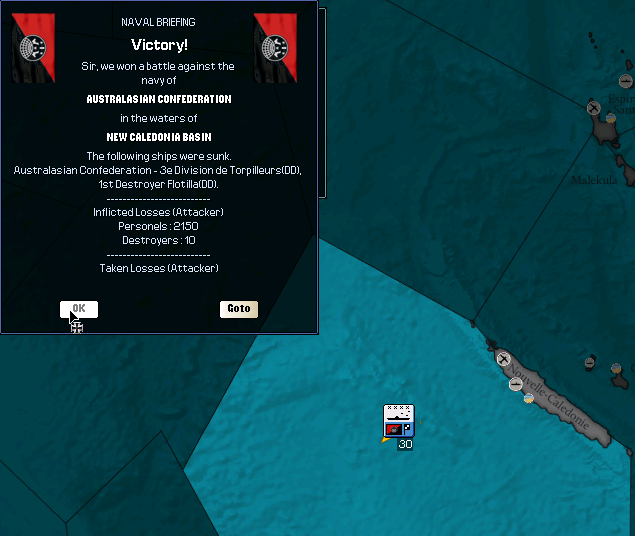
“Yeah, no shit, Leo. The only thing our benefactors in the British Empire seem to accomplish is getting all their ships sunk.”
Leo finally gives up on the podium and is now standing near the bar again. Harry is behind him, silent as ever.
“And that’s exactly why we need to seek new partners, outside the Entente. To make up for the strength which we’ve lost.”
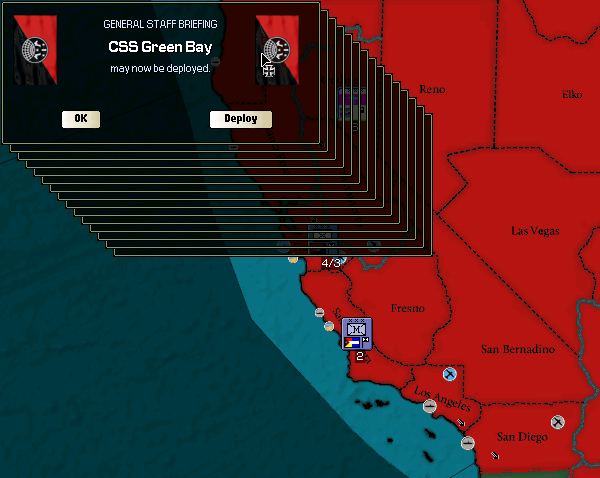
“Like who? The shipyards back home are cranking out more ships than any other country in the world could even hope to build.”
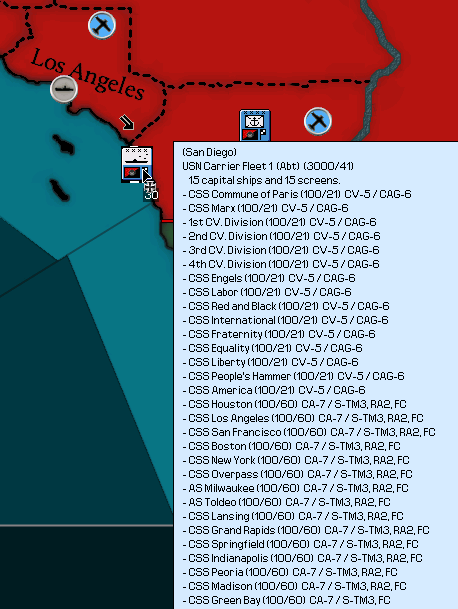
Johnny pipes up to back up Gus’ complaints.
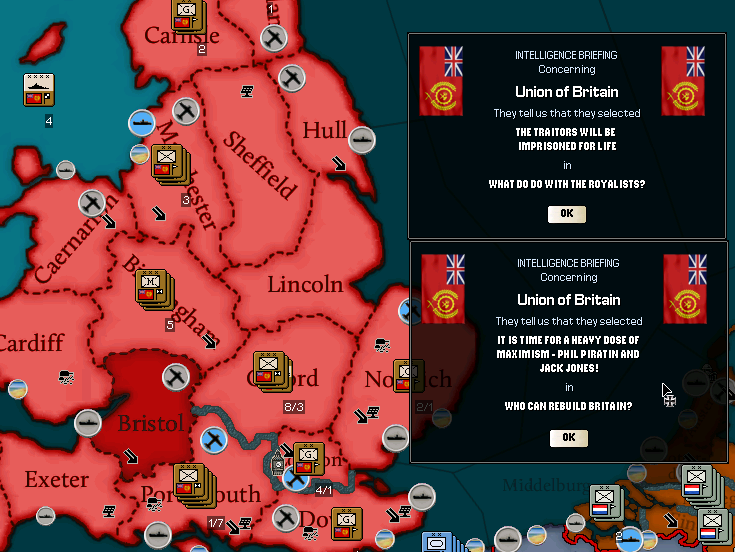
“Yeah, Leo, he’s right. The Red fleets are unstoppable. The only navy that even comes close is the Republican one. And I don’t think they’ll be too receptive.”
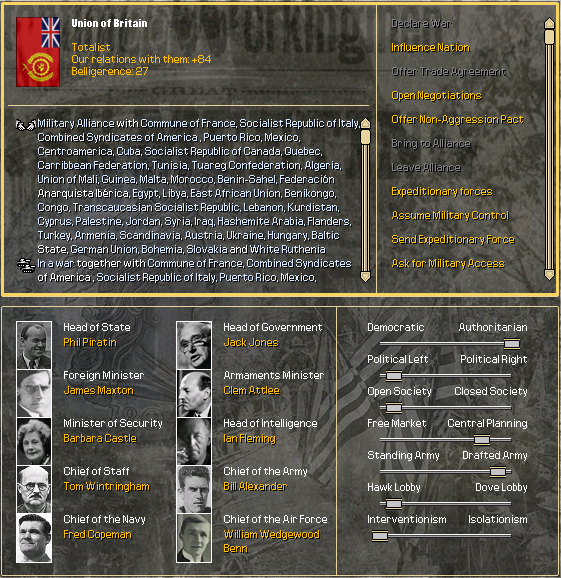
“Yeah and look at what happened the last time somebody tried some scheme to cut the knees out of under the syndicalists. Britain ended up worse than before! Face it, Leo, we can’t beat them out in the open and we don’t have the resources to beat them with tricks.”
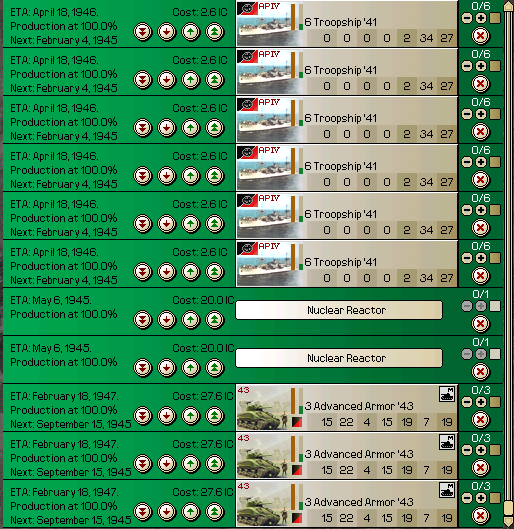
Leo is getting nowhere, but, bless him, he’s willing to keep going.
“So that’s it? You’re just going to stand here and wallow in self-pity while the Red war machine gets stronger and stronger?”
Gus, Johnny and Carl look at each other and me. Carl breaks the silence.
“Well… yeah, pretty much. I don’t really have it in me to uproot my whole damn life again. I’d rather just sit here where at least the people speak something I understand, and let come whatever will come.”
Johnny pipes in too.
“And they haven’t shut down the whorehouses in this town, so there’s that, too.”
Everybody looks at Johnny.
“What?! It counts for a lot in my book!”
Leo shakes his head.
“I can’t believe what this place has turned into. If the founders of this club could see us now…”
“Well, Leo, they can’t see us. Because they’re either in jail or dead because they went off on fuck-brained schemes.”
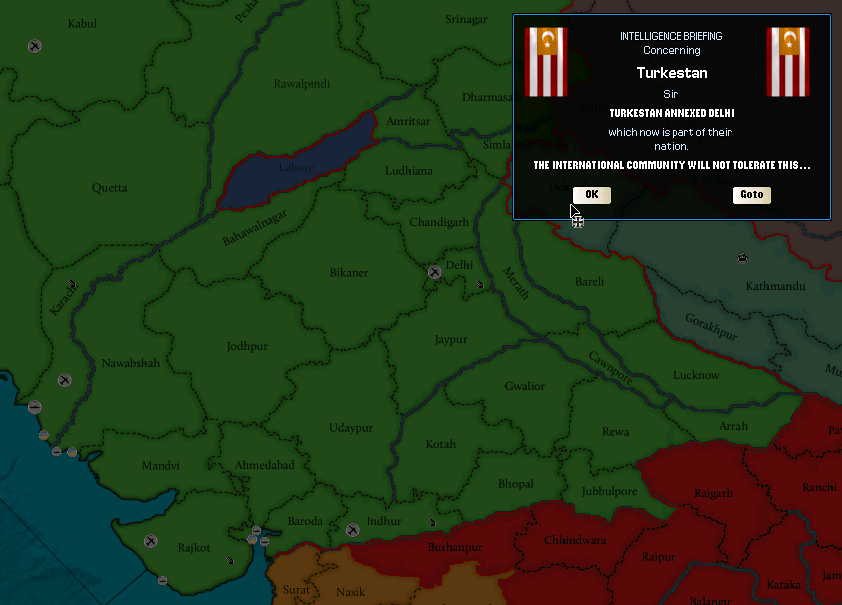
“Yeah, I wonder how Billy is doing? He was so thrilled to get to Karachi and start his new industrial empire. Now they’re probably cutting his cock off for drinking booze.”
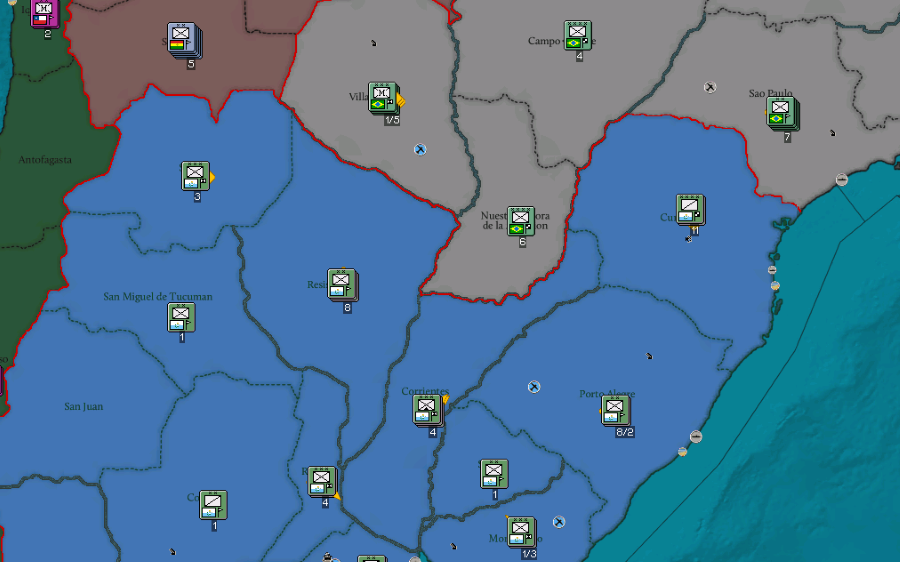
“Yeah, and Dick is probably getting tortured in a Rio jail cell on suspicion of being a La Platan spy. ‘I’m gonna help broke peace between La Plata and Brazil! A South American anti-syndicalist coalition!’ Didn’t work, did it?”
Carl stands up and puts his arm around Leo.
“Listen, buddy. Maybe you’re pulling another grift or maybe you’re sincere about all this shit. But face the facts, brother. We’re finished. The Entente, the United States… it’s all fucked. You have a hard on for glory and adventure but think about who you’re emulating. All those people who used to come in here… they all went off to fight the syndicalists in one stupid way or another… and they’re all gone. You’ll be happier if you just find a place to plant your feet. Whatever will be will be. We chose our side a long time ago, our side lost and the bill for that may finally be coming due. Just gotta accept that.”
Leo is silent and stone-faced. This clearly didn’t go the way he envisioned it.
“I’m getting out of here. I don’t think I can stand any more of the piss and I’m all out of ration slips.”
Carl takes his arm from around Leo’s shoulder and walks out the door. Gus and Johnny also mumble that they’re ready to go too.
“See ya, Eddie.”
I give him a wave.
“Leo… good luck out there. Harry… thrilling conversation as usual.”
And with that, I’m left alone with Leo and Harry.
“Leo… want a drink?”
“No ration slips, Freddie, but thanks.”
“You can have some of Johnny’s Piss.”
“Johnny’s what?”
I gesture towards the half empty glass that Gus left behind. Leo picks it up and takes a sip.
“Oh, what the fuck is that? No thanks, Freddie. I guess I’ll see you around.”
Leo walks out the door with as much dignity as he can muster. The very beginnings of dawn are visible outside. Have I been here that damn long? The sun is about to rise? It must be four or five in the morning. I need some sleep. Time to close up the bar.
But Harry is still standing there.
“Can I help you, Harry?”
“How do you feel about getting out of here?”
“I’m trying to, Harry. I’m about to close if you don’t mind.”
“No. I mean getting out of Australia.”
I don’t know how to respond to that.
“Is this one of Leo’s schemes? Because I’d rather stay here than drown on a trip to Atlantis or whatever stupid idea he has.”
“No. There’s a lot more going on here than you know. A whole lot more than what Leo knows. If you want to stay here and get executed when the Reds invade, then be my guest. But I’m looking for people. For Americans I can rely on.”
“Where would we be going?”
“Can’t tell you that until we leave. But I promise that it’s safer than here.”
He gestures at the glass of Johnny’s Piss.
“And I promise there’s better liquor.”
This is weird. This is insane. I can’t go with this guy. He’s said more words to me just now than he’s said to me in the past three years. And I know nothing about him, not really. What a ridiculous proposal.
“I’ll do it.”
Harry nods.
“Good.”
“Just let me say goodbye to my parents.”
“Fine.”
I look around the Knights of the Constitution Sydney clubhouse one last time. I am perfectly okay with never seeing it again.
I follow Harry out the door. He stops short in front of me and I barely stop myself from knocking him over.
“What the hell is that noise?”
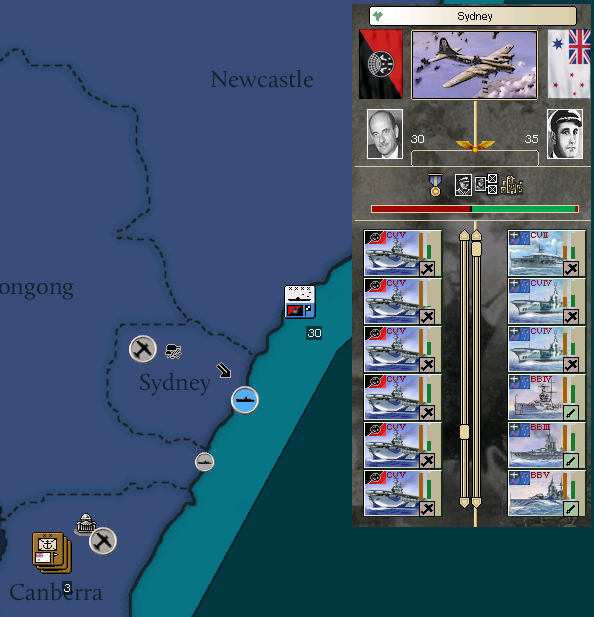
Harry stares up towards the direction it’s coming from.
“Fuck. Sorry, Eddie, no time for goodbyes. We’ve got to leave immediately.”
~*~*~*~
Four hours later and twenty five thousand feet above.
http://lpix.org/3133194/australia5.png[/IMG]
“Hahahaha! Three kills, Ella! You were amazing! That’s what you get when you mess with the ace!”
“There’s no need for that, Charles.”
“What’s wrong? The mission was a huge success. We got what… three, four battleships? A carrier! We got them back for what they did to England… and Scotland. Aren’t you glad?”
As I look out the cockpit of my Portland Air Works P-56, I see a city in panic underneath me. Massive pillars of billowing smoke rise from the harbor, but if I squint, I can see the fires spreading into the city beyond.
“No.”
“Why not?”
“I don’t know.”
I don’t know how to explain this to a recruit who has been overflowing with obnoxious enthusiasm ever since he had been assigned to the most famous fighter pilot in the world. I look over towards the plane to my left. Adrienne, my dear Adrienne. Two more kills for her. She gets so mad when I get more than her. It’s adorable. It’s the only part of this I still enjoy.
An explosion in the distance rocks me out of my meditation. Another battleship magazine had gone up. More dead. More young men who will never have what I have with Adrienne.
What the hell is wrong with me? We have everything we could ever want in each other. We could retire tomorrow and be lauded in Paris, London and Chicago as icons of our age. We could talk our way into a house anywhere in Europe or North America and then wrap ourselves up in each other for hours and days and months on end. Adrienne likes Provence. I like Oregon. We still need to work that bit out. We wouldn’t even have to work if we don’t want to, the locals would probably provide us with everything we could ever want just for the honor of having us live amongst them. Of course, we would do something. A flight school would be nice. We could certainly get a government to help us start one. Instead, here I am. Risking it all. Still.
“Why?”
“What?”
“Nothing. Stay focused.”
~*~*~*~
Fourteen hours later and twenty five thousand feet below.
http://lpix.org/3133195/australia6.png[/IMG]
Harry is peeking out the window again. A cool wind blows through it, as the panes shattered when the first ship exploded. Leo had slept through it, somehow. I couldn’t possibly sleep with that orange glow coming through the harbor. The planes… the bombs… the fire and death. This wouldn’t be the last time. I am right to leave.
“I think we should be good to move soon. Goddamned Navy. Every anti-air gunner in Australia is going to be trigger-happy tonight.”
“We’re flying somewhere?”
“Yup.”
“Where?”
“Lemme read that letter of yours and I’ll tell you.”
I hand it over.
Dear Mother and Father,
I regret to have to inform you this way that I have left Sydney. I was not able to take you with me and I cannot tell you where exactly I am going, because I do not know myself. The Knights will be around to see to Father’s needs. Just like Father had to take us from Nebraska in order to avoid the coming storm, I must take myself from Sydney in the same manner. I apologize for the inopportune timing of this decision, as you must have assumed me dead in the bombing. Rest assured that I am unharmed. I do not know if I will be able to write from where I’m going, but I will try.
Love, E-
I hope you will understand my predicament and why I’ve made this decision. In Sydney, it feels as if the ground beneath my feet is splitting in two, and the void created will assuredly swallow me whole. I must make a decision or I will be destroyed. This would be so much easier if there was a clear path towards a peaceful and prosperous life for all of us, but I do not see that path anywhere. There is a thick fog wherever I look, and the only things trying to guide me through it are regrets, and I’m not even sure which of those are mine and which belong to others. I just want to rest, but I cannot rest in this wilderness of uncertainty. True rest only comes at home, and our hearts tell us where home is. My heart doesn’t know where home is. It only knows where it isn’t. It is not here.
The very best,
Edward
His eyes read over it.
“Pretty melodramatic, kid, but that’s your business. Doesn’t reveal anything sensitive though, so I’m fine with it.”
“It’s not melodramatic! I just… I want them to understand why I’m abandoning them.”
“Are you like a wannabe poet or something?”
“I don’t know. I used to write a lot of letters like that when I lived in Vancouver. To a girl I had fallen for. It’s… Writing is the best way I know how to be honest with people.”
“A romantic, huh? Did she go for it?”
“No.”
“Hopefully you’ll have better luck with Tokyo girls.”
-
 1
1
-
-
Chapter Four: Old Home Week (Early October 1944)
Excerpt from the play The House of Pennington by Dale Sherman, premiered in Auckland, May 7, 1976
COLONEL DARBY and his TROOPS, dressed in combat gear, are crowded into a poorly lit mess hall of a submarine. COLONEL DARBY is standing beside a map that shows some sort of coastline.
COLONEL DARBY: Is everybody ready?
TROOPS: Yes, sir!
COLONEL DARBY: Excellent. Captain, have your unit ready to deploy from the conning tower in twenty minutes. The boats will be ready.
CAPTAIN RILEY is a short round-faced man. He speaks in a distinct Boston accent.
CAPTAIN RILEY: Yes, sir.

COLONEL DARBY: We don’t expect this to be a difficult mission. The enemy is disorganized, using fortifications we know the design of and we have a local expert in the form of Corporal Pennington. The enemy has taken a Republican radar station. We need it destroyed to give the Marines more time before they are detected.
The TROOPS stand and salute as COLONEL DARBY leaves. They sit back down and begin to converse amongst themselves. CAPTAIN RILEY sits next to one soldier, a handsome man in his early thirties who speaks in an English accent. His name is Corporal Henry (HARRY) Pennington.
CAPTAIN RILEY: Corporal. Are you prepared for this? I know that this is a different sort of operation than what you’re used to.
HARRY: It is different, sir, but I’m ready.
Another soldier interjects herself into the conversation. EDITH Hill is a woman of similar age to Harry. She speaks with a southern American accent.
EDITH: How do you know so much about where we’re going? Aren’t you from Bristol, Harry?
HARRY shifts uncomfortably. He knows this uncomfortable conversation is unavoidable.
HARRY: My father owned an estate in Cornwall. I would vacation there as a youth. The radar station is built near a graveyard where my little brother and I would go to try and find the oldest graves. We found an old path from the beach to the tops of the cliffs, only accessible by a cave. That’s the path I’m going to try to lead all of you up so we can sneak up on the station.
EDITH: An estate? Fancy. What did your father do to have that kind of lifestyle?
HARRY: He was a… erm… a banker… and a baron.
EDITH grimaces but says nothing.
CAPTAIN RILEY: Corporal Pennington’s parentage is known to the army, Edie. His honorable and brave conduct in the defense of London absolves him of any suspicion of Royalist affiliation.
EDITH: I didn’t mean to imply anything, Captain. It’s just odd to be in a unit with a nobleman.
HARRY: I am *not* a nobleman. I renounced all titles when I became a citizen of the Union of Britain, just like we all did.
EDITH: You don’t ever think about what you could have been? You weren’t tempted by the Royalists at all?
CAPTAIN RILEY: You’re out of line, Edie.
HARRY: It’s fine. I get this a lot. I wasn’t tempted at all. I just want the fighting to stop. I want all my lads to come home for good. That’s all. I don’t need any damn title. I just want my life back to normal.
EDITH: Alright, Harry. I’m sorry. I… trust you. It’s just a strange war, is all.
HARRY: It certainly is.
~*~*~*~
General Marshall greeted each reporter as they had come in. These reporters had been both his allies and thorns in his side throughout the European campaign, and he had tried his very best to deal with them honestly and gain their trust. He would need that trust to pay off now. Marshall now found himself in the unenviable position of being trapped between military and political concerns. The war against Germany had been difficult, but, for the most part, he had been left to his own devices. On the issue of defeating Germany and defending France, there had been virtually total unity between all the factions in Chicago. This war, in England, was different.

As the Vanguard reporter shuffled to his seat, the last to do so, General Marshall began to speak.
“I need you all, as usual, to agree not to speak about the details of what I’m sharing with you.”
They all gave their assent in a mumble of soft yesses accompanied by tired nods.
“We will be launching an amphibious assault against Royalist positions in Cornwall tomorrow morning.”
The reporters shuffled in their seats and took notice.

“This is surprising considering what we discussed last week, I know. We had been more focused on keeping the operation low risk and blockading the enemy until they can be easily destroyed with overwhelming force but, unfortunately, priorities have changed.”

“It has now become our goal to put an end to the insurrection as soon as possible. Capturing Cornwall will allow us to flank the enemy from the southwest.”



“We have a glut of landing craft waiting to be shipped back to America stored in France, so it is very much possible that we may launch a second operation against another target within a few days to increase the pressure on the enemy.”



“Birmingham has become the most important city occupied by the enemy since they failed to take London, and so we intend to recapture that city as soon as possible, and the amphibious landings will serve to draw enemy reinforcements from those cities. This serves two purposes: drawing the enemy out of more defensible cities and reducing the amount of damage these major cities will suffer during their liberation.”



“Our experience shows that surrounding enemy cities will result in shorter battles and less casualties, and so we should be able to flush the enemy out of Bristol and Birmingham with a minimum of bloodshed. That is our goal.”

The Chicago Proletarian correspondent raised his hand tentatively.
“Yes, Mr. Peterson?”
“If I may ask, General, what are you asking of us?”
“I’m asking you to not make a big story out of these attacks. If you would like to refer to them as raids, perhaps something less dramatic than an invasion, that would be helpful.”

“What is the purpose of that, General?”
“To be frank, Mr. Peterson, the political climate in Chicago is becoming restless and unpredictable. We have had a stable and functioning government throughout this conflict, but this British affair has caused panic and wild proposals back home, people are starting to wonder if this sort of thing could happen in America. We obviously have a lot we need to learn about what happened in Britain, but until the immediate threat is past, anything that makes the Royalist plot seem like more of a threat than it is will only serve to provide more ammunition to scaremongers. For instance, the necessity of a large scale amphibious operation.”
A few reporters nodded their heads. They were the ones who had been most cooperative. However, General Marshall knew which ones were most likely to object. As if cued by an invisible director, the Vanguard correspondent spoke up.
“General, we have been glad to censor ourselves in order to help the military win battles, but this… this is asking a lot. This is a political matter.”
“I’m not asking you to never speak of it. I’m asking you to wait until such a time where the Internationale is prepared to have a reckoning about what happened here. While the enemy still occupies our ally’s land is not the time. That is all I ask. Just a few weeks more.”
All of the journalists would nod their agreement now. Some were obviously conflicted about it. That was fine. He had spent years building up goodwill with these people, and this was the time when he needed to spend some of it. God willing, this war would be the last for a long time, and he wouldn’t even need to deal with things like this again.
~*~*~
Excerpt from the play The House of Pennington by Dale Sherman, premiered in Auckland, May 7, 1976
CAPTAIN RILEY, HARRY and EDITH are standing on a Bristol street in front of a stately mansion. It has suffered damage but is still standing.
CAPTAIN RILEY: Good Lord, what a house! You grew up here, Harry?
HARRY: Sure did. Until I was nine. That’s when my dad signed it over to the council during the Revolution.
EDITH: Your father just gave it up?
HARRY: He was a smart man. He knew the revolutionaries were going to win, so he let them have it and went off to Canada to try and find a way for all of us to get out, rather than get himself killed.
EDITH: I take it he never found a way?
HARRY: He got ill. And then he came home to die.
EDITH: I’m sorry. Did he die in this house?
HARRY: No. The council used this house as a headquarters. We had moved into a smaller house on the other side of town. He died there.

CAPTAIN RILEY: Well, we think that the Royalists used this house as a headquarters as well, we need to check it out. We were hoping you might look around since you know the house well.
HARRY: Of course, sir.
CAPTAIN RILEY: Just be careful in there. There was a firefight for this building, and it took some mortar fire. Looks structurally sound, but you never know.

The trio go inside the house. There are bullet holes and lots of dust, but the house is mostly still standing. A Union Jack is hung on the wall underneath a coat of arms, which features two lions fighting.
EDITH: This place didn’t get it half bad really. Compared to Flanders… or Austria. Not bad at all.
CAPTAIN RILEY: Or Spokane. The landings in Wales really helped us take the city quickly. Not much damage at all.

HARRY: It’s still… hard to see it like this. I’m dreading reading the KIA lists. I don’t want to see any friends here.
EDITH and CAPTAIN RILEY fall contritely silent, realizing how impolite they were.


HARRY: It’s fine. I’m just glad that it’s over. The enemy will be wiped out in North Wales and… it’ll finally be over. What are we looking for here anyway?
CAPTAIN RILEY: What we’re hearing from the civilians is that the King granted an Earldom to somebody in Bristol, who then ruled over the city as a military governor following the coup attempt. There’s been a lot of grim reports of atrocities against prominent socialists in the city. Torture, executions, rapes.
EDITH: Bastards!
CAPTAIN RILEY: But we don’t know who this person is, besides that they were the Earl. He disappeared. We need to track him down and bring them to justice. Hopefully we can find a clue about his identity here. The Benjamin Franklin Corps has already been through here but didn’t find anything.
HARRY: There’s… one place I can think of they probably didn’t look. My father had a false compartment in his office. I saw him use it once when he didn’t know I was watching.
CAPTAIN RILEY: Let’s try it.
The trio walk over to an office. HARRY fusses with a panel on the back of the old bookcase in the office.
EDITH (running her hand along the wood of the bookcase): This is a nice bookcase, Harry. You should move it to your house.
HARRY: Honestly… I might. Goddamn thing… come on. Got it!
The panel pops open. HARRY pulls out a stack of folders and places them on the desk. Each of the three pick up one and begin to leaf through.
HARRY: They’re definitely not my father’s papers. I saw him empty this compartment out when we left this house.
The three silently peruse the documents. EDITH holds one up to read it more closely.
EDITH: Harry… are you related to a James, or a Marion?
HARRY (looking concerned): My brother and my mother. Why? Were they captured?
EDITH: No… I think…
EDITH shakes her head and passes the letter to HARRY. He reads it silently, looks shocked and falls backward into a chair.
CAPTAIN RILEY: What is it, Harry?
HARRY hands over the letter to CAPTAIN RILEY, then puts his head in his hands.

CAPTAIN RILEY: Oh… oh no. Listen… Harry, you’ve done a lot for us already. You don’t need to be involved in this anymore. The war is over. You can go home. We’ll have somebody else handle this.

HARRY starts to his feet and storms back to the other room. He tears the Union Jack from the wall and throws it to the ground. CAPTAIN RILEY and EDITH follow him in. HARRY is looking at the coat of arms on the wall.
HARRY: If my brother… The Earl… has done all these things, then there’s no home for a Pennington in this city. I will probably have to leave. The least I can do to redeem my family name, that coat of arms, is to be the one to find him.
HARRY sits up against the wall, crushed by the relevation. EDITH sits down next to him and consoles him, as the scene fades to black. End of Act Two.
-
yeah and im Bobby Hill
-
 1
1
-
-
also i think everybody who has had a CN or PnW persona that has been able to act with some measure of influence is familiar with the sense of another identity as a kind of suit and a filter that you put yourself through to achieve your goals. Not necessarily that you lie to people in CN or PnW about who you are but you make a choice about how you want to project yourself 'online', which, if your sense of your 'true identity' is fucked up like Shallan's is, can be a bizarre experience. Everybody has to deal with multiple projections of themselves (how one is at work, how one is at home, etc) but with the power of the internet, we can do a lot more to differentiate ourselves 'on here' from who we are in our day to day real lives. I appreciate Shallan's character because she has the capability, both through social training and her powers, to project multiple versions of herself that are made out of both utility in the moment and her aspirations for who she thinks she wants to be. Resolving those identities for me in my real life was an interesting experience, as I found that CSM could stand to be more like Tim and Tim could stand to be more like CSM. Shallan having to put together her identities to decide who she is and what she wants is something I've enjoyed and am hopeful will continue to be good reading.
-
 4
4
-
-
shallan is a powerful loon, i identify with it
-
 1
1
-
-
Chapter Three: London Calling (Late August – September 1944)
Excerpt from Albion Alone: A British History 1944-1988, by Gerald Baker
The plot was clearly not intended to launch as early as it did, and we may never know for sure why the conspirators jumped the gun. The rejection of the Irish proposal certainly had angered Lawrence and the Scottish independence movement was gathering steam, but it surely would not result in a separation before the end of 1944. A popular theory is that his supporters were beginning to turn on one another, so he launched the plot early to keep one from defecting and ruining the entire scheme.

Either way, in the night hours of August 26, 1944, the counter-revolutionaries struck. Royalist cells activated all over Britain and attacked local centers of power. The Republican Army was based in two staging areas for the planned invasion of Ireland: Cornwall and Scotland. Lawrence had spent the last year filling the ranks of Republican Army division commanders with loyalists. When the plot launched, the commanders of both the Northern and Southern Army Groups moved to raise the royalist banner. They mostly succeeded in Cornwall, with a few mutinous battalions being destroyed, but Scotland was a different story altogether.

The plotters planned to secure control of the Army before announcing the reformation of the United Kingdom. In Scotland, these two things occurred in reverse. Defensive militias under direct union control caught wind of the plot before the royalists in the Army got the signal to move. The militias, supported by the Republican Marines and the Navy, moved to surround the barracks of the Army around Glasgow, and presented an ultimatum. The divisions in Scotland could either mutiny and provide their treasonous generals for summary execution, or they could be bombarded by the Republican Navy. All divisions in Scotland chose the former option. Seven generals were executed by firing squad.

As the sun rose on the day of August 26, the royalists found themselves in control of Western England. Their forces were bolstered by exiles from Australasia and Canada who had taken up a Republican offer to settle in Britain. Most of the immigrants were socialists, but many were royalist agents given the identities of imprisoned socialists from their homelands. This allowed them to enter the country based off British lists of union organizers and syndicalists who should be permitted to enter.

The result was a strong Royalist Army in control of Western England and a strong Republican Army in full control of Scotland. Ad hoc workers militias retained control of Southeast England. Most critically, London had held. Thousands of Londoners had woken to the sounds of gunfire and mobilized to free the delegates of the Trade Union Congress being held hostage in the Parliament building. The Royalists in London fought long enough to buy time for General Lawrence to escape to Plymouth before being overwhelmed by the locals. Despite the failures in Scotland and London, the Royalists had a lot to be happy about. They had control of defensible terrain in Cornwall, Devon and Wales, and the flatlands of England proper were barely defended.

Lawrence had always planned for the plot to take place after American forces had departed Europe. His plan to slow the arrival of French reinforcements was comprised of two elements. First, he intended to control every major port in southern England, thus denying reinforcements from northern France ports to disembark in. The spirited resistance of dockworkers in Portsmouth, Norwich and Dover had prevented those ports from falling into Royalist hands at first. However, they couldn’t hold Portsmouth against trained infantry units who would come to the city six days after the initial coup. The enemy was bearing down quickly on Dover as well. The workers militia of London, numbering well over fifteen thousand after the first week, had set up defensive positions, ready to hold the city against the expected assault, but they were vastly outnumbered and outgunned by the approaching Royalists, and they were too disorganized to try and move south and defend the port of Dover.
The other part of the plan was to sabotage Continental ports that could handle loading thousands of troops at once. Stockpiles of ammunition being returned to Britain were purposely scheduled by the plotters to depart major French ports, as well as the port of Antwerp, on the morning of August 26. Royalist agents on the ships containing this ammunition would disable and set fire to the ships, creating a massive hazard that would delay any attempt at rapid reinforcement long enough for the Army to defeat any militias. Two things had gone wrong with this plan, firstly, the Northern Army Group had stayed loyal to the Republic.

The other thing that went wrong was the miscalculation of the Royalist agent in Cherbourg. The plan in Cherbourg was to disable the ship in the entrance to the harbor and then set fire to it in such a fashion that the fire would approach the ammunition stores but not actually ignite them right away. The firefighting effort and the unwillingness of the Internationale to have any ships go near a vessel that might explode at any moment. Theoretically, this would effectively shut down the port for the needed duration and allow the agent time to get away. The agent was evidently unaware that some crates of ammunition were stored in the section he set the fire in. The ship’s entire ammunition store went up almost immediately after the fire was set, causing an explosion so powerful that it was heard as far away as Rennes and Exeter. This caused significant damage to the city and the harbor, but the agent failed to achieve his goal. The ship was blown apart so completely that no hulk remained to actually block the harbor. Pieces of the ship rained all over the city and caused hundreds of casualties, but the harbor itself was mostly operational within three days.

Republican Navy commanders loyal to the Republic were present in Paris for the ongoing African Liberation Conference, along with American military leaders and the French general staff. The conference was ended prematurely and the military leaders in the city formed a unified command in Paris for the purposes of defending the Republicans in Britain. While Lawrence may have hoped that the presence of some of his domestic rivals at the Conference would make his plot easier back in Britain, it turned out to be fortuitous for the Internationale. American armies that were packed up and ready to go back home were instead sent to Cherbourg.

The first American reinforcements departed Cherbourg for Dover on September 9th, just two weeks after the Royalists attacked.

It was, suitably, the Transatlantic Expeditionary Force, the famous corps which had been formed as a marriage between American worker militias and a division of British volunteers in the first weeks of the Second American Revolution. General Maurice Rose, one of the most decorated generals of the conflicts with Germany and Canada, led his exhausted troops into Dover. The units had not been in a fighting mode for months and were exhausted by the ordeal of working day and night to load trains and ships in their mad dash to the north of France.
There had been reports of attempted mutiny when some of the American divisions were informed they would be sent into battle again. After months of peace and a glorious homecoming only weeks away, the thought of more war was deeply upsetting to most American soldiers. The exception was in the TAEF. This was because of one of its member divisions: the legendary Colliers division of British veterans who had served alongside Americans for almost eight years on three continents. While British soldiers made up less than 10% of the TAEF, the entire corps felt an internationalist spirit only matched by their Franco-American comrades in the Benjamin Franklin Corps. The Colliers’ experience and professionalism had been the deciding factor in the defense of Roanoke in 1936, a pivotal moment which kept the Union State from gaining an advantage in Virginia. Now the Colliers’ homeland was the one under threat, and the Americans in the TAEF were eager to repay the favor done eight years prior.

The Republican Army was holding firm in both Manchester and Liverpool. With the situation around London stabilized by September 11, the Internationale command sent the second batch of reinforcements to the still open port of Liverpool to hem in the Royalists from the north.

The Abraham Lincoln Corps, under the leadership of Harry Haywood, was just as exhausted as the TAEF when they docked in Liverpool. Fortunately, their mere appearance was enough to make the Royalists retreat to Birmingham and set up defensive positions.

Lawrence’s plan, like the saying goes, had not survived contact with the enemy. The failure to gain control of the northern divisions had been unexpected, and the arrival of American reinforcements within two weeks had thrown a major wrench into his designs. The best option available to him was to separate London from Scotland, the strongest base of Republican support. The Royalists attacked northwest, seizing Oxford, Luton, Grimsby and Lincoln, threatening Hull and controlling the northern approaches to London, and severing the land connection between the northern and southern Republican loyalists.

A third group of American reinforcements were dispatched to Norwich, to prevent London from being enveloped and to take back the East Midlands.

With the East Midlands under attack from north and south, the Royalists could not hold their gains. Lincoln was recaptured on September 18.

With three large American corps present in England, the Royalists were running out of options. The feeling of the Royalists at this critical juncture can be best summarized in the journal of General George Giffard, a Royalist commander who had the following to say when his position in Cambridge came under heavy assault by a superior American force:
“It was a tremendous feeling to liberate the great universities of England, but it has become eminently clear that we will not be able to hold them for long, perhaps only a few weeks. That is what this entire scheme has come to feel like: we wanted to bring back what the Empire used to feel like, and now that we’ve had the chance to play pretend, reality is setting back in. This was folly. The French and Americans cannot be resisted. Nobody will say so out loud, especially not to Lawrence, but I fear all we have left to gain is an honorable death for King and Country.”

Giffard was wrong. He only held Cambridge for one day after he wrote those words, and Oxford fell two days later.

As the end of September approached, the Internationale had established a solid front line for the first time in the month since the British Civil War had begun. While Northern Wales had been taken by the Royalists, fifty-four American and twenty-five Republican divisions manned a line that stretched from Liverpool to Brighton. The Royalists had been contained.
-
 1
1
-
-
Chapter Two: So Long, It’s Been Good to Know You (Early August 1944)
INTERNATIONALE WAR COUNCIL BUSINESS – TOP SECRET
Regarding Authorization of Offensive Action Against: Iceland
Introduced by: The European Union on Behalf of Scandinavia and the Union of Britain
Summaries of Briefs in Favor:
Scandinavia: The government on Iceland was installed by Royal Canada and it has suppressed the trade unions on the island ever since. Now that Mitteleuropa and the Entente have been driven out of Europe and North America, Iceland stands isolated but still refuses to allow trade unions to operate on the island, even when we offered food aid in exchange for their relegalization. The island is at risk of famine. A quick and decisive invasion of the island would sweep away the illegitimate government and allow food aid to stave off a humanitarian disaster.
Union of Britain: Iceland is positioned to threaten sea lanes between North America and Europe. Canada once attempted to use the island as a staging area for an invasion of Britain, and so we must endeavor to eliminate this threat.
Summaries of Briefs Opposed:
None filed.
The European Union votes AYE.
The African Union votes AYE.
The Organization of American Syndicates votes AYE.
With a vote of 3-0, the motion passes.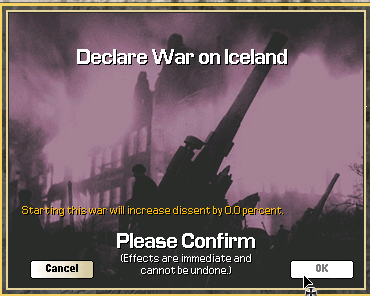
INTERNATIONALE WAR COUNCIL BUSINESS – TOP SECRET
Regarding Authorization of Offensive Action Against: Ireland
Introduced by: The European Union on Behalf of the Union of Britain
Summaries of Briefs in Favor:
Union of Britain: Ireland under the Collins regime is a hostile nation and a threat to the internal security of the Union of Britain. Ireland harbors agents who engage in espionage against Britain and suppresses the trade unions who could end Ireland’s hostile stance towards the Internationale. The longer the Collins regime goes on, the firmer its hold on the Irish people becomes. An invasion posthaste is the best policy to secure the European Union against counter-revolutionary forces.
Summaries of Briefs Against:
Combined Syndicates of America: There is insufficient evidence that the Collins regime is operating an espionage program that would be threatening enough to justify a costly invasion. The Irish coastal defenses are well developed, and while Internationale forces could certainly break through, the cost in lives would be hard to justify. Given time, our subtler efforts to undermine the Collins regime will bear fruit. There must be patience on the Irish Question.
East African Union: Ireland was one of the first territories conquered when the Kingdom of England began its quest to colonize the world. The idea of liberating the Irish people with an invasion led by the British is foolish in the extreme. How do we expect the Irish people to regard our socialist movement if their blood is shed by yet another invading British Army? There is an extant tradition of socialism in Ireland, and the only way we can wish to bring that island into the light is for the people themselves to cast off Collins and come into our alliance as a proudly independent and socialist nation. Intervention can be a necessary step in certain circumstances, when there is a major threat or a pressing humanitarian concern, such as the brutal colonial regimes in Africa that our allies helped us to cast off. Ireland is neither so desperately oppressed or desperately impoverished that a bloody invasion is worthwhile. To cast Ireland into chaos with a military expedition led by General Lawrence, whose motives we find inscrutable at best and suspicious at worst, is unacceptable to the East African Union.
The European Union votes AYE.
The African Union votes NAY.
The Organization of American Syndicates votes NAY.
With a vote of 1-2, the motion fails.Sandra woke up too early and could not get back to sleep. She could use the extra rest but the last time she had fallen back asleep after getting up too early she had slept too late and missed the beginning of her watch. She couldn’t afford to do that again, not with how much she’d been messing up.
So, Sandra decided she’d go relieve whoever was on watch early. It was the safe thing to do. She could probably get away with napping in the tower anyway. Nobody was really inspecting the watches anymore.
The sun wasn’t up just yet, and it was plenty dark. The camp was mostly asleep, the only noise coming from the winds coming in from the Channel and the occasional noise of a truck rumbling towards Cherbourg. A few silhouettes moved about patrolling the camp. A few lit cigarettes could be seen atop the watchtowers, one of a million ways this postwar army ignored security concerns. This was Normandy after all. It’s not like there were any French partisans ready to snipe an American. Sandra approached the ladder to the watchtower. The person on watch was supposed to have seen her by now and called out the challenge. They didn’t. Sandra climbed on up anyway.
When she poked her head into the watchtower, she saw a man sitting with a guitar, so dimly lit that Sandra could hardly even tell the color of his skin.
“You’re early, comrade.” the man said.
Sandra explained her reasoning for coming early.
“Well, if it’s nothing to you, miss, then I’d like to sit out my watch.”
Sandra didn’t question the man, and instead she just ambled over to the side and looked out over the camp and the Channel in the distance. Another watch began. The man spoke up.
“I don’t think we’ve met. What’s your name?”
“Sandra.”
“That’s a fine name. How old are you, Sandra?”
“Twenty.” she lied.
Her face was illuminated by the moon, while he sat with his back to it. He studied her face for a moment. Nobody ever seemed convinced by the fake age (it was really seventeen), but this man, like most people, didn’t challenge her on it. He looked back at his guitar and began strumming it again.
“How’d you end up in the army? Drafted?”
“Volunteered.”
“Really? How come?”
“That ain’t interesting.”
He stopped strumming and looked up at her, his gaunt features clearer than before.
“You volunteered to go to war, Sandra. To die for something, if you ordered to. That’s a decision that can’t help but be interesting.”
Hearing his words hurt her. She had volunteered rashly, to stick it to her mother who told her she had to deal with the horrible people at the factory because the war effort was too important to worry about what she wanted. So, she had lied about her age and joined up, just to get away. And now she was here, just taking up space and resources. Not fighting at all. Doing busywork.
“I… wanted to show the boys that us girls were tough enough, that fighting ain’t just for the boys.”
She stole this line from a propaganda poster back home that exhorted young women to enlist. The slightest of smiles creeped onto the man’s face.
“If a boy can’t see that the girls are tough enough, then it’s because he don’t wanna see. I take it you ain’t seen much fighting? You don’t look like you have.”
“None.” she admitted, with a note of embarrassment.
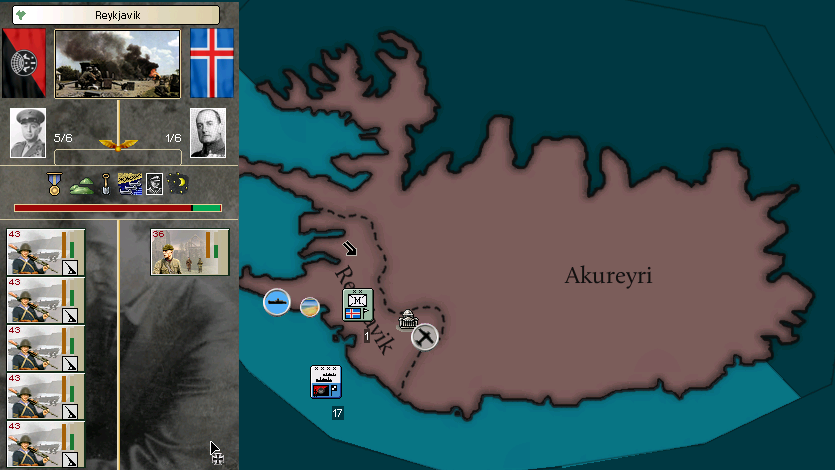
“You don’t have to be ashamed of it. Nobody oughta go looking for mortal danger. Either way, you should have joined the Marines if you were looking to show everyone how tough you are. They’re crazy bastards. Did you see they were up in Iceland?”
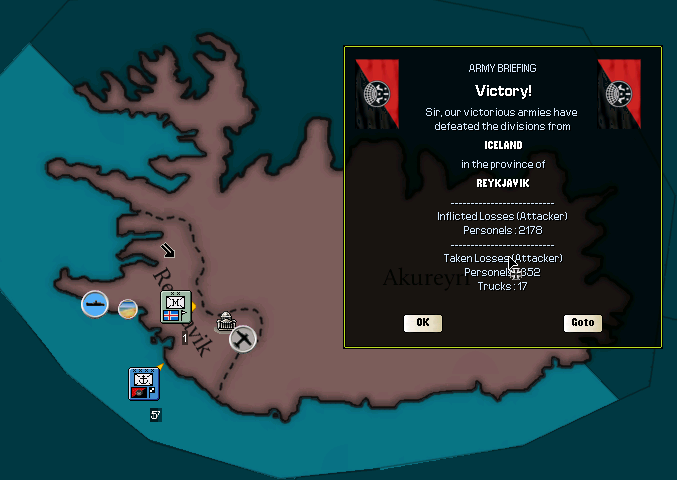
“Yeah, I read about that, but they said there was no resistance, so not really any fighting.”
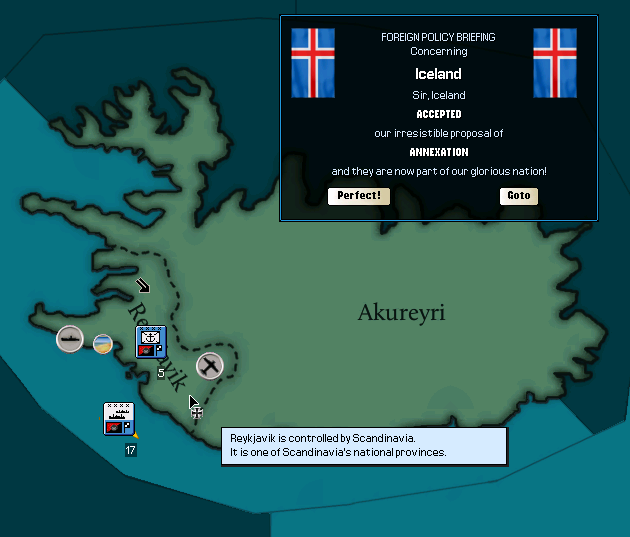
“Sandra, darlin’, you need to learn what the Army means when it says something. They said ‘virtually’ no resistance. That means resistance. Maybe only a hundred or so got killed.”
Only a hundred or so. She had seen a man killed once, in ‘37. The Klan had come out of their hidey-holes in the woods and tried to shoot up a union meeting, but the Syndicate Guards had been tipped off and killed the whole lot of them. One of the Klan had tried to hide in the back yard of her mother’s house. His rustling had woken Sandra up, and she peered out the window in time to see one of the soldiers stab him with his bayonet. He hadn’t even tried to arrest the man. Just stabbed him in the chest. Even that wasn’t so bad. She had just seen two figures in the dark and heard the cry of pain, and that was it. It had to be so much worse to see your friend get killed, or to actually do the killing yourself. Sandra wasn’t a killer. Everyone around here boasted about the killing they’d done or would have done if they had gotten here in time to fight Germans. Sandra played along, but truth be told, she didn’t want to kill anyone. She had just wanted to get out of the factory. She didn’t want to be a part of anything where “only a hundred” people die.
“How long you been with the army?” she asked the man.
“Since ’39. I lived out in California and got in with some of the syndicalists. The government arrested me for some literature I wrote. Luckily, I knew one of the policemen, so he told me he’d let me go if I agreed to leave the Pacific States and never go back. So, they dropped me off in Arizona, and I drifted east to New York. Joined up when it looked about time to clear the Entente out of California. Since they had arrested a lot of my comrades out west, I figured I owed it to them to bust them out, so to speak.”
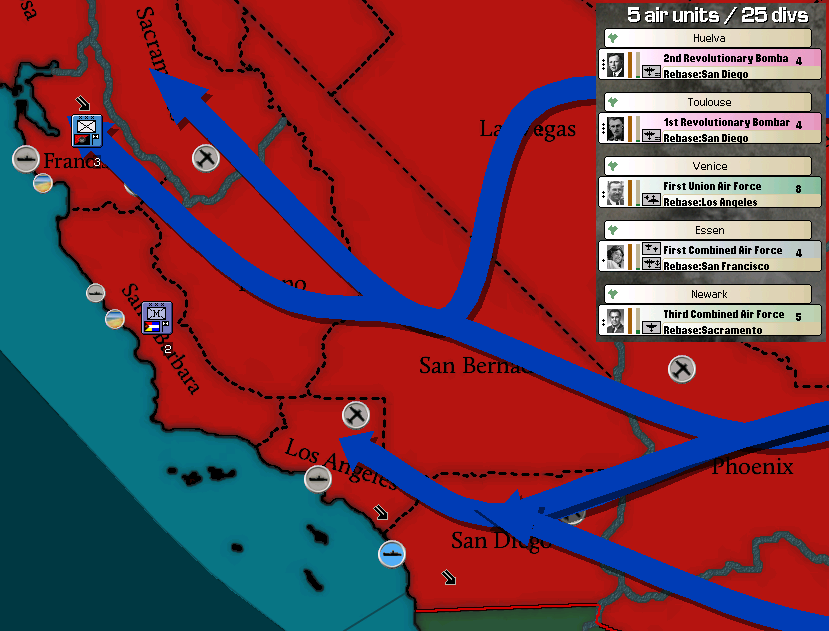
“What’s California like?”
“Beautiful. I could talk about it for days and still have more to say. You really need to see it for yourself.”
Sandra was silent a moment, then spoke up again.
“Truth be told, mister, my main reason for joining the Army was because I wanted to get outta my town. Didn’t really care where I went. Didn’t think about the killing part until they put the gun in my hands. Ain’t seen much death and don’t really care to. I don’t really care to go back home when I’m out of the Army. I’ve heard nice things about California… that’s why I asked.”
The man chuckled softly.
“How many places other than home you’ve been, darlin’? Before joining the Army, I mean.”
“Went to Knoxville… once.”
“I wrote a song you might like. Would you like to hear it?”
“I would.”
~*~*~*~
DECLASSIFIED 28/7/1990
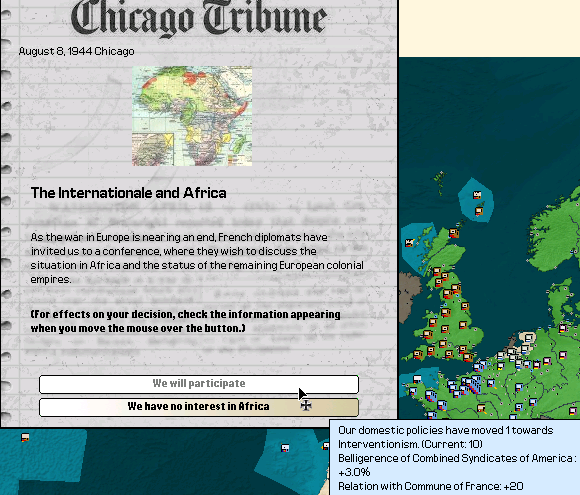
Curator’s Note: This recording was taken as part of the domestic intelligence service’s clandestine monitoring of the delegates attending the African Liberation Conference in August of 1944. It features a conversation between ASA PHILIP RANDOLPH, a delegate for the Combined Syndicates and DAVID KIRKWOOD, a delegate for the Union of Britain.
KIRKWOOD: Ah, Mr. Randolph. It’s good to see you again. How have you been since Chicago?
RANDOLPH: Well, Mr. Kirkwood, and yourself?
KIRKWOOD: I’ve been better. Very hectic days, but it’s good to get out of Glasgow again. Is this your first time in Paris?
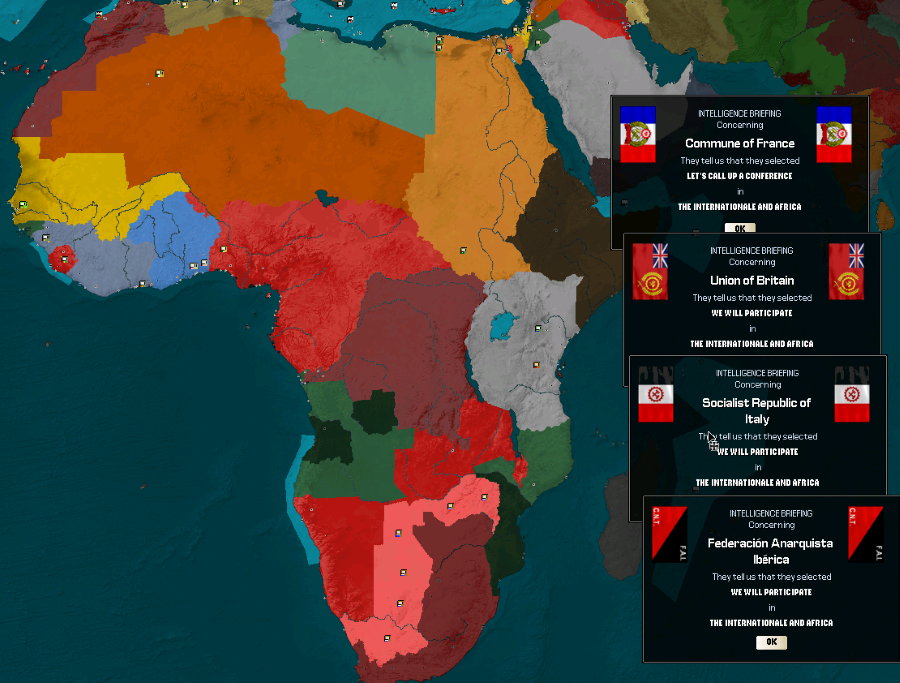
RANDOLPH: Yes, it’s quite lovely, though I do wonder why this needed to be in Paris. Why not have an African Conference in Africa?
KIRKWOOD: I said the same thing! I was told it was so that they could get it over with sooner. Paris has the infrastructure already, they said, but I suspect the Commune just loves having everything in its backyard.
RANDOLPH: This conference isn’t going to go well unless the Europeans are willing to let go of the privileges they once expected from Africa. I hope France and Britain understand that.
KIRKWOOD: I hope America understands that too. You have far more influence in Africa than we do, Mr. Randolph. It’s up to you to set the example that you expect us to follow.



RANDOLPH: I’ve been working with the Chairman extensively on this. Rest assured, we will be setting the proper example. Tell me, David, do you expect any of the delegations to be trouble? Spain, Italy?
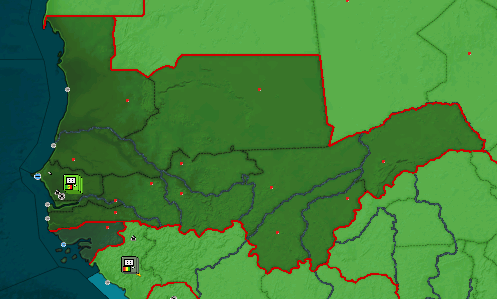
KIRKWOOD: Italy will follow France like a puppy. Spain will be trouble, not because of what they want to do but because of what they don’t want to do. They didn’t even want to be here, we had to drag them here. If we need to invade Portugal to end their colonial empire, then we need Spain to take responsibility for Portugal. But Spain doesn’t want to deal with that. They’re still too battered to want to take that on.
RANDOLPH: We can surely offer them OAS divisions if that’ll mollify them.
KIRKWOOD: Yes, Mr. Randolph, but Spain would have to deal with what is left over, remember. Smashing the enemy is the easy part.
RANDOLPH: That is true. Tell me, Mr. Kirkwood. What is your country doing in Madagascar?
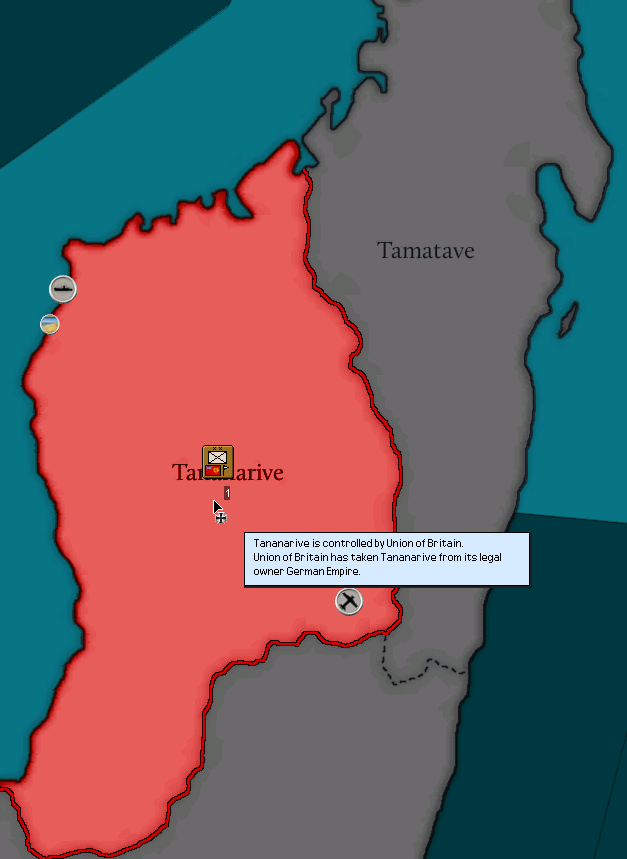
KIRKWOOD sighs.
KIRKWOOD: Would you like the official answer or my opinion?
RANDOLPH: Why not both?
KIRKWOOD: Denying the German Empire a position from which to launch counter-revolutionary operations in East Africa.
RANDOLPH: Okay, so what’s your take on it then?
KIRKWOOD: Lawrence was taken aback by how harshly the East Africans rebuked his request to invade Ireland. I think he wants Madagascar as leverage against the Union. He thinks France rules the Continent and America rules Africa, leaving Britain with nothing.
RANDOLPH: A sphere of influence, eh? Old habits die hard.
KIRKWOOD: Indeed. Mr. Randolph, I don’t really know if this is appropriate to ask, but so long as we’re in private… a lot of us back home are trying to get Lawrence to step down, but we can’t get together a strong coalition to take his place. There’s been a lot of talk in Glasgow of a separation. Would America support that?
RANDOLPH: What kind of separation?
KIRKWOOD: The end of Britain as a single country. Scotland on its own again. I don’t know what Wales wishes to do but we’d all be under the European Union. Open borders and brotherhood, all of that. But we know that you Americans didn’t care for the Irish proposal. Most people in Scotland didn’t either. We could be a friend in the European Union.
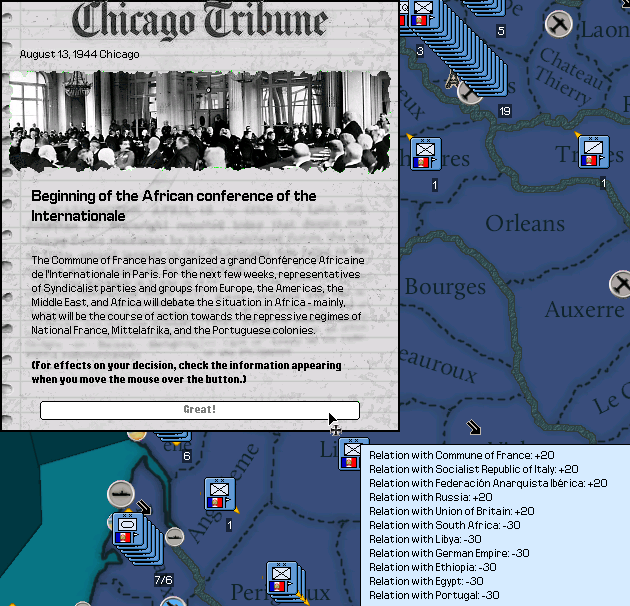
RANDOLPH: You’re asking a lot from a simple delegate, Mr. Kirkwood. I’m afraid I can’t say what my government will think. I’ll ask around though once I return from this conference.
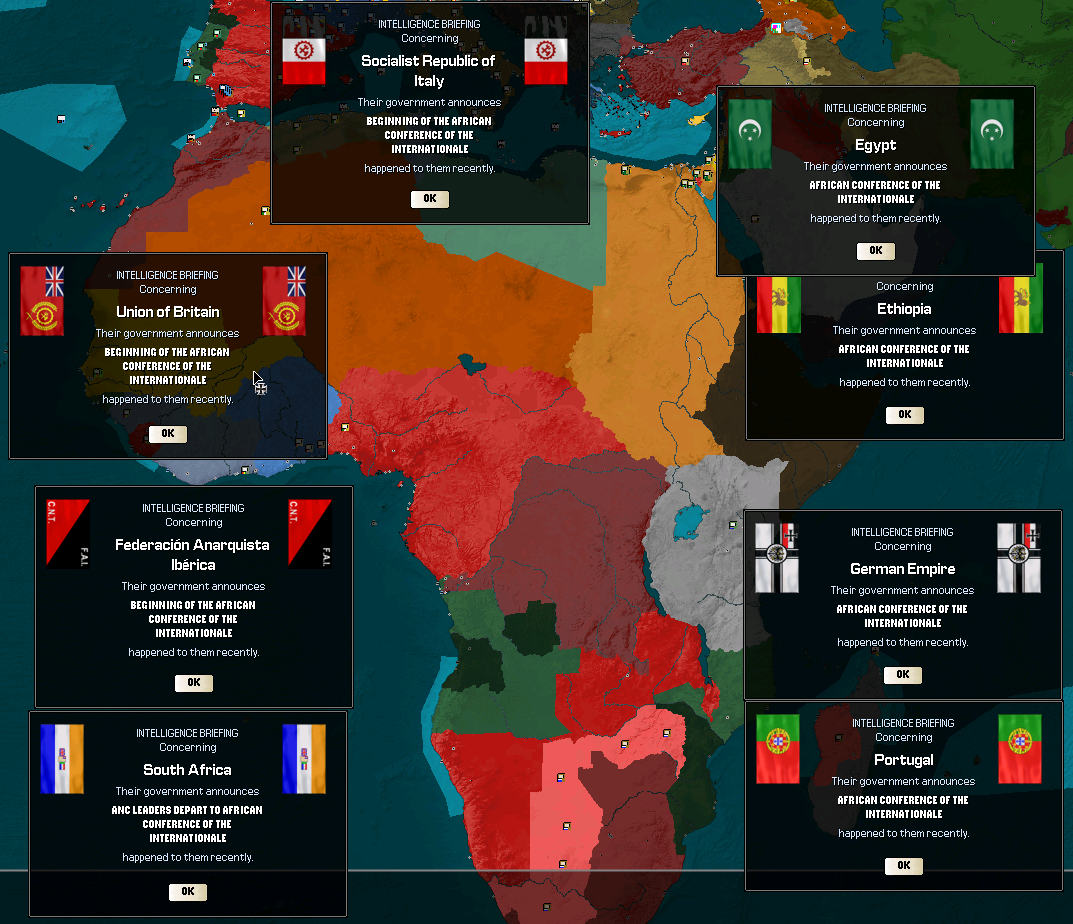
A LOUD KNOCKING
KIRKWOOD: Come in!
UNKNOWN person speaks.
UNKNOWN: Comrade Kirkwood, I’ve been looking all over for you, I need you right away.
KIRKWOOD: Ah, have the ANC leaders arrived?
UNKNOWN: Umm… no, comrade. There’s a report from London you need to see immediately.
KIRKWOOD: Ah, goddammit, what do they want now?
UNKNOWN: It’s not that… it’s…
KIRKWOOD: Mr. Randolph is a trusted friend. You can speak freely.
UNKNOWN: Everything has gone wrong.
~*~*~*~
Sandra wiped tears from her eyes. She felt as though her crying should make her embarrassed but something about this man made her feel like he probably wouldn’t mind. Or that he’d take it as a compliment. That song had just spoken directly to her soul, it felt. She couldn’t help but cry a little.
“That’s a good song, mister. The kind of song that gives me ideas.”
The man smiled a toothy smile.
“That’s the kind of song I love to write. Anyway, Sandra, it’s been a pleasure talking to you, but it’s time for me to get some sleep.”
The man stood up and slung his guitar and rifle over his shoulder, clipped his canteen to his belt, and extended his hand towards her to offer a handshake. She took it.
“I didn’t catch your name, mister.”
Before he could speak, the horizon lit up as though a thousand suns were rising at once. A few moments later, a noise split Sandra’s ears and sent her to the floor of the watch tower, which shook but remained standing. She scrambled to her feet, accidentally using the guitar player’s head for balance, and looked out towards the source of the flash. The rising sun revealed dark plumes of smoke rising from Cherbourg harbor. With the ringing in her ears fading, she could hear shouting from the camp below.
“What the hell was that?”
“I don’t know, goddammit, but we better go help! Somebody get the ambulances moving!”
Sandra took a deep breath. She didn’t want to do this, but she had signed up for it. Today she would have to see death.
-
 1
1
-
-
Chapter One: Jus Ad Bellum (Late July 1944)
Intelligence Briefing prepared for the Qing Emperor
My Dear Emperor,
The syndicalists have given us a great gift with their new “War Council” which was established at the recently concluded Chicago conference. The War Council is a body of three representatives, one each from the three Red continents: the African Union, the European Union and the Organization of American Syndicates. At least two of the three members of the War Council must approve any offensive war by any Internationale member state. The foolish Americans evidently spearheaded the development of this system in order to appease the weak African states’ demands that they have a say in matters of war. Any rational observer knows that America and France are the true powers in the socialist alliance, but they seem intent on sharing power, or at least an illusion of it, with their client states. What it does mean is that there is now ample opportunity for us to predict Internationale war plans if we can infiltrate the continental organizations. The War Council last week delivered a heavily redacted announcement that they had unanimously approved a declaration of war on a state that would remain secret for purposes of operational security.

Naturally, we endeavored to discover if China or any of our neighbors were the target of this declaration. Based on the evidence, we believe that the syndicalists intend to attack the Carlists in Spain.

The War Council is a controversial proposal and so many within the socialist alliance and without are curious to see how it will work. The Carlists, occupying territory that the Internationale regards as belonging rightfully to the F.A.I., represent the most unifying and noncontroversial choice for a “test run” of this new system. The Internationale concerns itself mainly with the opinion of its own peoples and the handful of friendly non-member states, such as the Netherlands, and the Dutch public does not hold the Carlist regime in high regard. Furthermore, the French have been accused by F.A.I. sympathizers throughout the Internationale of abandoning the F.A.I. in their initial revolt. Barcelona, the epicenter of that revolt, has almost holy status amongst many socialists, and so its liberation will undoubtedly be celebrated by many who are normally critical of Internationale foreign policy.

Our evidence for making this determination is not merely circumstantial. Wings of bombers that were due to arrive back in America from Europe never arrived, leading us to believe they were redeployed to another location in Europe.


The American battleship fleet is currently anchored in Bordeaux. An agent in the Poitou region also reported a gathering of landing craft and seeing the Revolutionary Marines manning the port. This could be preparation for an attack on Spain’s northern coast.

Sources in the French railworkers’ union have reported a large amount of heavy equipment being shipped towards the Spanish border.

It has been difficult for us to find all of the American infantry divisions with the chaos of redeployment and returns, but we do know that there are far too many in southern Spain than simple defensive purposes would justify.

The syndicalists’ victory is assured, but any changes in their conduct of war will be of interest to us. Chairman Gitlow at the Chicago conference declared an end to total war, and our spies in the American military have provided us with new manuals that suggest the military is shifting towards stricter rules of engagement with an eye towards reducing civilian casualties. We believe the hope here is to prevent angering local populations when a nation is invaded.

This drive towards the fool’s errand of a “humanitarian war” would seem to incentivize fast wars that end neatly. Overwhelming force is the ally of the Internationale in this scenario, as it would theoretically awe the enemy into submission without requiring a protracted and bloody conflict.

We can also expect the Internationale to utilize amphibious landings and mobile forces to try and end conflicts as quickly as possible by overwhelming an inferior enemy from multiple directions.


Our general staff estimates that the Internationale should be able to conquer the Carlist territory in under a month.

The Internationale’s next military goals are a mystery. France’s relationship with the Netherlands suggests that they are attempting to use diplomacy to woo non-socialist states into the orbit of the European Union rather than force, and so other than stomping out the Carlists who control territory regarded as F.A.I. territory, it does not seem as though force will be used to consolidate the Internationale’s hold on Europe. It remains to be seen what the War Council will and will not approve in the future, but the inherent flaws in the operational security of such a body will hopefully give us ample opportunity to know about their moves in time to react.
Your Loyal Servant,
Colonel Long Feng
~*~*~*~
President Quezon Casts Doubt On Internationale’s “Just War” Manila Bulletin, July 28, 1944
The Internationale’s defeat of the Carlists in six days was welcomed in America and Europe as a sign that the Internationale could carry out swift and devastating “security operations” with a minimum of loss of life. President Quezon, when asked about the operation by our own reporters today, cast doubt on optimistic claims by syndicalists that the Internationale could effectively police the globe while avoiding the horrors of past wars.
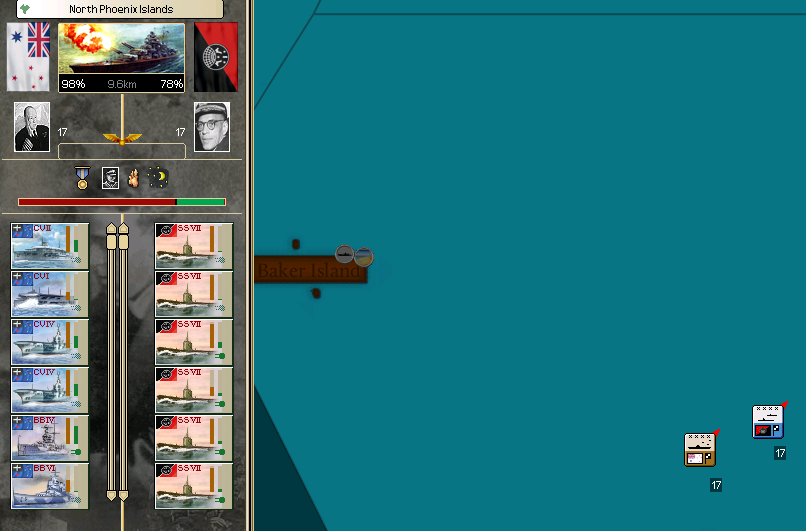
“The Americans picked their test target well with the Carlists. The population in the north of Spain was battered and exhausted and desperate for any kind of aid. It was no wonder that the Carlist state collapsed as quietly as it did. I imagine they will find further adventures much more complex. Take, for instance, Australasia.”

“The Americans can bring to bear a grand army on a neighbor of their closest ally and defeat them soundly by attacking from three separate directions. But their war with the Australasians has dragged on since 1940. What is swift and just about the naval war in the South Pacific? The Americans seek to sink every boat bringing supplies to Australasia, to starve them out and make them desperate. That seems every bit as brutal as the European war to me.”

When asked to respond to socialist leader Luis Taruc’s demand that the Philippines support the “just international cause” represented by the Internationale, President Quezon pointed out that the Internationale was happy to let its enemy Delhi fall to a Turkestani regime that he referred to as “barbaric” rather than intervene to spare the population their fate. The President clearly does not believe that the new great powers will be any better than the old.
-
Intro: The Spirit of Chicago
“The ceremony has been postponed half an hour…”
I hear the crowd groan around me. I notice a few people in the stadium seating get up to leave, but I am not going anywhere, not even if they postpone this thing another six hours. I would never dream of missing this anyway, but it’s good to be able to just sit down and do nothing for a spell.
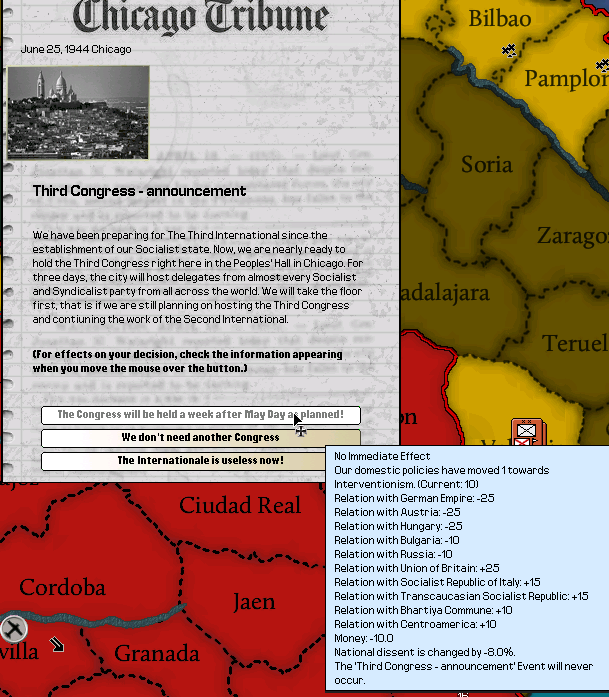
My life has been hell for a month. It was on June 25th when Chairman Gitlow made public the plans for the Third Congress in Chicago, but it was a week before then that we were told about it. All of us pages and apprentices were taken from our delegates’ offices and put to work setting up the event. And boy, it sure has been an event.
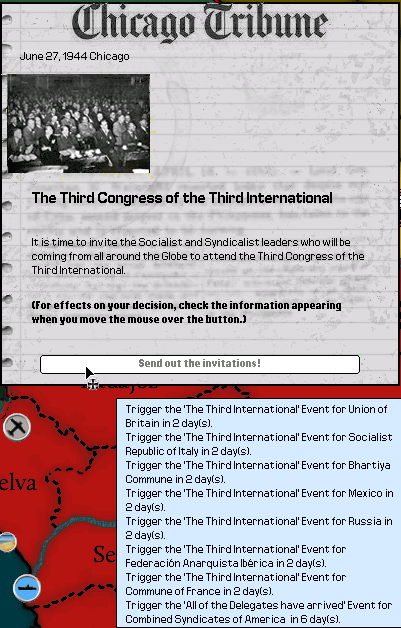

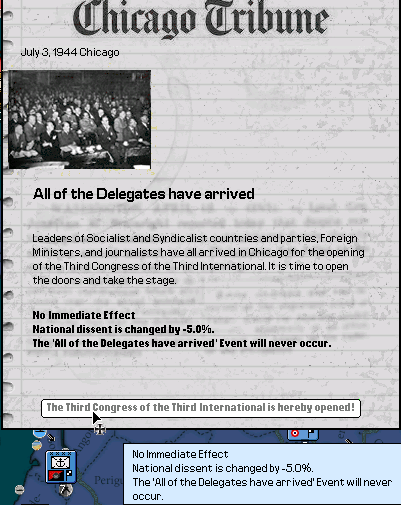
The socialist world has descended on Chicago. I’ve spent the last month doing all kinds of preparatory work, finding housing for the delegations in a city that has seen its population explode during wartime, a task that was made all the more difficult by the condition that it had to be nice housing. Unlike the apprentices, the delegations would not be satisfied with being stuffed into tenements that still had bullet holes in the walls from the wild days before the civil war, remnants of the gun battles that would erupt in the streets when the police would try to break up I.W.W. meetings.
My name is Leon Thomas Jr. and I remember that Chicago, dirty and desperate and on the verge of breaking. I am from here, although like many Americans, I am also from somewhere else. Today, I sit in the new Chicago, a rapidly growing and beautiful disaster of a city around which the world revolves, a place of no idle hands, lots of frayed minds and millions of hopeful souls. I’m in the third row of seats in front of a stage in the center of Soldier Field, amidst some of the most powerful people in the world. One year ago, I was in Claiborne County, Mississippi, helping out on the black syndicate’s soybean fields by day and trying to get a good schooling at night. Five years ago, I was in this city, with my mother and father in a tenement not much different from the one I share now with seven other apprentices. Twelve years ago, my parents sold damn near everything they owned to get us on the train to Chicago after my uncle was murdered by some white men because they thought he was out of line with a white woman. I saw it with my own eyes. I was six.
I am eighteen now, and I’m sitting next to another Chamber apprentice, my love and my steady girl, Samantha Pryor, a white woman born of the Alabama gentry. On the other side of her is my mother, who lost her brother because of a woman like Sam. The two of them are having a grand old time, talking about statues, of all things. Every day during the war, someone would wistfully talk about getting back to normal once the war was done with. Well… seven and a half years of war are done with, and yet nothing about 1944 resembles the normal of 1936. I am living proof of that.
Sitting here and reflecting on all of that? Next to my loved ones? Not having to break my back and run myself ragged trying to find enough prayer rugs for the Algerian delegation? You better believe I could sit here forever.
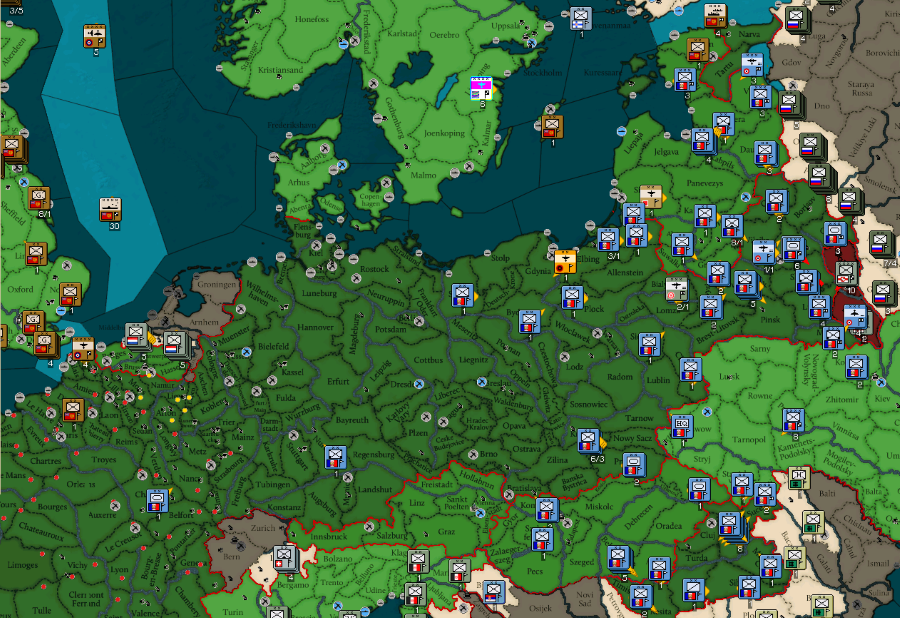
Sam hasn’t had an easy job these past three weeks either but I’d take her job over lugging furniture and painting rooms. She worked with the flag team, getting enough flags made for all the countries attending. Every attending delegation, even from the non-member states, had their flags peppered all over the city. This is what I mean when I say this is an event. It isn’t like the First or Second Congress, it’s more than just a big meeting. It’s a demonstration to the world, and especially to conquered Europe, that America is big, strong and happy to have you on our side. You can stick with us and we’ll lead you right, or you can stand in our way and get bowled over. That isn’t what we were saying explicitly of course, but a year in the Chamber has made me good with subtexts and implications and things of that nature.

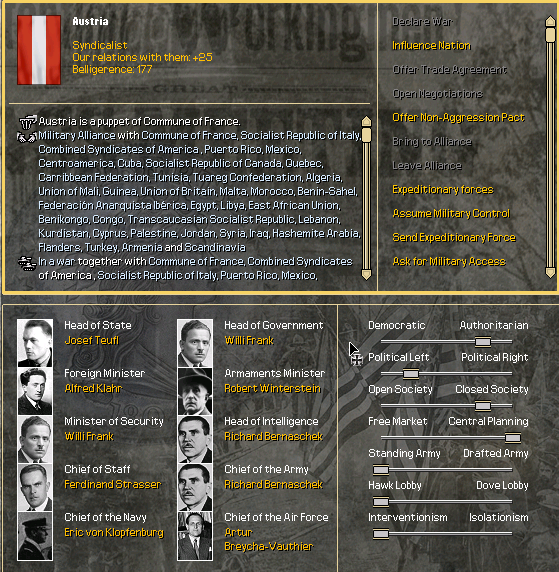
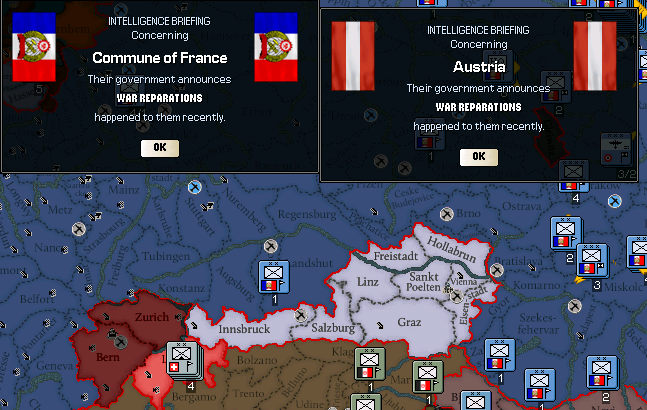
Marion, my youngest sister and twelve years younger than me, is fascinated by Chicago. She was a baby when we went back to Mississippi, so this is an overwhelming spectacle in her young eyes.
“Miss Samantha, what are all those flags for?”
“They’re for all kinds of different countries all over the world!”
“Which one is that for?” Marion says, pointing to a red and white flag.
“Hush now, Marion, don’t bother Miss Samantha.”
“Oh no, Mrs. Thomas, she’s fine.”
Sam picks Marion up and sets her on her lap.
“That one is for Austria. There’s lots of big tall mountains there!”
My mother glances at me with a wry smile. She tried like the devil to get me hooked up with her friend’s daughter down South and she’s too stubborn to admit that I’m my own man now, but I can sense that she approves of Sam, even if she won’t say so yet.

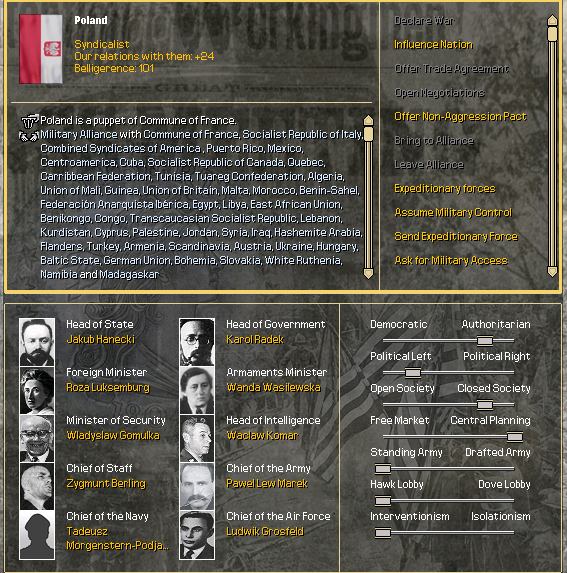
As we wait for the ceremony to begin, Sam tells Marion about Poland.
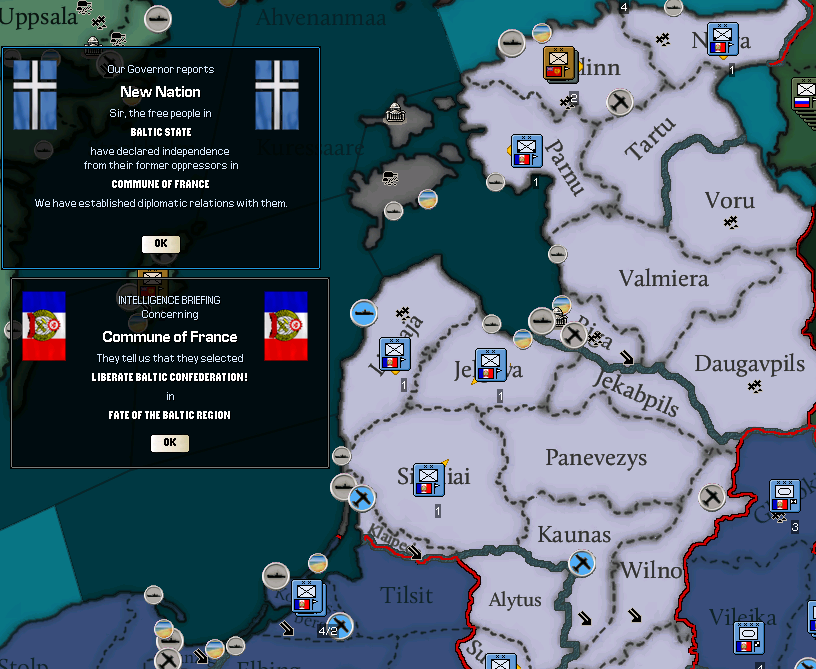
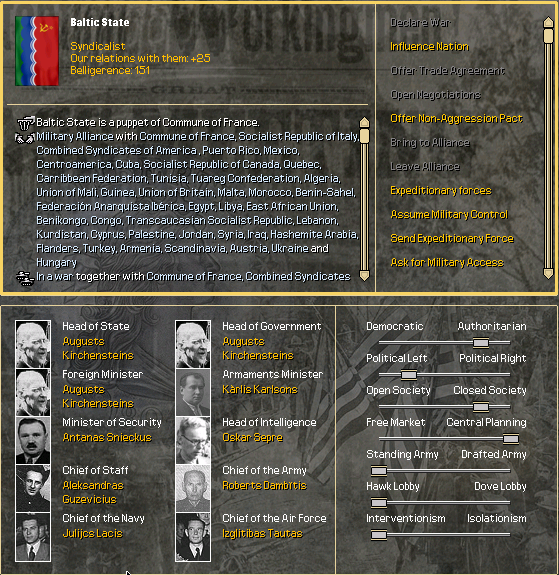
And then the Baltic State.
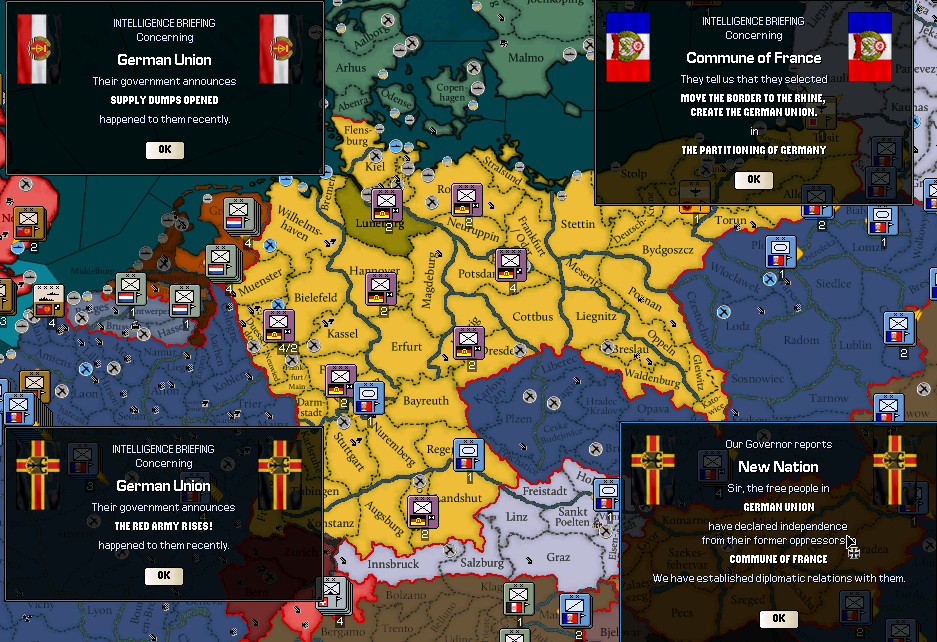
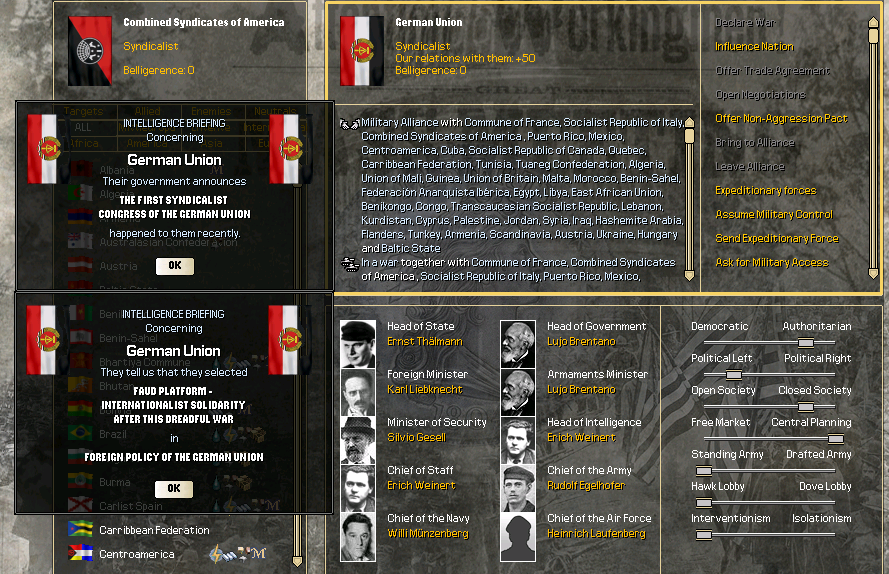
“Germany!”
“Ain’t Germany the bad guys?”
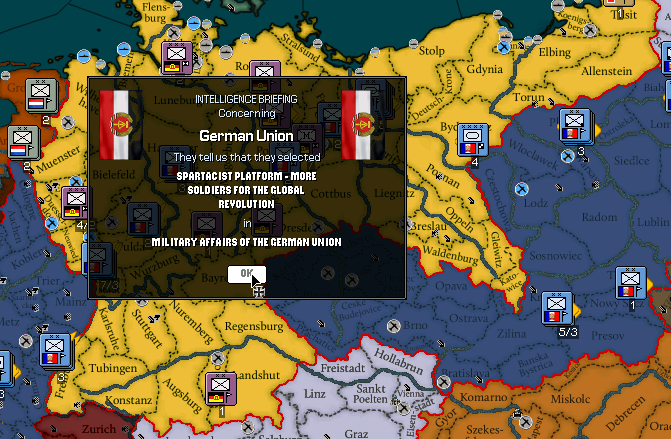
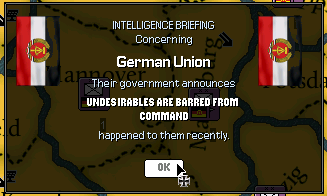
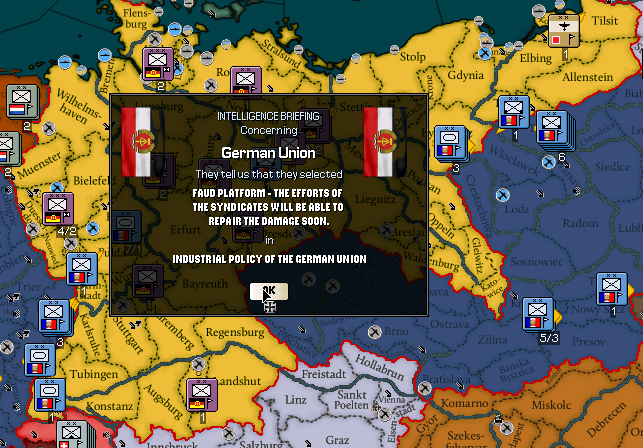
“No, that was just the Kaiser, but he’s gone now. The German people are our friends.”
Marion nods understandingly. Sam would make a good teacher.
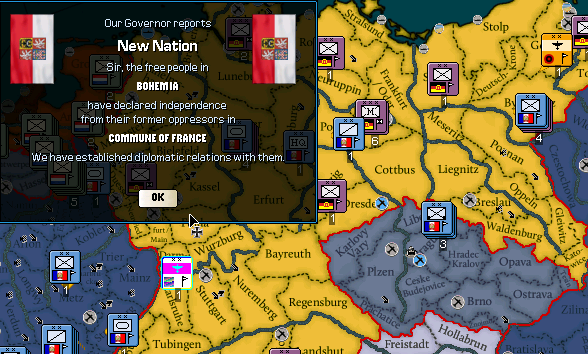


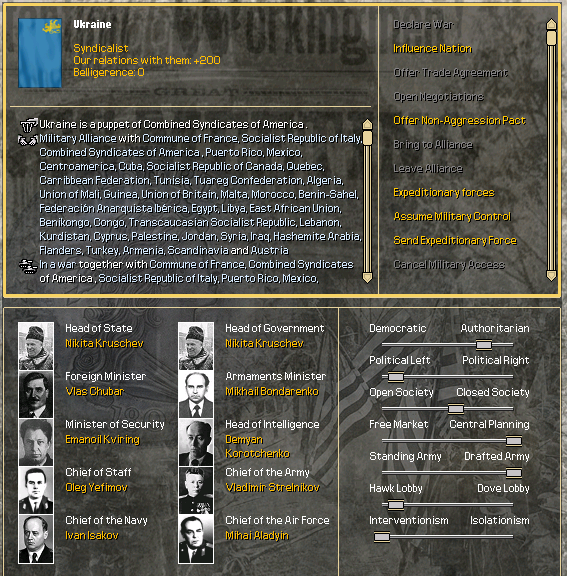
I chuckle at few of the nations mentioned, remembering Sam complaining about her vexillological struggles. It was hard for her to get proper flags made when the nations they represented were a few weeks old and couldn’t decide on what flag they wanted.
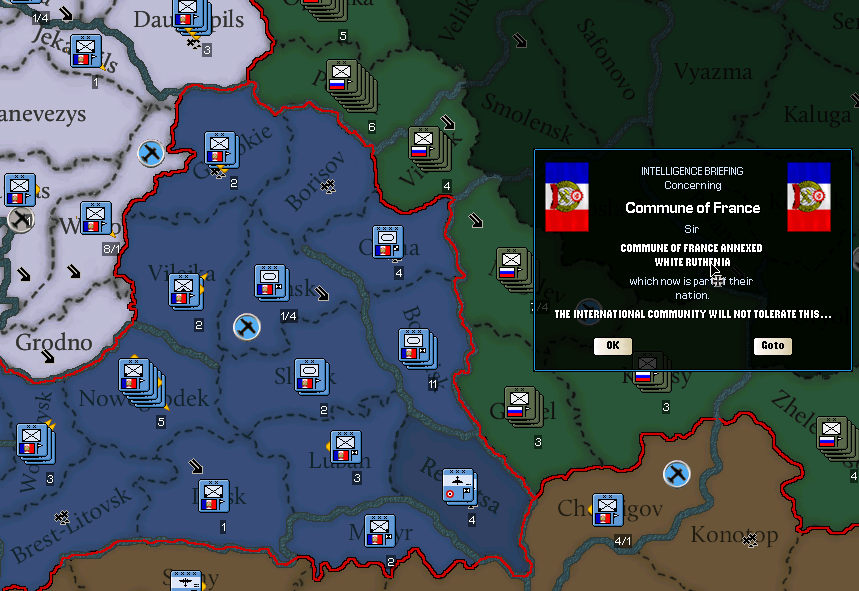
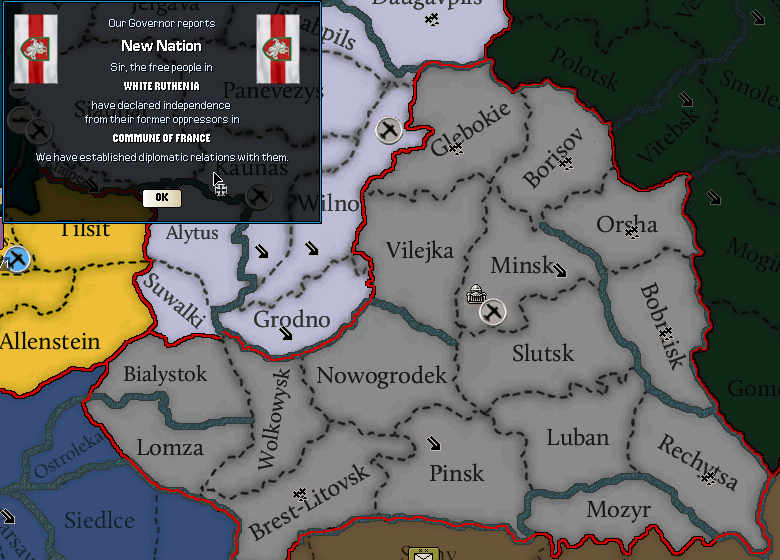
I continue to follow along and I’m impressed by her new encyclopedic knowledge of flags.
“That’s White Ruthenia.”
“White like you, Miss Samantha?”
“MARION!”
My mother’s volume turns heads three rows ahead and behind us. Sam and I can’t help but laugh. Sam’s white skin has been an unspoken matter since my parents met Sam for the first time yesterday. Too polite on both ends for all of that. And there’s something about this city at this time where it just seems foolish to worry about it. If you make a fuss at a white and black person being together, somebody is bound to chastise you for worrying about bigoted nonsense with a war going on. Sam and I are friends with two homosexual boys, even.
My mother would fall down dead if she knew that, but the cosmopolitan permissiveness of central Chicago and its political class seems to get to everybody in our world eventually. We don’t get into the drugs or nothing, but it’s one of those things: you don’t worry yourself about what we’re doing, and we won’t worry ourselves about what you’re doing. Don’t get me wrong, I know there’s lots of racists we’ll have to deal with down the road, but… that’s down the road. Today, I’m happy.

It’s been good to talk to my parents, to get a feel for what’s going on outside Chicago. People are happy that we won the war, they’re hopeful about what’ll come next.

Sam is still worried about the eternal war thing that Delegate Perkins got her on about. It’s true that Australasia is still at war with us, but it’s not like they can hurt anybody anymore.
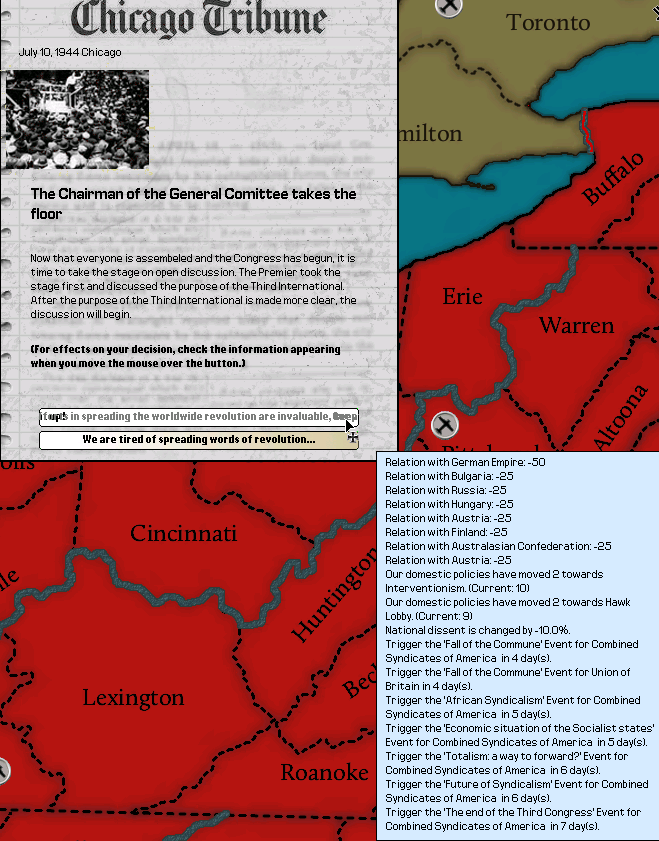
And Chairman Gitlow did make it sound like there was more fighting to do, but that’s the way socialists talk. Struggle this and that, it doesn’t mean shooting necessarily.
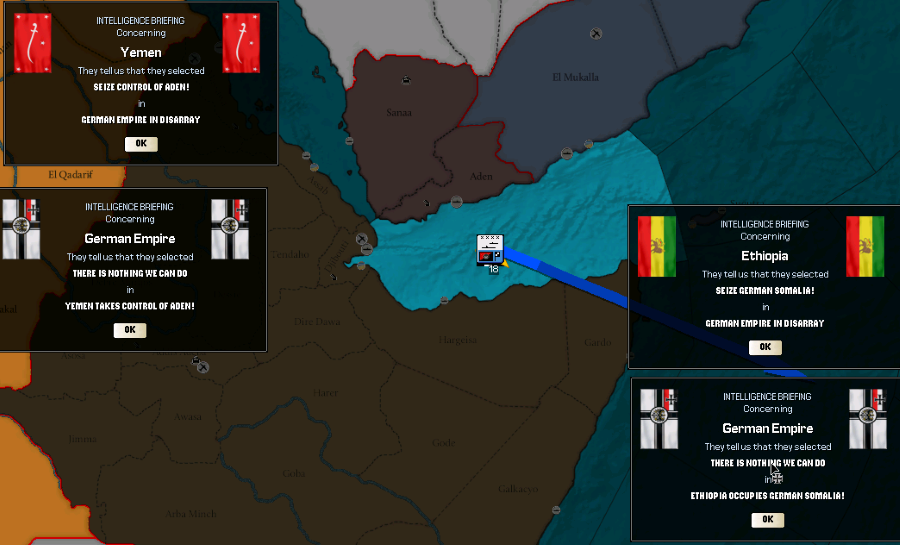
The Imperial Germans are still hanging on in the colonies, yes, but it is not unreasonable to think that local powers will start leaping for the scraps of the beaten Empire. Who better to liberate these colonies than the colonized people themselves, after all?
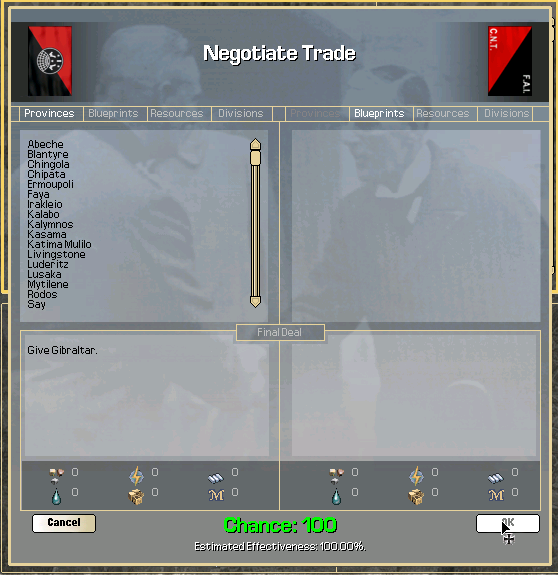
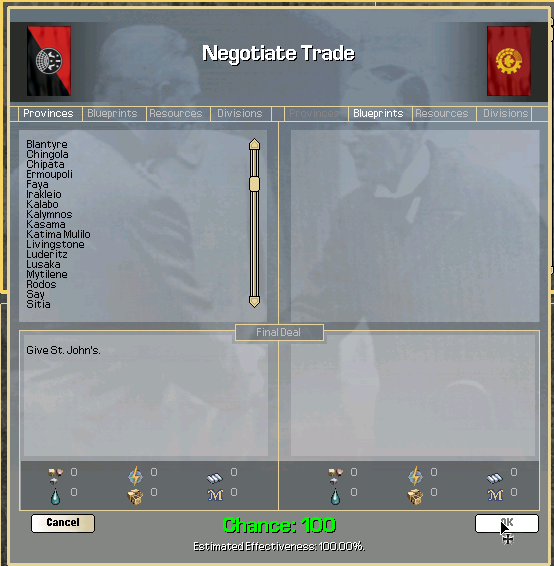
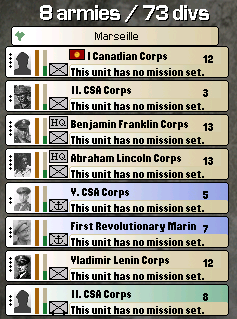
The troops are coming home, and we’re giving those bases we borrowed back, so I feel pretty confident the warring is just about over. I’m not any great history student but I know enough, and I just feel it in my bones that this is different. Peace is really coming.
A quieting of the crowd gets my attention and I look up to the stage to see Louise Bryant slowly walking to the microphone. She doesn’t look well. Word is that she has some kind of rare disease. The entire stadium rises to their feet and I rise with them to applaud the widow of dearly departed Chairman Reed.
Her voice, its shakiness masking the conviction of her old warrior’s soul, rang out across the stadium through the PA system.
“I apologize for keeping you all waiting, but I lost track of the time. There were some interesting resolutions just passed in the Congress.”
She waves her arm to the northwest towards the towering Hall of the People near Haymarket Square, visible from some of the seats. The building that I worked in for a year as an apprentice is now filled with the delegations of the Congress, hammering out what the post-war world will look like.
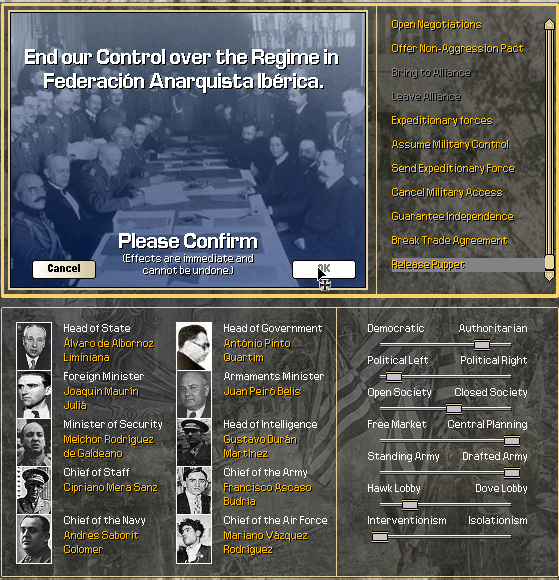
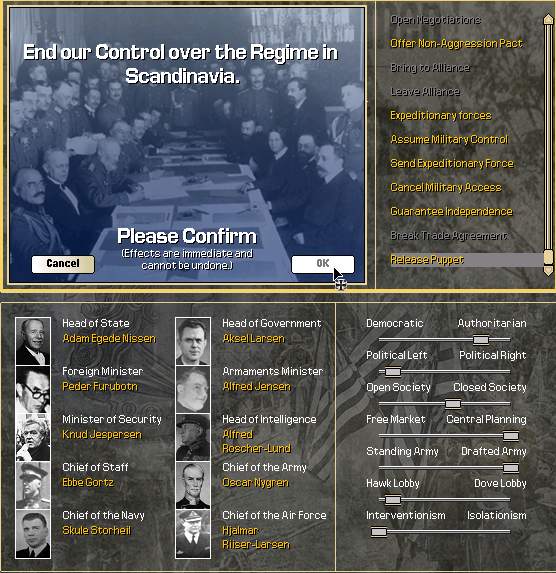
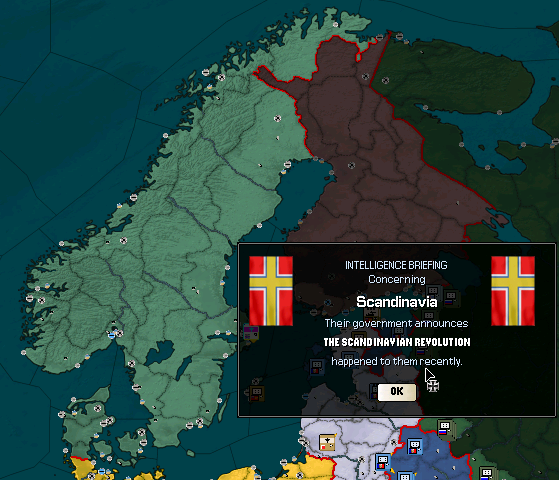
“I’m happy to announce that Iberia and Scandinavia have been admitted as full members.”
The crowd reacts with polite applause.
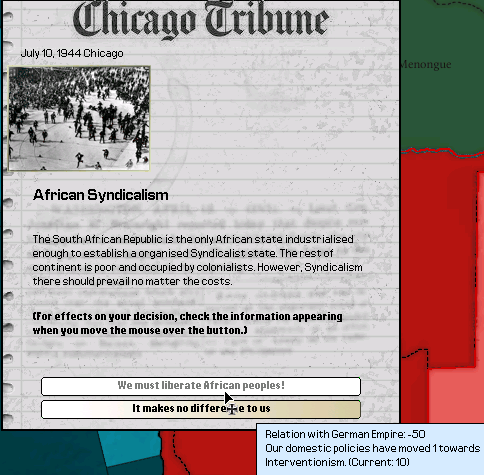
“And I am also happy to announce that the Congress has agreed to commit fully to the liberation of the entire African continent.”
My mother claps more enthusiastically than I would have expected her to, and Marion and I follow her lead. I can hear sporadic cheering and hollering out in the crowd.
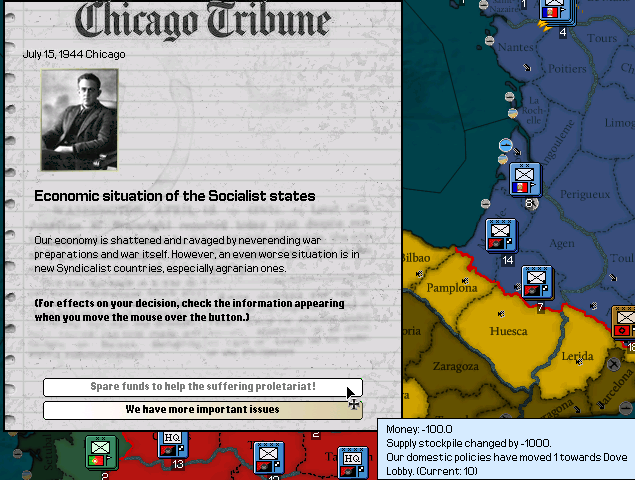
“The other resolutions passed today are that the Combined Syndicates will use its industrial and agricultural resources to help rebuild Europe!”
Polite applause. There’s a handful of jeers to be heard. Everyone knows that this means the long wartime hours and rationing aren’t going away as quickly as most Americans would like them to.
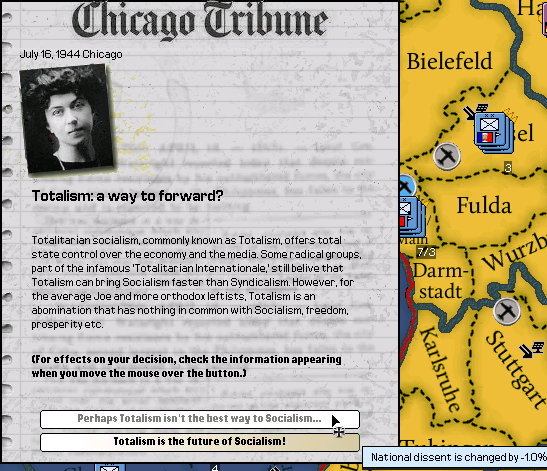
“And the final resolution, introduced by our own Carlo Tresca, is a denunciation of Totalism and a commitm-”
The crowd roars, so loudly that it makes Louise cut off mid-word. My mother applauds even more intensely for this. I’m taken aback. I know that people don’t care for the idea, but I really underestimated just how unpopular the tendency had become.
Ms. Bryant clears her throat to quiet the crowd and continues.
“A commitment to the fundamental rights of individuals. And now, finally, I can present to you our honored guests.”
Behind her are twenty seats. The sixth one contains my father. He is beaming like a fool and looking at us. He has his Silver Star and Purple Heart pinned to his chest. My mother waves subtly at him, trying not to draw any attention to us. I give him a nod, as it seems like something one man does to another he respects.
The twenty people on stage are twenty featured recipients of medals, one for each medal. The massive crowd is certainly here to hear the words of the famous war heroes, but they also get to sit through the speeches of the people who received medals for excellence on the home front. That’s what I’m here for.
After five speeches, Ms. Bryant walks to the podium and says: “Mister Leon Thomas Senior, of Port Gibson, Mississippi: recipient of the Order of Architects of the Revolution, First Class. He is honored for his ingenuity and dedication in founding one of the most productive agricultural syndicates in all of North America. His work fills the bellies of our soldiers overseas, and he provides a shining example for all workers across the world.”
My father stands and limps to the podium. Ms. Bryant, with shaking hands, pins a medal to his chest next to the other two. I can’t see it very well, but I can make out a star. The crowd is applauding, not just politely but with genuine enthusiasm. My mother is wiping tears from her eyes. I am not as emotional as I probably ought to be, which is slightly confusing.
My father shakes Ms. Bryant’s hand and steps up to the microphone. What follows is the surreal experience of hearing my father’s voice broadcast to tens of thousands of people:
“Like Ms. Bryant says, I am from Mississippi. But I am also from Chicago. I had to leave my home for this city because I was afraid the Klan would kill my baby boy, who is now such a grown man sitting with us today, a man I am so proud of.”
The crowd boos and jeers at the mention of the Klan. Sam squeezes my hand. I feel a tear form.
“Chicago was home to us, but the Abraham Lincoln Corps promised me and many other migrant folk up this way an opportunity to return to our first home, to take back what we were forced to leave. So I went, a Union State sniper got me in the leg, and then we won.”
I smile at that line, and the crowd cheers at its simple triumphalism.
“So when the civil war was over, and all the mean folk who terrorized us way back when were gone or dead, I sent my wife Minnie, who is also with us today, a telegram. It said, we got our home back, but it doesn’t feel like home without you.”
The crowd loves my father. I know that he’s a good politician and motivator down on the farm in Mississippi, but I didn’t think he could get Soldier Field going like this.
“My grandfather was a slave. My father was a sharecropper. My whole line has toiled in the service of some rich landowner who didn’t give a care on this Earth about us. So, when my family came back to Mississippi, I made a promise. My father and his father and his father worked themselves to death and went without while some other man got rich off of their toil, but Lord, I promised that my children and their children will never toil for some other man’s profit again, and they will never do without unless every other man, white or black, in this whole country is doing without.”
This quintessentially proletarian sentiment gets a louder reaction than anything else so far. He gingerly rotates on his bad leg and gestures to a few of the other medal recipients in military uniforms.
“God bless these heroes here who fought to keep us all safe. They put themselves in danger for us, and I thank God for them every day, because without them, none of us would be here now.”
I can barely hear my mother over the cheering.
“Lord, he is a politician, isn’t he?”
He definitely is. He’s giving the same routine to Soldier Field that he would give in the church during the syndicate meetings. His oratory experience is evident in how he waits for the crowd to die down just enough before he continues.
“They fought for what they loved, to provide a future for all of us. And now that the fighting is dying down, I see and hear a lot of people grumbling that they missed their shot to be a big hero. That is a lie! Everyone has a chance to be a hero. You do not have to fight to be a hero. You can be a hero because you build the society that these men and women behind me fight to protect!”
He looks directly at me.
“Thank you.”
He limps back to his seat.
Fourteen honorees later, the ceremony is over. My mother is off with Marion to talk with Delegate Jefferson who arrived to meet my father. Sam and I are sitting off by ourselves, watching the colors of the sunset.
“Leon, is something wrong?”
I have half a mind to say no, but she and I both know she is onto something.
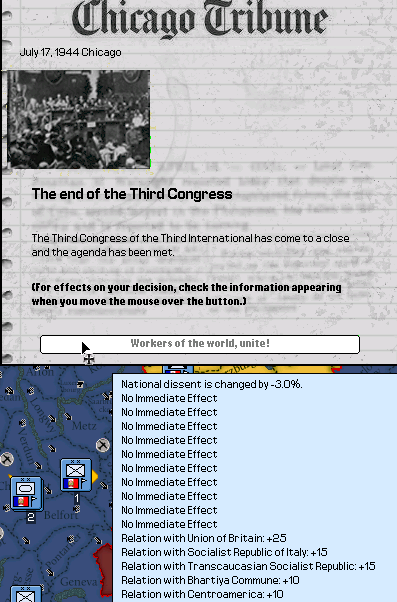
“What’re we gonna do when our apprenticeships are up, Sam?”
Silence. We’ve avoided this topic so far.
“I don’t know, Leon. I… and don’t be mad at me but… I don’t want to go to Mississippi.”
She is smart enough to know that my father was speaking to me specifically in his speech. He wants me to go to Mississippi and learn to take over for him. I didn’t feel at home in Mississippi to begin with when we went back. My strongest memory from the first time there was seeing my uncle die. My father is building something beautiful in Mississippi, but I’ve wondered if going back after this apprenticeship is the right thing to do. The fact that the woman I love is the child of the kind of people we had to throw out to make it possible, it’s just so awkward. So, I make a decision, right there in that folding chair in Soldier Field.
“I don’t either, Sam.”
She looks up at me, clearly surprised.
“So where do you want to go?”
“I don’t know. But I don’t want it to be Mississippi. And I want to be with you. And… I want to be somewhere where I can do something…”
I can’t figure out the right word for what I mean.
“Important… Not that the farms aren’t important but… you know.”
She does know. She has been in Chicago too. She’s had the same taste of being this close to the center of gravity, the center of power. She doesn’t want to leave either. Unfortunately, we don’t have any other syndicates to go to besides the ones we belong to. We could join up with one, but the fact is that with our experience, we’d be doing something just as unappealing to us as farming soybeans in Mississippi or counting fish hauls in Washington. We’d start from the bottom. Perhaps it is arrogant of us to expect any different, but we want something else anyway.
“We could join the Army, Sam. We have good connections, we could get an interesting post together, like Intelligence or Information or something. See the world and meet people and give us some time to figure out where we want to end up.”
She doesn’t say anything, but she doesn’t need to for me to sense the reluctance.
“Sam… I know you don’t trust the military but… the war is over. We won’t have to get shot at or nothing. I just… don’t want to go back to being normal, Sam.”
She smiles.
“Me neither. It’s not a bad idea. I’m just afraid.”
“Of what?”
She is silent for a few seconds before speaking again.
“He shall judge among the nations, and shall rebuke many people: and they shall beat their swords into ploughshares, and their spears into pruning hooks: nation shall not lift up sword against nation, neither shall they learn war any more.”
“Scripture, Sam?”
“The military is designed to kill people, Leon, and some of the people have to die. Maybe you’re right that they won’t have to.”
“But?”

“I doubt it.”
-
Postscript Two: Nothing Was Learned and No One Was Happy (1947-1949)

The Second Russo-Japanese War began in the dead of winter, a time that was not conducive to offensives from either direction, but nevertheless the first month of the war saw some minor gains for the Russians in Manchuria.

A strength of the Japanese army was its strong cavalry contingent which was able to make progress through the Gobi desert.

In Europe, a numerically large but inexperienced army comprised of new recruits from the “new Europe” of Japanese puppet states attempted to push back the Russians but stalled almost immediately in the winter conditions.

Estonia fell within six weeks.

Mongolia fell to Japan next.

Burmese troops entered Lhasa in February and toppled the Russian puppet state.

Japanese puppet state Laos fell to Russian incursion from Yunnan.

And finishing up the flurry of early annexations, Russia entered Riga and sent the nascent Latvian government into exile.

Russia would push back and re-establish their puppet in Tibet about three weeks after Burma put an end to it.

In the midst of the chaotic back and forth, Japan was securing an advantage. They had cut the Trans-Siberian Railroad and, true to Sakai’s doctrine, had separated European from Asian Russia, though the size of the “pockets” were ten or a thousandfold larger than the pockets the Japanese army was used to dealing with.

Japan, eager to prove to its Asian client states that it was a dependable master, landed several divisions to save Vietnam from Russian annexation.

Russian pan-nationalists in Transamur would betray the Japanese and surrender the state to Russia, though Japan still held Vladivostok.

In general, Manchuria was holding.

The push into Siberia had overextended however, stranding some Japanese troops hundreds of miles from support.

In the west, another operation was underway where the European army was trying to outflank the Russian army in Europe by way of Kuybyshev.


In the east, the Japanese tried to shore up the link between its enormous salient in Siberia and China, but failed to prevent Russia from cutting off a large pocket of Entente forces.

As summer rolled along, more rapid maneuvers were attempted, and the Russians were able to cut off four European divisions, and put many more at serious risk along the Volga.

The Japanese response was a major landing in Okhotsk, all the way on the Pacific Coast. The idea was a classic Japanese one, open a new front so that enemy forces would divert and relieve pressure across all fronts. However, the infrastructure in Far Eastern Russia was so bad that it wasn’t all that likely that the forces that landed there would have much chance to run wild.

They certainly would not have any effect in time to cause the Russians to give up the potential of a major encirclement of over forty European divisions.

The four divisions originally encircled on the eastern bank of the Volga were destroyed, but the large European force that captured Tsaritsyn dug in and waited for rescue, confident that the Russians did not have enough forces to flush them out. Meanwhile, the European army was beginning to gain traction and pull off encirclements in Ukraine.

Vladivostok fell in early August.

The Entente’s advantage came in sheer numbers and its weakness came in confusing international logistics systems and allied squabbles. No fewer than eight nations were trapped in Tsaritsyn, meaning that the encirclement was not just a tactical problem but a diplomatic one too.

Just as in China, the Italians attempted an ill-fated amphibious operation.

And the Russians successfully corner nine divisions in Courland.

By the end of summer, the momentum was decidedly in favor of the Japanese, who had created a much more stable link between China and their Siberian salient. They were expanding the front and the Russians did not have enough men or logistical capability to manage the enormous front that stretched from Vietnam to the middle of Siberia and all the way around to Manchuria.

Despite losing the smaller pocket, the larger pocket managed to reconnect with Ukraine proper, allowing the divisions around Tsaritsyn to escape. Once again, the prime Entente directive was to avoid catastrophes that would put the alliance at risk. Massive European casualties in a war that many Europeans saw as necessary was one of those catastrophes.

Russian hopes in Europe hinged on the capture of Grodno, a critical link between Europe and Ukraine, especially as neutral Poland would not allow the Entente to use its territory.

I was curious to see if there was an event like the one in the Mongolia game that would cause all of Fengtien to be annexed by whoever took Harbin. It would have been interesting to see what would have happened but alas, it did not happen.


Another winter approached and the Entente was making progress, but they would not be able to comprehensively defeat the Russians before it set in.

And so, the two sides agreed on a peace. I am now breaking character because this peace makes absolutely no sense and it absolutely sucks.

Russia gained Transamur, Estonia, Latvia and Laos and lost Mongolia, Tannu Tuva, the territory that would have linked them to Transamur (but not the tip of Kamchatka) and a hideous chunk of Central China. I absolutely hate this but if I let the AI roll on they probably won’t fight again, so fuck it, it’s over.

The nations that took the worst beatings were:
France: fought in two enormous wars and had their entire army destroyed.
Russia: apparently had a rough go of it against Japan as that was their only war against a major power.
Republic of China: bled heavily against the French and then was killed by the Japanese.
German Empire: Completely destroyed by France and Japan
Japan: Fought and won a zillion wars all over the world.
Qing: When you combine this figure with the Republic of China figure you see that China probably got the worst of it in this timeline.
USA: Lost the civil war and then provided a lot of infantry for Entente wars, including these last ones against China and Russia.
Britain: Lost half their army in Canadian adventures multiple times.
Ukraine: Actually, Ukraine may have gotten it worse than China because they were invaded by France, then invaded by the Entente and then had to fight Russia.

This is what exists of the Asian Entente. I hate it.

The big sprawling mess of Japanese puppets in Europe and Africa isn’t very satisfying either, especially since Japan lost Latvia and Estonia and the UK is gone.

North America is one big Canadian mess, except that the PSA is independent. Canada controls the USA as a puppet and never released Mexico.

India are surely the good guys now that the Entente has turned to evil and they are nationalizing things and trying to develop the Middle East.

Russia still survives with their far-right bullshit but with the most hideous borders.

I actually like the National France borders and that they occupied Corsica kind of as a fuck you to Japan for keeping the mainland from them.

The UK has the right idea, to hell with this bad Entente.

La Plata is a bona fide regional power but they somehow managed to lose a war against Chile.

There seem to be four great land powers in this order: Canada/USA, Japan/Fengtien, Russia and India.

The UK wants you to know that if you come near Britain with a ship there will be a thousand bombers coming to sink your shit. The weird country foci here are interesting, like India’s tactical fleet, USA’s CAS fleet, and the Czechs having the biggest force of interceptor planes in the world.

Somehow, Japan has zero carriers. I looked at the sunk ships list and there are all the carriers but nobody is listing as having sunk them (except the few that the British took down). I’m sure that means something but I don’t know what it is. The North Americans and British are the only true naval powers in the world.

Japan and Russia lead the killboards.

In terms of naval kills, the Japanese sinking the British carrier fleet puts them at the top, but France somehow got 7 as well. Italy getting two is surprising as well.

So in the end, the Entente is victorious but it won a dirty rotten victory that should leave nobody happy, but fortunately for all of us…
THIS IS THE END. THE COMBINED SYNDICATES WILL BE BACK SOON!
-
Chapter Twenty Eight: The End of History
Samantha’s boss was walking at a brisker pace than usual, all but bounding up the steps into the Hall. It was making her life difficult. She tried to keep up without breaking into an unseemly run, but she ultimately had no other choice. Delegate Jessie Perkins was a full eight inches taller than Samantha, who wasn’t that short for a seventeen-year-old girl. Her height and distinctive features made her a well-known delegate in the Chamber. In any photo of the mass of delegates sitting in the Hall, Ms. Perkins stood out immediately and even if many in the country knew nothing of her work as the Chamber representative of both the Washington State Fisherman’s Syndicate and the Makah tribe, plenty knew her face. Her height also meant that a brisk walk for her was a jog for most men and nearly all women.
Ms. Perkins must have noticed that Samantha’s yes ma’ams were getting fainter and more winded, and finally she looked back to find that she had left her young apprentice behind again. Samantha always felt embarrassed when this kind of thing happened, but Ms. Perkins never once was disapproving of her. Other delegates would snap at their apprentices for not keeping up with them as they zipped to and fro around the capital.
“I apologize, Ms. Pryor, I always forget how quickly I move. I’m just eager to get into the Chamber before the Chairman does.”
Ever since she had brought her here, she had called Samantha by her last name, as though she was a peer and an adult. Samantha supposed she was close enough to being an adult, but by no means did she consider herself Ms. Perkins’ peer.
“It’s not that I mind the jog, Ms. Perkins, but I just would not want to get all sweaty in my nice clothes. Not on an important day like this, anyway.”
“You wouldn’t want to mess up your makeup and have that handsome apprentice of Mr. Jefferson’s see you.”
Samantha went as red as half of the banners hanging above the grand entrance into the Hall. Ms. Perkins laughed and continued.
“I’m very observant, Ms. Pryor, and I do notice what you’re up to, and especially those eyes you’ve been making at that young man.”
Samantha drew a deep breath. Ms. Perkins was more than a mentor to her. She was also something of a cross between an elder sister and a surrogate mother. Samantha’s mother was dead. The last time Samantha saw her, she was waving her goodbye on the platform as her train departed Birmingham. That was one week before the Revolution began. Samantha’s parents were not the best parents, and Samantha had very few good memories of her father. A polite way to put it would be to say that he was cold towards Samantha. Samantha had been a difficult birth, and the ordeal rendered her mother unable to bear further children, leaving Mr. Pryor a bitter man with no sons. Her mother tried sometimes to be nurturing, but she certainly resented Samantha for ruining what had been a socially advantageous marriage for her. She had done right by Samantha in the end, however, by sending her to Seattle to live with a relative, far away, at least initially, from the horrors of civil war. She had only been nine then.
Mr. Pryor joined the Union State military as an officer and been killed in the battle for Knoxville. Mrs. Pryor died shortly thereafter, the kindly description of it being a broken heart, but Samantha figured it was more the stress of knowing that her sole skill (navigating Southern high society) would be completely obsolete once the syndicalists took over the estate. Whatever had happened, it meant that Samantha was an orphan at ten. Her shoestring relative in Seattle, a second cousin thrice removed or something of that nature, paid Samantha little mind. She provided her with a clean bed and three hot meals a day, asked her to perform a reasonable slate of chores, and then basically allowed her to do whatever she wanted. She would spend the hours between school and dinner roaming the streets. She enjoyed climbing, and she would often sneak into the dockyards to try and find the finest views of Puget Sound and the city. The dockworkers who would find her and throw her out found her annoying at first, but they grew to appreciate her wittiness and Southern manners, an oddity amongst that crowd of Northwestern male proletarians.
When the Great North American War broke out, her guardian had told her that there were funds left in her care to send Samantha to Australasia, even further from the socialists. Samantha had grown to love her new city, and she refused to go, running away in the middle of the night and seeking shelter amidst her new friends in the docks. She was put to work cleaning up the offices, and the socialist tendencies of the dockworkers rubbed off on her over time. She had faint memories of the way Mr. Pryor would speak about the Negroes in Alabama, but whites, blacks and even some Asians worked side by side on the docks. It was not what seventy-year-old Samantha would call racial harmony in retrospect, but it was a far cry from her limited experience with pre-revolutionary Jim Crow. When the Revolutionary Marines arrived in Seattle, Samantha, a thirteen-year-old by this time, was among the dockworkers who stood on the docks and cheered their arrival.
After the red and black began to fly over Seattle, Samantha continued working the docks in the hours after she would attend the reopened schools. She met Ms. Perkins when a conference was held at the dock office between the region’s Native American tribes with fishing rights and the newly syndicalized commercial fishing ventures in order to unite their operations into one big fishing operation for the state of Washington, of which Ms. Perkins was elected the inaugural delegate. Ms. Perkins was intrigued to see a young girl with a southern accent so deeply embedded into the fabric of a heretofore male industry in Seattle and she took it upon herself to reach out to the teen.
Samantha was happy to have a woman in her life again, let alone one that she could look up to. The men on the docks were the closest thing to family she had, and she loved them, but there were certain things she could not learn from them. And so, she attached herself to Ms. Perkins whenever she was in town, drawn to her femininity and strength. Samantha’s mother had been raised and primed to marry one of the landed gentry and provide him with many children, and when fate interfered with that purpose, she was so lost and distraught that her depression spiraled into despair and ultimately a premature death. Samantha had rejected femininity, believing that the life of a tomboy on the docks would spare her the fate of her mother, that emulating the dockworkers would make her strong and independent, but she felt like an outcast, mocked by girls her age and ignored by the boys.
Ms. Perkins was graceful, intelligent, beautiful and passionate, and Samantha longed to be more like her. Her opportunity came when General Secretary Tresca required every delegate to bring an apprentice between the age of 16 and 18, and more importantly, provided the resources for young adults from all over the nation to be transported to and boarded in Chicago. There had been young folks working in the Chamber since its beginning, but they had always been from Chicago or the surrounding area. A Proletarian article about the youths had caused a minor uproar that a class of professional politicians were being trained in Chicago that would lead to an unhealthy concentration of power in the capital, and the program was Tresca’s response.
Ms. Perkins had shown up at the birthday party the staff at the dock office had thrown for Samantha and handed her a small box that contained the letter from Chicago saying she had been approved for apprenticeship. There had been a few favors that had to be called in given the allegiance and rank of Mr. Pryor, but Ms. Perkins had gotten it done. Going above and beyond what was already the nicest thing anybody had ever done for Samantha, she had told the people around the office about her plan, and they had all gotten her everything she needed to stride the halls of power as an appropriate apprentice for the confident Ms. Perkins: a stylish wardrobe, fine pens for all the important work she’d be doing, a leather bound diary in which to record her experiences with the most important people on the continent, and so much more. After the end of the party, Samantha had gone to her makeshift room in the unused office next to the broom closet and wept. She literally had not been able to process the level of love and kindness shown to her that day. She had no experience with it.

As the two strode through the foyer towards the Chamber itself, Samantha had to laugh to herself about how different she was from that overwhelmed girl of just nine months prior. That girl had been blown away by the scale of the government apparatus in Chicago, so much more grand than the humble syndicate office that was her home in Seattle. When she first came here last October, she had almost knocked into Norman Thomas because she was too busy gawking at all the banners hanging around the foyer. They were flags from the Syndicate Guards that had fought in the civil war, part of a reliquary of the revolution. Abraham Lincoln’s profile over the red and black, a French flag with the profile of Benjamin Franklin in the center, so on and so forth. She knew nothing of Paris, but she knew that this very building was at least the center of the Western Hemisphere. She hoped to make it to Paris one day in order to see if it was grander than Chicago. Her initial wonder had been quickly swept away by the stress and tension that hung over wartime Chicago like a fog. Except for Ms. Perkins, nearly every delegate seemed far too busy to be bothered with her. The war was beginning to turn in the Syndintern’s favor at that point, but it was still up in the air, and the delegates lived in constant apprehension that the next report from the front would be that of a disaster. In that environment, the apprentices were more an unwelcome distraction to most of the delegates. The eighty hour workweeks left little room for mentoring kids, after all.


She also had to tackle the challenges of coming into a brand new social world. She had the style and the manners to impress the hundreds of her age group now present in Chicago, but she ended up somewhat of an outcast in Chicago as well. She had been an outcast due to the contempt of her peers in Seattle, but here it was due to their resentment and envy. Ms. Perkins had been much more kind to her than most delegates were to their own apprentices, and Samantha learned quickly not to tell the other apprentices about what she had been doing with her delegate, as they almost all became envious of her. For instance, she had told a few of the New York apprentices about how Ms. Perkins had spent an hour breaking down the situation in Flanders: why Wallonia and Luxembourg would be integrated, why Flanders was better off as its own nation, how the independence of Flanders pleased the Dutch, so on and so forth. For apprentices who mostly fetched things for their delegates and learned through osmosis, Ms. Perkins sounded like a gift from the gods. The worst stares were when the other apprentices ran into the cafeteria to grab lunch for their overworked delegates who refused to leave their offices. They were faced with the sight of Ms. Perkins and Samantha sitting and chatting, having a gay old time.

Ms. Perkins had been more than her boss through that awkward winter. Samantha felt like her teenage embarrassments and emotions were so inconsequential that it would be an insult to distract from Ms. Perkins’ important work with it. But Ms. Perkins pried when Samantha seemed down, and Samantha finally had no choice but to open up. Before long, Samantha would be gossiping about the other apprentices with her boss just a few minutes after they had gone over the military’s new safety standards for canned fish and what the Washington fisheries would need to be up to snuff.

Ms. Perkins knew that Samantha relied on her for guidance, and she knew that while Samantha’s problems were minute in terms of the war effort, or even compared to the affairs of the Washington fishing industry, they were gargantuan in the context of her young friend’s adolescence. The faith and respect she showed towards Samantha had turned her from a nervous girl into a confident young woman. On top of that and the improving weather, the general tension around the Chamber had started to lift, as every mile the French covered on their charge towards Berlin brightened the mood of the delegates. Samantha, for what felt like the first time, was happy.

As the pair walked down the stairs through the hundreds of desks, Samantha scanned the area around the desk just wide enough for two chairs with the name plate in the center that read JESSICA PERKINS – WASHINGTON – WSFS/MAKAH NATION. He wasn’t here yet. Two rows ahead of their desk was the desk for Delegate Jefferson of Mississippi and his assistant Leon. Leon was the handsome boy that Ms. Perkins had teased her about earlier. Leon and Samantha hadn’t spoken for the first five months that they had been around each other. Samantha had certainly noticed him during that time, but assumed he didn’t know she existed. That was until the French Embassy hosted a party for delegates and apprentices to celebrate the capture of Berlin in April and Leon surprised her by asking her to go with him. He had even known her name.

At the desk to their right were Delegate Jacobs and his apprentice Phil from Virginia. Mr. Jacobs and Phil, bless their hearts, always looked exhausted. They were representing the shipbuilders of Virginia, which meant the carrier yards of Hampton Roads. He was probably the busiest delegate of anybody not on the Central Committee, and busier than half of that body to boot. Phil was a nice enough boy, but Mr. Jacobs saddled so much work on his shoulders that he never had time to socialize with the other apprentices.
“Good afternoon, Jessie, Samantha.”
“Good afternoon, Bob, Phil.”
“Did you hear what happened in Borneo last night?”
“No, I didn’t.”
“The Filipinos seized Sabah.”
“You’re kidding!”
“Yeah… I heard that Olson is trying to get the Dutch to subsume Sarawak into the D.E.I. , but they’re not interested.”
“Is it too much to hope for that we just get somebody else to handle the rest of the Pacific and we can wind everything down?”
“Apparently so.”
Not all delegates spoke so freely about important matters around their apprentices. Apprentices were excluded from meetings where matters of national security were discussed, but delegates would talk informally in situations like this. A lot of delegates would send their apprentices on pointless errands when other delegates were around, but Ms. Perkins only ever sent Samantha away when she was required to. She trusted Samantha deeply. There were always whispers about how Jessie’s apprentice was the daughter of a Union State officer, but Ms. Perkins knew the truth: reactionaries may have birthed Samantha, but socialists had raised her. If that wasn’t enough to disabuse people of the idea that she held her father’s prejudices and allegiances, then the fact that she was clearly enamored with a black boy from Mississippi ought to have done it. If her father could see her, he would spin in his grave so rapidly that Knoxville would be destroyed by a major earthquake.


As the Virginia gentlemen turned their attention back to their work, Samantha began examining the portraits on the wall of the Chamber, as she often did when there wasn’t anything else to do except wait for proceedings to begin. Marx, Engels, Lenin, Lincoln, Berkman, the one of Jesus that the Christian Socialist Group had asked for so many times, since weren’t so many of His promulgated precepts socialist? That’s what they liked to say anyway. Her eyes settled on the biggest of them all, the one right in the center above the main podium, that of good ol’ Jack Reed, rest his soul. She was jolted out of her trance by Ms. Perkins’ foot tapping into hers under the desk. She snapped to attention in time to see old Marvin Jefferson shuffling in, followed by Leon. Leon flashed a smile at Samantha as he helped his boss with the step from the corridor to the seating area. The two of them would normally stop to talk, but the members of the Committee were beginning to take their seats at the large platform in the center of the Hall, and Carlo Tresca was approaching the podium. The proceedings were about to begin, and a hush had fallen upon the delegates.
“Comrades, without further delay, I would like to call this session of the Continental Chamber to order and invite to the podium our dear comrade and friend… Benjamin Gitlow!”
The Chamber erupted with the sounds of chairs sliding across the floor as the hundreds in attendance rose to their feet followed by a thunderous applause. The Chairman strode in from the left, shook Tresca’s hand and then took position behind the array of microphones broadcasting the speech live on radio around the world. Benjamin Gitlow had never looked totally at ease at the Chamber podium and he glanced about somewhat nervously waiting for the applause to die down before beginning.
“I apologize, comrades, for delaying you. However, I am pleased to announce that the reason for that delay is that I just twenty minutes ago received news that our comrades have seized the city of Cluj and received the unconditional surrender of the Hungarian government.”
Some of the delegates were still taking their seats again when everybody rose to their feet again and began an even louder round of applause, one that even included a good deal of whoops and cheers. There had been some nervousness that the Hungarians would be able to mount a tough defense around their last major city in Cluj, but the city had fallen much earlier than anybody had expected. It was essentially the last objective of the American forces in Europe. The French would handle everything else.

The Chairman again waited for the applause to die down. As the last bits of applause were trailing off, a voice called out in a thick Polish accent:
“Kaunas is next I hope!”
This elicited a laugh from the Chamber, and even a rare public smile from Chairman Ben. Samantha found herself grinning as she looked across the concentric half-circles of desks. Everybody had sat back down, but all of the faces she could see had smiles. We’ve won. The thought caught her by surprise, both because she knew that the armies had been winning for months, but the jovial atmosphere in the Chamber made her realize the gravity of that fact fully. The revolution had defined her life, and peace was finally coming. Peace. What was that even like?

As if he was reading her mind, Gitlow continued:
“This great victory is one of the last steps on the way to our final triumph in Europe, comrades, and with that, peace on that continent.”
He suddenly puffed up, set his notes down, tilted his head slightly backwards to project towards the entire chamber and exclaimed in an uncharacteristically emotive fashion:
“Imagine that, comrades! Peace in Europe! Who would’ve thought we’d ever see it?!”
A few scattered shouts of “Not I!” rang out.
“Hundreds of years of war! How many tried to unite Europe? The Caesars couldn’t do it, nor could Attilla, Charlesmagne or Napoleon! Not even…”
He paused for dramatic effect, long enough for a shout of “The Kaiser!” to ring out.
“That’s right! Not even the Kaiser!”

Another shout from the crowd:
“Don’t get comfortable in New Guinea, Willy!”
Another roar of laughter across the Chamber, punctuated by shouts of “Tell ‘em!” and “That’s right!”
The Chairman continued:
“We did it! And I’ll tell you why.”
More shouts: “Why, Ben?!” and “Tell ‘em why!”
“Because all of those conquerors conquered for themselves. They conquered to establish hierarchies, to gain subjects or wealth for the ruling class! We did not fail because we are not conquerors. We succeeded because we are liberators!”
Samantha stole a glance at Ms. Perkins, expecting to find a grin or smile, but instead finding Ms. Perkins’ expression as unreadable as the Cyrillic script underneath the English caption on Vladimir’s portrait. She was applauding, just as everybody else was, but Samantha couldn’t help but detect that her boss was just a little bit troubled about something.
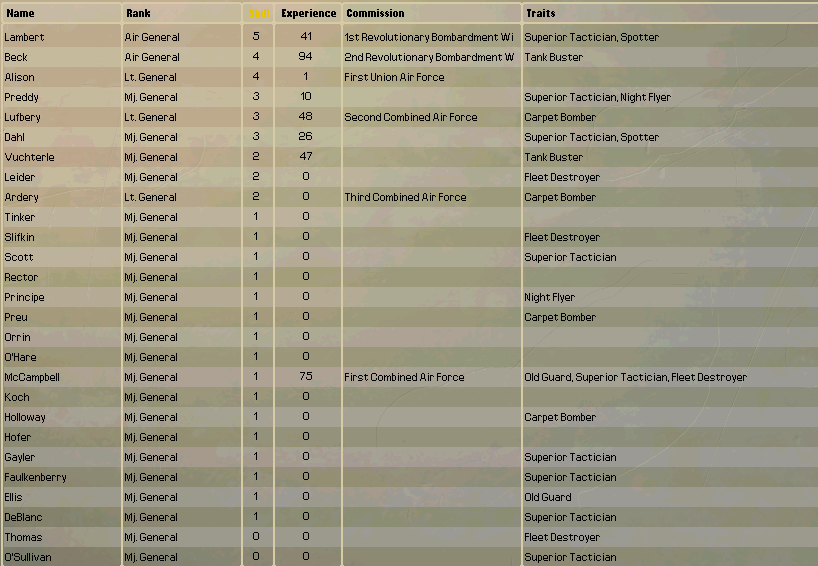

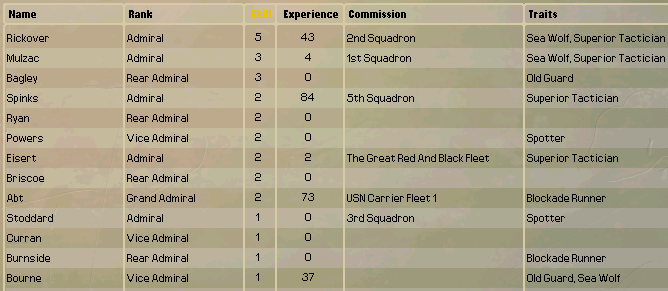
“We succeeded because our soldiers and their commanders were committed to the people, not to a king! Every worker who took up arms, we succeeded because of you! Every soldier who stepped up to become a leader among equals, we succeeded because of you!”
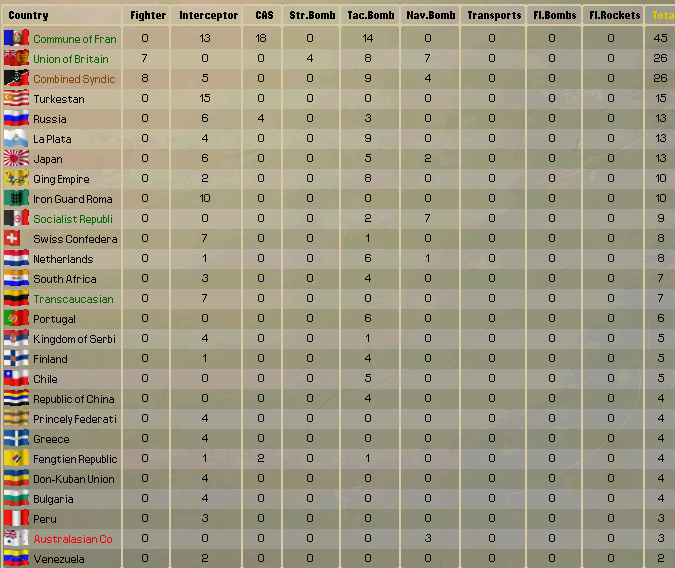
“Every worker on the airplane assembly lines, we succeeded because of you!”
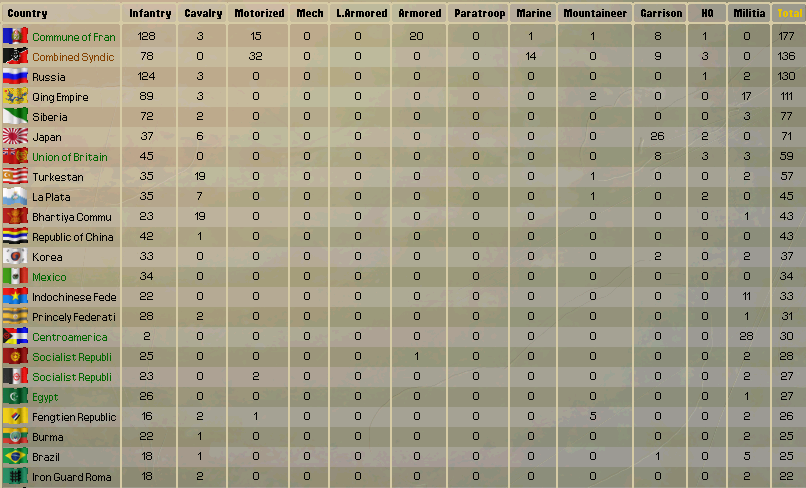
“Every worker and farmer who toiled to arm, clothe and feed our soldiers on the battlefield, we succeeded because of you!”
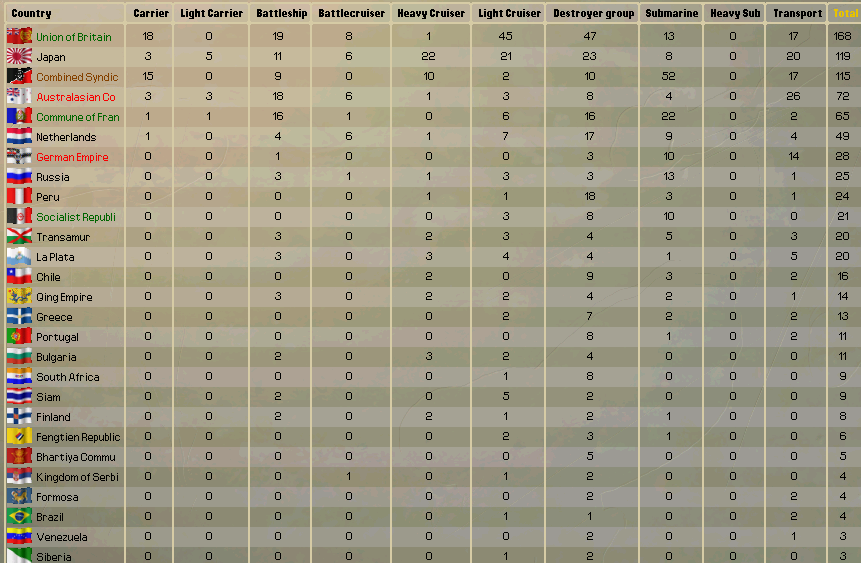
“Every sailor who has sailed the seas in service to the revolution, we succeeded because of you!”
Gitlow took a moment to catch his breath and to let the Chamber applaud, before beginning again:
“I haven’t had one of these speeches in front of you in months, dear comrades, but meanwhile the Kaiser has a speech every two days, even as he abandons his empire. Why? Because the Kaiser needs to propagandize to keep those poor Germans fighting and dying for his sake. I don’t need to do that, because I know that every single American has known exactly what needed to be done! You do not need me to convince you to fight! You have always known what was at stake! You do not need me to convince you to work your hardest, to grow food in every nook you could, to save every important bit of materiel! You have always known what to do! Because, comrades, we are Americans, and we always knew that we would not abandon our friends in need. You do not need me to remind you what you’re fighting for, because you are not fighting for a distant king or a capitalist order that would condemn you to poverty for the crime of not being profitable. You see your comrades, who have known the struggle under the capitalist yoke! You see your children, who will know a better world than the one we were raised into! You look in the mirror and you see a proud worker and a revolutionary! And you know that this fight is for all of us! The Internationale is for all of us, because it is all of us!”
The Chamber, steadily buzzing since Gitlow had turned up the energy level, erupted into cheers and shouts. It was more raucous than anybody had ever seen it and even the audience in the upper tier, the press, dignitaries and whoever of the general public had a ticket to witness the day’s proceedings, was shouting. Nobody in the upper tier ever made a peep and it took many of the delegates by surprise, enough that they turned and craned their necks upwards at the spectators.
“Yes, comrades, we all have earned the right to celebrate. However, we must not forget our responsibility to honor those who have given everything to our cause.”
Taken losses:
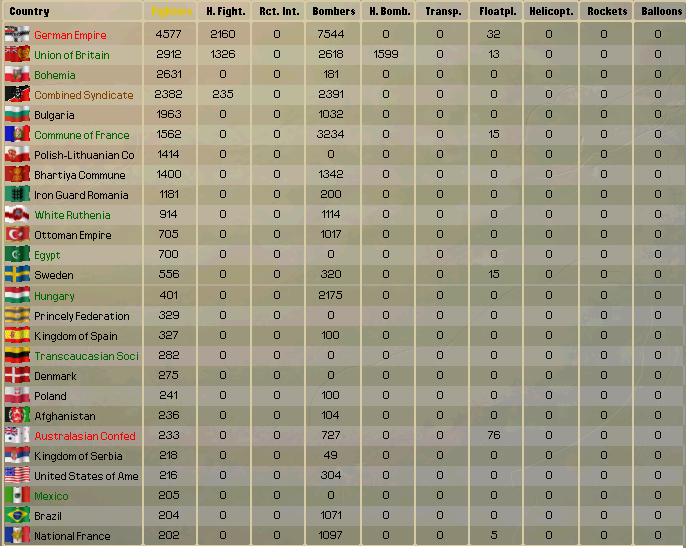
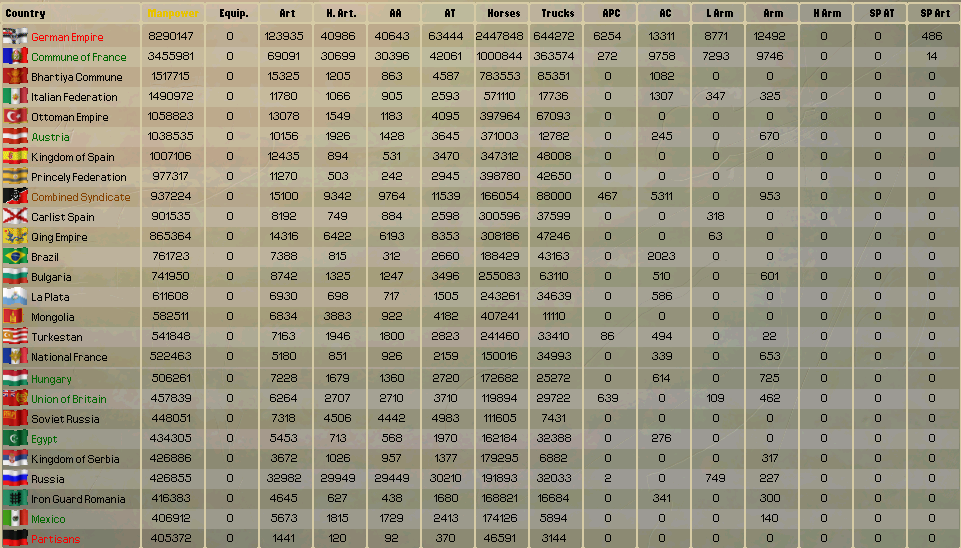
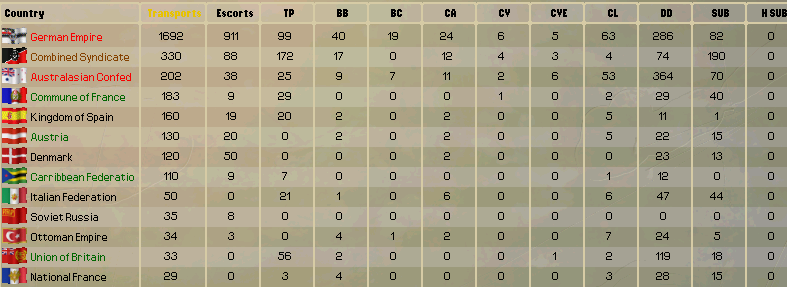
The raucousness of the crowd had taken everybody by surprise. The usual outbursts and cheers were to be expected, but the audience had never gone this wild in the middle of a Chairman’s speech before, especially not the spectators in the upper tier. The Chairman likely knew that it was about time for the rowdiness to run its course, and so he brought the crowd down to earth by evoking the memories of the fallen. She took a moment to think about all the people, most not much older than her, who were fighting and dying in Europe while she was safe at home.
Inflicted losses:
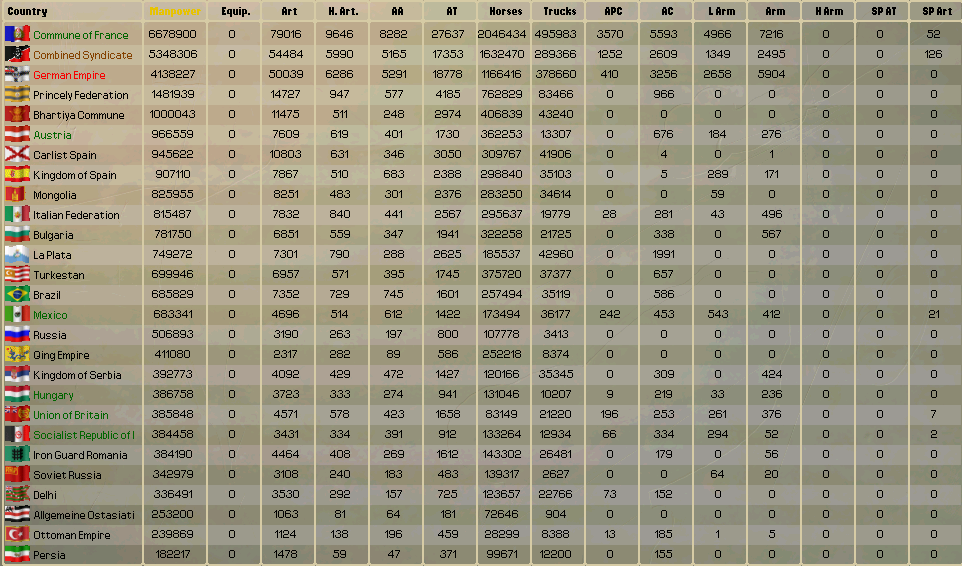
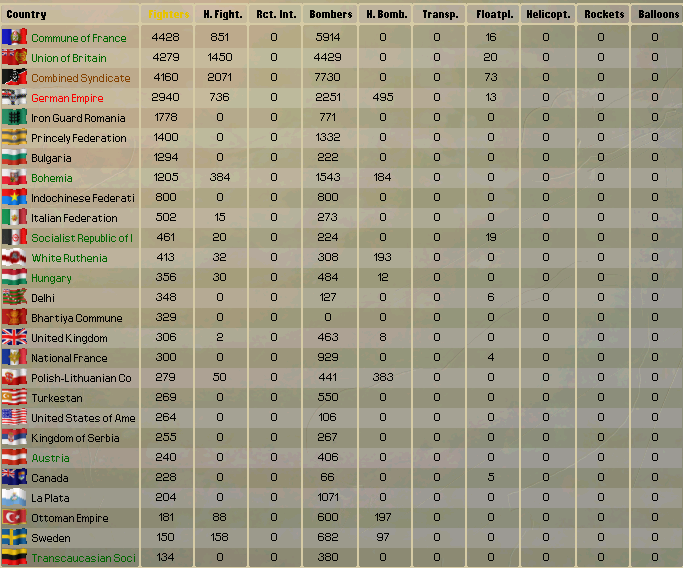
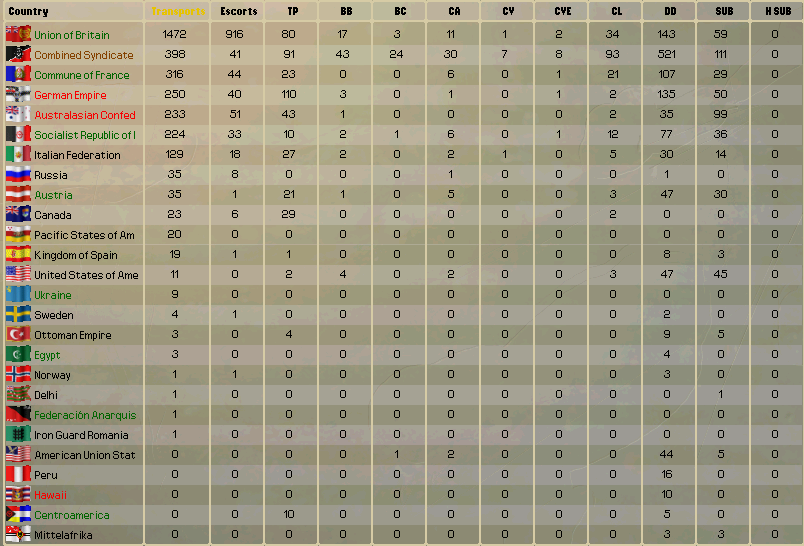
“While we are honoring the fallen of the Internationale, let us also take this moment to honor those who fell against us. While we celebrate the defeat of the aristocrats and capitalists, we ought not revel in the deaths of the workers in Mitteleuropa and the Entente states. It is our deepest regret that the aristocracy of Europe forced our brothers in the proletariat to take up arms against us.”
Samantha looked up to find that more than a few delegates were murmuring, though none dared heckle the Chairman at a time like this. She thought about her father. No, that’s not what the Chairman is talking about. He was no proletarian.
“He’s reaching out to the German workers, to gain support. They’re going to translate this and put it out all over Germany tomorrow. It’s a good move, I think.”
Ms. Perkins whispered this to Samantha during the moment of somber reflection. She often would whisper little bits of explanation and clarification to help Samantha understand what the delegates were getting at during Chamber sessions. Samantha appreciated it. She still took too many things at face value.
British Naval Commanders:

“Most importantly, we must honor our comrades across the world who gave of themselves to defeat the Prague Pact. We honor Mexico. We honor Centroamerica. We honor our comrades in Canada, Quebec and the Caribbean. We honor Italy and our comrades across the Arab world. We honor Britain and the Republican Navy, whose bravery and skill made it possible for the critical products of our labor to make it to the frontlines.”
Samantha could hear Ms. Perkins softly chuckling and glanced at her quizzically.
“He purposefully excluded the Republican Army. He’s sending a message to Lawrence.”
Samantha understood. She admired the subtlety of the dig.
French Land Commanders:

“Most of all, we must honor France.”
The mention of France brought the entire Chamber to its feet for another round of applause. The Chairman turned to his right and looked up. The flags of Internationale states ringed the balcony. The very first flag was that of the Commune. The delegates understood what he was doing and turned to face the flag. The radio audience wouldn’t know that this was happening, but hopefully the French newspaper accounts of the speech would describe the poignancy of the moment.
“The Commune has been the foundation of the revolution. They have done the most for the revolution, they have done the most for America, and they have sacrificed the most for the revolution.”
It was true. The French, between both world wars, had lost a phenomenal proportion of its population. Even after the French lines had held against the German counteroffensive, the Chamber was still concerned that the sheer number of lives lost meant that France would not be able to continue the war effort, even as the front moved out of their territory and into Germany. Thank God that turned out not to be the case, but still France would certainly struggle with the burdens of building a new Europe out of the rubble.
“It has been my great honor and privilege to serve you, Americans, as we attain our collective honor and privilege in how we serve France and the revolution at large. As France gave us the aid we needed to secure our continent, we have given freely of our resources and of our lives to help them secure their own. Our mutual aid has delivered us victory and will deliver us a final victory in due time. To France, our dearest friends, I say this: Vive la Commune! Vive la France! Vive la révolution!”
This brought on another thunderous round of applause, the longest so far.
“And finally, I promise the following, not just to France but to the entire socialist world: America is not only here for you in war, but we are here for you in peace. Together, we have vanquished our enemies, and together, comrades, we will attain the promise of socialism! Peace and prosperity will be ours! To the rest of the world, I promise the following: you are invited and you are welcome. To all peoples still languishing under the whip of the capitalists, we will do our utmost to deliver you from your anguish. We will assist you in your struggle. Because the Internationale is not just a victorious alliance. It is not just a collection of nations come to replace the imperial powers atop a new hierarchy. It is much more than that. It is a brighter future for humanity. It is freedom, prosperity and unity. And soon enough, dear comrades… The Internationale shall be the human race!”
The Chamber erupted one last time, its volume causing the floor to vibrate. Samantha knew the ovation had probably only lasted a few minutes but it felt like she was on her feet applauding for ten or twenty. Not that she minded, in fact she could not stop smiling like a fool for the duration. She never wanted it to end, even as her hands started to go numb. She knew that this was history, and she was a part of it. She would have grandchildren who would study this moment, and she could tell them: I was there.
Even a half hour after the Central Committee had left the building, most of the delegates still mingled and talked amongst themselves. It had become something of an impromptu party. Cigar smoke hung in the air, and the clinking of glasses, presumably filled with liquor, could be heard amidst the laughter and conversation. Ms. Perkins was out and about speaking with her colleagues, leaving Samantha to take in the moment and chat with the other apprentices. Leon had come over to ask if she was interested in going to a Cubs game the following afternoon. Leon had spent his boyhood in Chicago before his parents resettled in their original home of Mississippi and so he was more excited than most of the apprentices about going to see the lackluster home team. Samantha, flustered, began to protest that she didn’t want to distract him by knowing so little about baseball until Ms. Perkins appeared almost out of nowhere over Leon’s shoulder and mouthed the a single word at her.
Go.
Seeing her face made her remember the kind of person she wanted to be, and so Samantha put on her best impression of somebody who deserved Leon’s attentions, and accepted the invitation with all the grace she could muster.
After a few hours mingling, Ms. Perkins and Samantha strolled out the Hall together and boarded a streetcar headed back to their national syndicate office.
“What’d you think of the speech, Ms. Perkins?”
She had earlier asked Samantha what she had thought of it, but Samantha hadn’t thought until now to ask her what she thought.
“It was his best, certainly. I’ve never seen a reaction like that in a Chamber, not even the state one. He got all of us jaded tired bureaucrats on our feet cheering like mad. That’s a feat more impressive than the Sinai landings if you ask me. And I feel like he did a good job of reassuring Paris that we’re committed to the cause, even when the war ends.”
Samantha nodded.
“I agree, that is important.”
“Say, Ms. Pryor, while we’ve got a free moment, I wanted to ask you about something.”
“Oh?”
“It’s getting to be about time for the new apprentice term.”
Samantha had avoided thinking about her limited term as an apprentice. It was the best time of her life, and she didn’t want it to end.
“Oh.”
“I wanted to ask if you were interested in a second year, because if not, I need to start asking around for recommendations.”
Samantha perked up.
“Of- of course, Ms. Perkins, I’d be interested, yes, ma’am.”
Ms. Perkins smiled.
“Excellent.”
Samantha looked out the window up at the elevated track to avoid having the entire streetcar see her beaming like an idiot. The thought of having another year under Ms. Perkins’ tutelage, it was thrilling. After a minute, she suddenly felt morally obligated to say something, even though her heart screamed at her to just be quiet.
“Ms. Perkins?”
“Yes, Ms. Pryor?”
“I… Maybe it’d be best to have a new apprentice. Don’t get me wrong, I want to come back, but I’ve been here during the war. How much more would I learn during peacetime? Maybe it’s better to have somebody new with more to learn. The end of the war is going to make things simpler and I wouldn’t want to take up this spot if it might not be as beneficial to me as it might be to somebody else.”
Ms. Perkins looked at Samantha as if trying to discern something about her. Her usual warm smile had disappeared and her eyes betrayed something almost like worry. What could be worrying her at a time like this?
“I wouldn’t be so sure about that, Samantha.”
She was using her first name. How odd.
“About what?”
“About things getting simpler.”
“What do you mean?”
Samantha was surprised when Ms. Perkins didn’t immediately launch into an explanation or lesson like she almost always did. She always had the answers, but Samantha could tell in her eyes that she didn’t have an answer for this.
“Just that we both have much more to learn.”
Samantha nodded but said nothing, her mind too busy trying to think about what could possibly be wrong with this situation. Everything the Chairman said had been true. Socialism had built a mighty war machine, more powerful than any in history. It had smashed MacArthur and the Union State, it had changed warfare forever against the Entente, evicted the colonizer from Africa, and united Europe under one banner. The Internationale’s war machine could not be stopped. So, what was the problem?
Then it dawned on her.
That was the problem.
END OF ACT THREE
-
Chapter Twenty Seven: Götterdämmerung (March 6 – May 20, 1944)
This diary was recovered from a corpse floating amidst wreckage off the coast of Gotland. The diary was kept in a leather sack meant to be waterproof, and it was so well crafted that even after extensive time underwater, the diary was completely dry. This piece is on loan from the Communal Navy Museum in Paris. We appreciate their generosity. Enter code WWX1092 into your device to hear selected passages translated into English.

March 6
Every day that goes by with us stuck in port is a day closer to disaster, yet there doesn’t seem to any other option that makes sense. The Kapitän is starting to consider attempting a run of the blockade. I haven’t seen the intelligence myself but from what they’re saying around Kiel, it almost seems like there’s enough syndicalist destroyers in the straits that if they lined up end to end, a Dane could walk to Sweden across their decks. It’s a suicidal notion, but with the canal being bombed daily, there doesn’t seem to be any other route for us to make a run to New Guinea. The situation is bleak.

March 10
Wounded are starting to pour in from Schleswig. The enemy is assaulting south from Jutland again, and with Copenhagen under their control, I imagine that they’re not coming for another raid. I think they’re coming to throw us out of port for good. Part of me wants to just change into civilian clothes and steal away into the night. I could find a way to get to Leipzig, but I can’t leave the crew behind like that, with no voice of reason to keep them from being sent into the maw of the beast. The Baltic, our lake, has become our cage, and I fear it is inspiring cabin fever in the Kapitän. Trapped so long in these waters, he thinks that we could roam free and seek glory on the Pacific like we once had on the Atlantic. He knows as well as I that the Australasians haven’t been able to effectively field all the Entente fleets so far. How on Earth would we be able to support the High Seas Fleet and the U-Boats with the resources of New Guinea and Malaya? Nobody wants to speak about it, but the truth is that we have lost. Even writing the words is bitter.

March 25
Kapitän shook me out of bed this morning and ordered me to round up the entire crew. That was when he gave us the speech: the Army had failed us, they were cowards who couldn’t save Denmark and wouldn’t save us. The Navy was now the inheritor of German glory and honor, he said, before declaring that we must make it to New Guinea. He’s insane if he attempts it. A heroic death might suit him, but I’m not interested in having our boat and men go down with him.

March 26
I argued with Kapitän to not attempt the run, and I haven’t convinced him yet. Unfortunately, we are out of time and we must leave Kiel, and he agreed to at least find a safe harbor further east while we consider what to do. I suggested that perhaps we may turn over the submarine to Finland or Russia in exchange for safe passage to the Pacific colonies. It would be better than allowing it to sink or be taken by the syndicalists. He didn’t immediately lose his temper with me, so that means he’s considering it. It’s a faint hope, and I would rather have the crew simply abandon the submarine and go home, but the Kapitän would never allow that to happen.

April 1
Kapitän summoned the crew for another rant. This time he is on about the High Seas Fleet. They steamed out of port after we left to meet the enemy head on this morning. Some of the crew tried to get excited that they would smash the Americans in a final decisive battle, but most of them knew better than to think they have a chance. Kapitän unwisely deflated any high spirits that any crewman had by dismissing the High Seas Fleet as doomed. “I was right, the submarine is the future, the battleship is the past! I was right!” he went on. The crew has always to this point followed the Kapitän loyally but today was when I could really see the change in their eyes. We’ve had a lot of successes over the years and the men have always trusted in his brilliance. But they’re starting to wonder if the Kapitän is all there. And so am I.


April 2
We’re not even going to attempt to get to Lubeck to restock. We don’t have enough provisions for the week, but it’s doubtful that Lubeck has any to give us, seeing as the American carriers are not relenting even after sinking so many of our ships yesterday. I caught one of the men swiping food from the stores this morning. We’re already down to barebones rations, and everybody is dying for something more to eat, but theft cannot be tolerated. However, I dare not tell the Kapitän, as in his current state of mind, the thief may lose more than his good reputation. I’m not sure how to deal with this. Discipline must be maintained but I cannot bear to cause the death of any German, given how many have died already.

April 6
As expected, the message came through today that Lubeck is no longer a friendly port. It was short on details, but I can only imagine the same Americans who took Kiel are ravaging Lubeck as I write this. There is nothing to do except try and keep the crew disciplined and in as high a spirit as possible. I swore the thief to secrecy and told him I was volunteering him for extra shifts as punishment. The Kapitän doesn’t know that I made him do it and congratulated him in front of the whole crew for his initiative. He even told me to note that we should recommend him for promotion. Promotion! Every day with the Kapitän is a different adventure. It is either the darkest gloom or the most convincing façade of normalcy I have ever seen. I would understand if he’s trying to put on a brave face for the men, but I think he actually believes that there is still hope of holding Europe against the barbarians.

April 14
A message came through telling us that the blockade had lifted, and that the carrier force was going back to England. This was our opportunity to try and force an exit, it said. It seems wildly optimistic to me and surprisingly, the Kapitän agrees. I was afraid when I first got the message that the Kapitän would try and make a run, and I considered hiding it from him, but he was in a reasonable mood today. The way the crew immediately assumes I won’t inform the Kapitän of what is going on is revealing. They’ve lost faith in him, and now they are putting their faith in me. I cannot let them down.


April 15
The carriers had made their return to England too obvious, and it had been the trap we suspected. As the High Seas Fleet steamed north, they were set upon by American submarines. The Queen Victoria and Beowulf went down, along with a number of cruisers and destroyers. I must thank God that at least we can try and hide beneath the waves. To be on the surface is certain death. News also came through that Hamburg is encircled and about to be overrun by the Americans. Hans, that goddamned fool, gave the message right to the Kapitän instead of checking with me first. He took to the news of his hometown being overrun as expected and now he is in alternating states of rage and despair. He is hopeless.


April 25
The Kapitän refused to come out of his quarters this morning. He found out last night that Hans had been hiding some of the messages from him and went into a fit of rage. He dragged Hans out of his bed and smashed his face in with the butt of his revolver. Hans is still breathing, but hasn’t woken up since. I am distraught that a man may die because I ordered him to be insubordinate. The crew is sullen, as you’d expect anybody to be when they’re ordered to clean up the blood of their friend who was just rendered comatose by their commander. The honorable thing to do would have been to tell the Kapitän that it was my fault, but I didn’t even know he had found out until I heard the screaming. What good would telling him do now? Would he try and kill me too? Maybe I’d be lucky and he’d just shoot me. But then the men would have nobody looking out for them and we’d be just as doomed as the surface fleet. Perhaps more so. At least they would have an honorable death at the hands of the enemy and not an ignominious end at those of one of our own.

April 26
He didn’t come out today either. I’m not even sure what he’s eating or drinking in there. Some of the men want me to put him under arrest and assume the captaincy. I have been acting as the captain since he locked himself in there, and was running the submarine under his nose before that, but I am nevertheless nervous as to what may happen if I try to arrest him or make the transfer of authority official. That revolver wasn’t loaded when he beat Hans with it, but it may be loaded if he turns it on me. Perhaps it is best to just leave him in there. Somebody shouted down the hall that the Bismarck had gone down, and then a loud thud was heard in his quarters, then nothing. His brother was an artillery officer on that great battleship. I hope he survived and I hope he never has to see the wreck that his brother has become.

I scolded the men not to raise their voices so that he may hear what we say. Any comment or remark could trigger a rage, and we do not need any more of those. The news that came through later in the day that the High Seas Fleet was scuttled was spread in hushed tones.

The mood of the crew improved somewhat when we were finally given some directives to attack the American carriers by the Submarine Command. We still had a duty to Germany after all, and even though none of our torpedoes hit the Americans, it had been so long since those days when we were sinking enemy ships at a regular clip that even just the attempt made us feel normal again.

April 30
He has still not emerged. If not for the reports that some people have heard him rustling about in there, I would think he may have died. I am too nervous to look. He is the least of our concerns right now. Germany is finished, and we are getting no more useful directives or intelligence from command. The only communication we have received was a warning that the syndicalists had declared submariners war criminals who would be executed without fail. I don’t know what to believe anymore, and I suspect this is a desperate ploy by whoever is left in command to try and prevent us from surrendering. Nevertheless, if it is true, then I cannot lead my men like lambs to slaughter. There are many questions. Do we believe the reports? Do we not believe them and surrender? If we do surrender, do we surrender to the Americans or the French? The men have nothing but questions, and I have no answers. The only good news is that we made contact with an Abwehr agent on board a Portugal-flagged ship bound for Qingdao. He has arranged with the captain of that steamer to seal up and throw overboard some provisions for us, and our food crisis is solved, at least for a few weeks. There are some good Germans left in this world.

May 21
I never should have given him food last week. I did not want the man to starve in there, but now my compassion and loyalty to this man have cost the crew once again. He emerged from his quarters today, and attempted to resume command as though nothing had ever gone wrong. He treated the news that Hans had died as though Hans had come down with a bad illness. Did he even remember? It all went wrong when he summoned the crew for another attempt at a rousing speech that came off insane. He was a few minutes in when Jan interrupted him, yelling about how the war was lost and we all needed to go home.
The Kapitän said nothing, pulled out his revolver and shot Jan in the head. Without even thinking, I started towards him but then froze as the gun was aimed at me. Then he denounced me as a traitor and ordered me confined to my quarters. Now there’s no hope. I don’t know where we’re going now, but I imagine he is searching for battle. In his current mental state, I would wager that he has decided that if he can’t escape our Baltic prison, that he is going to search for a glorious death. God save us.

May 24
Two good Germans are dead because it took me so long to do what I did today. I was lying awake when my door suddenly opened. I was convinced that it was the Kapitän come to finally kill me, but instead it was Rupert, more stone-faced and serious than I have ever seen the man. He said to me that it was time to put an end to this, and that it was up to me if I wanted to be the one to finish it. He put a knife on the table and walked out without another word.
I tried my best to sneak towards the command room, before I realized there was only one man on the boat I had any need to hide from. Clearly the crew had voted on a mutiny, but they wanted the blood on my hands. If I was discovered by him, there would be crewmen around to overcome him. This was no covert assassination. It was an execution, and the jury of crewmen had appointed me to do the deed. I found him in the command room, face pressed up against the periscope. He was shouting out orders just like the good old days. We scored a hit, our first in three months, and he began to cackle manically. He cursed the dead Americans and screamed that Germany would never die, that he would never die.
I took time, perhaps too much, to watch and pity the man who I considered to be a greater mentor to me than my own father. I used to dream that I would be present when he made admiral and he would anoint me his protégé and successor. I used to consider myself so lucky to be under the command of a master sea wolf. Now he was a babbling madman, a shell of the brilliant tactician who taught me everything I know. It did not feel like murder when I slit his throat. It felt like mercy.
I am the Kapitän now. For the sake of record, not bragging, it was an American cruiser that we sank, designation CA-28, the CSS Louisville. I take no joy in recording that ship as our 89th kill, but I do take joy in vowing it will be our last. I have made the decision, without any objection from the crew, that we are going to steam to Helsinki and put ourselves in the hands of the Finns. After two years of surviving these deadly seas, it is almost over. There are only 350 nautical miles between us and the end. Given the trials this submarine and its crew have survived thus far, I am certain we can manage that.
-------------------------
Your request submitted at [1:13] [AM] [EST] [MARCH] [4] [1993] for [2] articles from [HAYWOOD UNIVERSITY] has been [APPROVED] and your articles can be retrieved at [FAIR HAVEN LIBRARY]. Allow up to thirty minutes from the time of submission for the article download to complete in addition to whatever time your local library may need to print your materials. More download time may be required during hours of peak usage.
Title: EDITORS ESSAY: HOW BEST TO PURSUE SYNDICALISM IN SOUTH AMERICA
Author: F C DRESCHER, EDITOR IN CHIEF
Publication: THE VANGUARD April 16, 1944
The incredible victories of the Internationale on the continents of Europe and Africa have been the cause of much celebration lately, and indeed the progress of the revolution in the past decade has been astonishing. However, even when the Kaiser’s very last subjects renounce their fealty to him, there will still be an enormous amount of work left to do. The nature of the revolution is changing, our backs are no longer against the wall, and barring some late miracle on behalf of the Pact in Europe, by the end of summer there will be three continents almost entirely under the control of the Internationale. It is something we ought all be proud of, but it is not enough. Nothing short of total victory is enough.
It has always been the goal of the Vanguard to inspire and educate the scholars and future leaders amongst our ranks, and so as editor in chief, it is my intention to start a discussion of how the next phase of the revolution will best be pursued. It need not be fought entirely with the force of arms, as our success in establishing the Internationale as the most powerful alliance in the world has given us a reprieve, hopefully permanent, from the ceaseless mortal danger the capitalist order has presented to us since the days of the Communards. Simply put, we have options now, and total war like that which we have seen in Europe these past few years would be an unethical and unwise choice if new states and populations can be subsumed into the new socialist order through nonviolent means. It is our hope that the series of analyses we will be publishing over the next few months will spur productive debate and discussion amongst the ranks of the military that will promote a nuanced and efficient approach to revolutionary policy in the fascinating new era that is dawning upon us. This series will begin with an analysis of South America. It was authored with assistance from Rafaela Goncalves Pereira and Yoel Cordero, two very accomplished and intelligent expatriates from Brazil and La Plata, respectively, who have been working hard for the cause of their homeland as associate delegates to the Organization of American Syndicates.
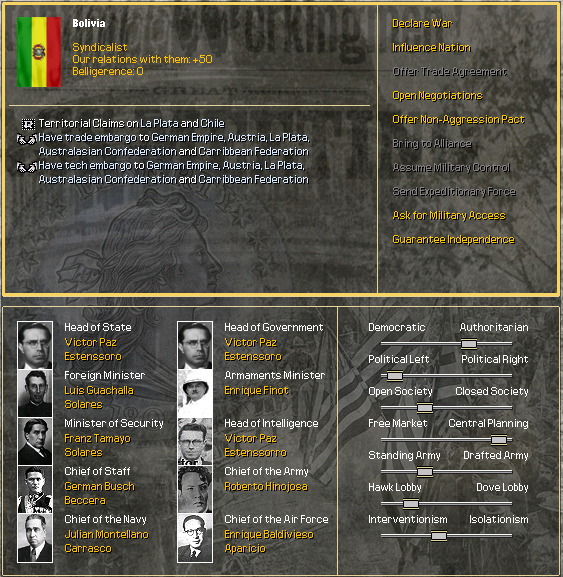
No South American policy worth considering can ignore the needs of the handful of socialist territories that already exist on the continent. While the two continental provinces of the Caribbean Federation are protected by their ironclad alliance with the Combined Syndicates, Bolivia’s revolution, less than a decade old, has navigated perilous waters more or less on its own. Bolivia has not been neglected by the great socialist powers, indeed it has benefitted tremendously from the material assistance of the Phalanstere initiative, but it has had to survive on its own as a landlocked state which has no friendly neighbors. The danger of invasion for Bolivia would seem to decline as time goes on, as a Combined Syndicates undistracted by world war will certainly be capable of a rapid and devastating response to any attack against Bolivia. The most pressing question is the matter of a Bolivian sea corridor. The question of Bolivia’s access to the sea dates to decades prior to the Bolivian Revolution, to when Bolivia was forced to cede the land to the victorious Chileans. Consider this dilemma, readers: would you militarily intervene against Chile to secure Bolivia’s land claims to the Atacama region?
How would it benefit the revolution?
- The territorial benefits are obvious: Bolivia gains its own access to the sea, and the Internationale would have a naval base in Antofagasta, its first in South America.
- It would signal to Internationale states outside of Europe and North America that they can depend upon the great socialist powers to pursue their interests.
How would it harm the revolution?
- There is a long history of white nations intervening in Latin America to secure their interests in the region. The great socialist powers have endeavored to shake off the reputation of our imperialist predecessor states, and this course of action would certainly damage our standing with the populations of South America, no matter how we attempt to frame it.
- Stoking nationalist fervor in non-socialist countries could be harmful to our cause, as national pride would grow to such a point that the Chilean bourgeoisie could utilize it to suppress class consciousness.

It is important to remember that there is no one proper course of action for dealing with every non-socialist state. Context is crucial. For example, there are obvious differences in how we dealt with the situation in Spain versus how we are dealing with the Netherlands now. The Kingdom of Spain had brutally repressed our comrades in the CNT-FAI and so applying the force of arms was necessary for not only the strategic benefit to the greater war but because the state of the revolution in Spain was so poor that it could take decades to rebuild the movement. Invasion allowed us to dismantle the royalist police state and bring back the exiles. On the other hand, the Netherlands has been tolerant of syndicalist parties in their borders, and the social democratic government not only stayed neutral in the European war, but has signaled a willingness to negotiate a voluntary decolonialization and potentially an associate membership in the Internationale. With that in mind, where does Chile fall in terms of endogenous socialist potential and is that potential violent or nonviolent in nature? The Chilean democracy is functioning, and while the government has been pursuing trumped up charges of espionage against some trade union leaders who cooperate too closely with Bolivia, trade unionism is legal and so the election of a government more willing to negotiate with the Internationale is possible. Indeed, the goal for South America ought to be a situation similar to what is developing in North America, where Quebec and the Combined Syndicates are close to an agreement to abolish all border checkpoints and goods flow easily across all borders. If Chile becomes a socialist nation, then it matters not a bit that Bolivia is landlocked, as there are no meaningful borders between friendly socialist nations.

A similar situation exists between the Caribbean Federation and Venezuela. When Canada fell to the Combined Syndicates, the opportunistic Venezuelan military seized the Guayana Esequiba province from the Entente-aligned Federation, and the socialist successor state of the same name retains its claim to the region. It is not as strategic an interest as Bolivia’s, as the Federation’s continental territories are just one piece of the overall state, and indeed the archipelago nation has no concerns about being landlocked. Venezuela’s government is far more hostile to syndicalism than Chile’s, and it actively persecutes socialist groups, but they do still hold mostly free elections, and so the same possibility of a friendlier government exists as does in Chile, though perhaps to a lesser extent.

However, the parameters change entirely when we consider the two warring regional powers in South America: Brazil and La Plata. La Plata recently elected Juan Peron, an ardently anti-socialist autocrat who has shown a willingness to resort to the dirtiest of tactics to suppress his opposition, all justified by pointing to the war with Brazil that has no end in sight.

Despite this, we still have to consider La Plata the lesser evil, as the Integralist regime in Brazil has long outlawed unionism and has codified suppression of socialism into law. While Salgado insists that Integralism is for all races, any hint of self-determinism from indigenous and Afro-Brazilian groups has been met with the most brutal response. Neither state is a democracy, both states are vicious in their treatment of our comrades and their size and resources give them the potential to interfere with the spread of socialism in their neighbors.

The South American war, like all wars, is a tragedy. It is even more of a tragedy, however, because a victory for either side does nothing to advance the cause of humanity. A callous imperialist state would be glad to see two foes bleeding themselves dry but no compassionate worldview can celebrate the death of innocent workers to no apparent end. As the loss of life mounts in this war, the pressure on both the Peronist and Integralist systems grow and amidst this tragedy we find an example of violent endogenous socialist potential. We must never forget that the French Revolution was born of the devastation of the Great War, or that the American Revolution was born of MacArthur’s violent retributions. The great socialist powers must utilize every method, covert or overt, to spread our message amidst the populations of both La Plata and Brazil. There is a strong case that the growing prosperity and persistent peace of North and Central America would signal to these populations that they have more to gain by joining together and embracing socialism than continuing to fight one another for the benefit of the petty tyrants who rule them.
However, as each side becomes more desperate, they have begun to blame some of their problems on the specter of socialist agents and saboteurs, supposedly supported by Bolivia, the Combined Syndicates or the other side. This has created an intriguingly risky situation where both sides make demands of Bolivia, suggesting that failing to return exiles to their custody (and certain death) constitutes a violation of neutrality and makes Bolivia a belligerent. Bolivia, to its credit, has refused to hand over anybody. If either side makes a play to invade Bolivia (which would also serve to expand the front and break the stalemate), then the great socialist powers would be compelled to act. This is the most ethically complicated question of these all. There is a great deal of endogenous socialist potential amidst the upheaval, but waiting to see if it manifests itself also means that more people will die in the war and there is potentially a greater risk of Bolivia being attacked, which could trigger a continent-wide conflict. While I believe the answer in terms of the Atacama dispute is clear, the answer to this dilemma I have much less confidence in.
Our final scenario concerns the northwestern corner of the continent.

The general war between Columbia and Peru ended recently with total victory for the Peruvians.


Peru has established puppet regimes in both nations, and there is always endogenous socialist potential in puppet regimes, as the poor material conditions inherent to the servile arrangement as well as the wounded national pride that comes with defeat and prostration to a foreign power usually lead to resistance groups of various stripes appearing, and Centroamerica, Mexico and the Combined Syndicates are all in an excellent position to provide assistance to any socialist resistance in those two nations.

The Agüero regime seems to be in firm control of Peru itself, its legitimacy bolstered by its great victory over Colombia, and so there is clearly more opportunity in focusing on the two client states of Peru as opposed to Peru itself. In my opinion, this is the clearest scenario of them all: wait for the inevitable resistance, and then aid them.
I hope that this essay has helped you begin to think about what the post-Europe revolution will look like and to disabuse yourself of the total war mentality that we have had to adopt simply to survive since 1936. The world is reacting to our tremendous victories and so we must learn to adapt to the new situation. Upheaval and destruction can inspire a desire for change, and as socialism becomes the new normal, we should endeavor to minimize destruction not just for the obvious moral reasons, but also to preserve our gains and prevent resentment and reaction from undoing what we have all sacrificed to achieve. For centuries, the peoples of the world have looked upwards at the capitalist order as it cast its long and deadly shadow over every corner of the world. As we continue to succeed in dismantling that old system, we must recognize how we have assumed the same prominence, and be mindful of how the world now lives in our shadow. The long-term success of the revolution depends upon our wisdom and moderation with which we apply our incredible strength.
I will be working on another essay analyzing how to pursue socialism and OAS integration in Haiti, the sole capitalist holdout in North America and I hope it will be ready in two weeks’ time. In the other pages of this issue of the Sunday Vanguard, you will find the same excellent in-depth coverage of developments in Chicago, America and around the world that you are used to. Please note that the Weekly Record of Redactions section has been moved from the back page to page 48, after the Reader Letters section. This will be its permanent position from now on as the back page now features comics submitted by some of our artistically gifted readers. As always, comrades, thank you for making the Vanguard the largest independent military newspaper in the world, and remember to fight hard and fight smart.
Francis Charles Drescher
Editor-in-Chief
The Vanguard
Title: LAWRENCE STUNS LONDON TUC, CHICAGO AND PARIS WAIT AND SEE
Author: NONE LISTED
Publication: The Chicago Proletarian May 2, 1944

The Extraordinary Trade Union Congress called by the British government a few weeks ago came to a sudden and shocking conclusion yesterday with the unexpected arrival of T.E. Lawrence to the congress, followed by his apparent ascension to leadership of the Union.

Observers were caught totally by surprise. The Congress had been proceeding quite normally with a focus on further industrial development in Britain, aiming to leverage Britain’s status as the least ravaged state in Europe into a prominent role within post-war Europe.


Important ministry positions were being haggled over on the morning of May Day when the news spread that Lawrence was entering the city.

What exactly happened between the Trade Union Congress and Lawrence is unclear at this time, but there are credible reports that Lawrence has effectively seized control of the government. This story broke as this paper went to press, so details are unfortunately scarce and no statements have come from the Central Committee and as of now, the newswire from Paris reports no statement from the Communal government either. Anonymous sources in Chicago tell the Proletarian that the Gitlow administration is attempting to learn if Lawrence’s ascension to leadership was done through legal or extralegal means before responding. Anticipate an extra edition of this paper later today as more becomes known about this situation.
-------------------------
“Gitlow has to do something.”
“What is he gonna do? The Trade Union Congress voted him in.”
“After he charged at the head of a column, like a goddamn Roman emperor. They were coerced, it’s obvious.”
“We don’t know that. We can’t accuse him of engineering a coup and then coup him ourselves. If there’s insurrection then maybe we can intervene, but its impossible right now.”
“There practically is insurrection, just without any shooting. The Scots might as well be independent for how much they’re ignoring London and the Welsh TUC is going to meet on Tuesday, and they might resolve to do the same thing.”
“And Lawrence isn’t doing a thing about it, after charging in about how he has to save Britain from decentralization and irrelevance. But until he tries to kill somebody, then there’s nothing to do about it.”
“What do you figure he’s after?”
“Beats the hell out of me. The whole thing is confusing as can be. He sprung a trap and surprised everybody and now he’s playing the waiting game. Usually people do those two things in the opposite order.”
Something slides in under the door. The grunting of an older man bending over to pick up something can be heard, followed by the tearing open of an envelope.
“What’s it say?”
“It’s Ukraine.”
There was some kind of AI bug with Ukraine. Don’t ask me.
“Please tell me they’re putting Khrushchev back in charge. That’d make life simple.”
“No, nothing in Ukraine itself has changed, the army still refuses to leave the country, but there’s something we need to deal with.”
“What?”
“The Russians.”
“The Russians??”
“The Russians. Our man in Moscow says that there’s a plan moving with some quickness to attack Ukraine.”
“So the Russians would swoop in and gobble up the east after we did all the work. Clever bastards.”
“We can’t let it happen.”
“What can we do about it? Our closest troops are in Translyvania.”
A short period of silence.
“What do we have in Turkey?”
“The Canadian armor and two motorized corps. Thirteen divisions.”

“I say we deploy them.”
“Where?”
“Crimea.”

“Should we risk that valuable a force on this?”
“They’re the only ones available, and they can move fast enough to get something done.”

“There’s a Pact fleet stuck in Sevastopol, we’ll need to escort the landing.”
“The battleships are in Alexandria, they can go.”

“Do they have enough strength to handle the Black Sea Squadron?”
“Oh yeah, and those Pact ships haven’t been supplied properly in months. They’ll tear them to pieces.”

“So what does seizing Crimea get us? I mean we definitely want to keep that base from the Russians, but would just taking Crimea scare the Russians away from the rest of Ukraine?”
“We shouldn’t stop there, no. That’s why we can put those mobile forces to good use, they can move quickly to put themselves in the way of the Russians.”

“And once we’re in the way of the Russians, they wouldn’t dare get involved.”
“Precisely.”

“How far do you think we can go?”
The rifling of papers can be heard.
“The army is posted at the border and have been ignoring orders to join the Pact defense in Poland for months. According to this, there’s no enemy divisions around Kharkov, we can drive there from Crimea in no time.”

“How far are we willing to go with this? Do we want to seize the entire country?”
“Why not? Khrushchev would be in our debt, and we’d have another pal in the Union.”

“We better be setting some real objectives for this operation before we commit these forces.”
“Kiev, of course. Kharkov… Odessa, Sevastopol, Rivne… If we capture those cities then we’ve basically got the major infrastructure under control, and I imagine the Ukrainian army will defect by then.”

“What if we’re wrong about their army? What if they decide to wake up and fight back?”
“Then we pull back to Crimea if we must. The French are coming, so if this fails then they’ll probably be able to come in and clean it up for us. We really just need to make the Russians hesitate long enough for the war to run its course.”

“I guess… I’m also concerned about using the Canadians for this.”
“Why? They haven’t been a problem in months. Marshall has them running like any other Red Army unit by now.”

“Alright, that’s true. I admit I’m just looking for something to sink this plan, it seems far too risky. If they come for us, we’re not gonna have the numbers there to deal with it, and I don’t want to lose so many people this late in the game. It’d be a disaster.”

“We have the mobility, I’m telling you, it’s fine.”
“There’s some real backwards regions here. What do we do if we get bogged down someplace with barely any roads?”

“I don’t think we’re going to get bogged down anywhere. The enemy is at the borders, and they’re not moving.”

“What about the Germans in the country? They’re not going to sit around and let us take over. They might not want to fight the whole Ukrainian army but they’ll fight us.”

“There’s not enough of them to make a difference.”

“I’d feel better about this if we had some more men available.”
“Well we may only have the thirteen divisions available immediately but there should be some Arab forces available soon. Green as grass, sure, but I’m sure they can hold the line against these Ukrainians. They’re too busy fighting themselves.”

“It’s just… so risky. We haven’t had to do anything this risky since Spokane.”
“I know, I know, but we can do it.”

“Are you sure if we seize the infrastructure that we can get the Ukrainians to stand down?”
“That is what I’m most sure of.”

“I hope you’re right.”
“I am. Trust me, a third of the army wants to defect outright, another third wants to declare neutrality and sign a separate peace, and the third third is too busy being afraid of the other two to put themselves out there. Once we control the infrastructure and bring in Khrushchev, they’ll flock back to him. So many still resent that he was thrown out in the first place.”

“But then, there’s still the Germans.”
“Barely any Germans. Listen, I know it’s – “
“Insane?”
“I’d prefer to call it bold.”
A snort.
“Well they do say that fortune favors the bold. I’m not going to be the one explaining to the Chamber how we let Ukraine get away. I’m with you on this, but it’s your ass if this goes tits up.”
“Don’t worry about it! Chairman Khrushchev will be inviting us to spend next May Day in Yalta, just you watch.”
A hearty laugh, the sounds of papers being collected, footsteps and then the slamming of a door.
-
Chapter Twenty Six: Petty Kings & Bourgeois Republics (Hungary & Bohemia: February 14 – April 1, 1944)
This was turning out to be one of the worst Council meetings he had ever been to. Rather than an example of how the system is supposed to work, this was a prime example of what Joe’s father would gripe about to his mother all the time: “small-town horseshit”. Joe had planned on this being Sean’s first meeting, but he had gotten grounded, and the fact that this would have been his first made Joe think that was a blessing in disguise. There had been many acrimonious meetings in the past: the old timers in town still talked about the three week marathon session about whether to join in on a worldwide general strike until a War Crimes Commission was convened (they didn’t but the Commission was convened anyway) and there was a brawl during the meeting about whether to intervene in the War in Turkestan that resulted in Stout’s masterpiece landscape of the Navesink River being damaged. Those were at least important issues to fight and yell about.
The issue today?
Headlights. There was a two hour plus argument going on about how blue and bright headlights could be. The area had gotten too crowded for hunting and a few broken windows from stray bullets led to a district wide ban about five years ago. This led to the deer population getting too large and now too many people were running into deer with their cars, so now Bill Kelly’s auto parts shop was stocking new headlights that were very bright and blue which were supposed to help with spotting the deer at distance. The unintended consequence of these new highlights was that people were now blind on the road. All the usual insults and accusations were hurled. Only a Totalist would try and tell me what kind of headlight I can have, my mother/grandfather/cousin thrice removed didn’t fight for this! Hashing out all these minor controversies and dealing with the local lunatics was a chore, but Joe had to believe that too much democracy was preferable to not enough.
After two hours of pondering Stout’s work (thankfully only one corner of the landscape had been damaged all those years ago), Joe had to find something else to pass the time. He had promised his niece he would be here for her performance, and Chairwoman Gibson had, for some reason, scheduled that performance for after the headlight debate. He rifled through his briefcase and came upon his son Sean’s school-issued tablet computer. He had to take it away from him since Sean had hacked the tablet to be able to play games on it during class. The computer science teacher had volunteered to clean the tablet up for him, but Sean was getting older and he might have been using the tablet to flirt with girls under the nose of the teachers. Joe had no reason to be suspicious of the CS teacher, but it seemed appropriate that if any adult should come across something potentially embarrassing, it ought to be him.
Hunting down all of the games got tedious, and Joe was started to hope he would find some evidence of young love if only to learn that Sean had interests other than video games and annoying his teachers. Sean, eternally too clever for his own good, had given all of his games different names to mask what they were from the monitoring programs the school installed, so he had to click through every single one to see what it was. Calculator turned out to be a baseball game, for instance. Clicking on GlobeMapper 2.0 caused a familiar graphic to sprawl across the screen: a red star medal with the profile of a SOMUA S-55 tank inlaid in gold in the center, laid on top of a map of Western Europe. In a big military-type font across the top: Gènèral Du Char.
Joe’s teenage years were taken up by three things: trying to convince his current wife Mary Ellen to go out with him, football, and Gènèral Du Char. Before he uninstalled this game, he decided to take a look and see how it had changed over the years. Joe clicked through the intro screen and looked through the scenarios. There were the classics that he must have played a hundred times each: Flanders, Rhineland, Torch, New England, Cascadia, Rocky, Sinai. There were a lot of new ones too. The Internet made it easy for players to upload their own scenarios. In his day, the only way to get new scenarios was to sign up for the GDC fan newsletter and write or call people to ask them for floppy disks of their custom made scenarios that they described in the Community Creation pages. Now it was all integrated into the program itself. The list was enormous: Andean War, Sahara, Mars… Middle Earth… Equestria?? Joe turned on the filter for Historical Scenarios Only and downloaded the highest rated one in the list: Hungary & Bohemia.

Scenario:
OAS forces have recently crossed into Hungary, triggering the Hungarian and German armies to fall back, hoping to defend Budapest against the Syndicalist onslaught. You must defeat them and capture Budapest, as well as Prague. Capturing these two cities will open up a path to encircle Berlin and end the war. Good luck, commander.
Victory conditions:
*Hold Prague and Budapest before June 30, 1944
*Keep average morale above 50%

The game map opened up after he clicked through the briefing. The graphics had improved by leaps and bounds compared to the version he played all those years ago, but the essential elements of the user interface had not changed. A large Pact army was in retreat into Slovakia. Joe’s first instinct was always to try and hold chokepoints, and the strip of land between a lake and the impassable Serbian border seemed like a good point to try and hold.

Joe turned his attention to the border with Bohemia. The armies in that half of the map were all French and German, while more of a mix was represented in the battle between the OAS and Hungary. The French armor had low morale, probably to represent that they were coming off a mad dash all the way from France.

The numbers advantage was definitely on Joe’s side, which was probably the reason for the morale requirement. Without it, there wouldn’t be much challenge to the scenario. A cautious approach would probably take too much time and cause morale to degrade too far, but if he was reckless and lost major battles, then his morale would plummet. He had to think carefully about what he was doing. Joe had to capture important cities to keep his morale above the requirement. Pressburg, the old name for Bratislava, was a Tier 3 City, and would give five percent of morale across the whole front. That would be a good start.

Joe ordered the Abraham Lincoln Corps to advance, and deployed all of his available bombers into the area.



Syndintern won all of the initial battles, as they were bound to, given their advantage. More importantly, they were won without many losses, and the negative effect on morale was minimal once the small bonus for winning battles was factored in.

Finding a way to get to the enemy capitals without losing tons of soldiers would be crucial to win the scenario.

A strong line of French armor held against an almost as strong German line in the Sudetenland. There was one weak point, as the victory in Pressburg had isolated a few motorized divisions in Znojmo. Joe had a fresh unit of American motorized divisions available and a Medium intelligence level of what German forces were present in the interior of Bohemia. He couldn’t be sure that it was accurate, but it said that were no German forces in between him and Prague. The scenario would require a gamble if he wanted to win with enough morale to spare.

Joe decided to go all in.


Luckily, there were not only no Germans in the area around Prague, but none in Prague either.

Capturing Prague was easy for the rapid motorized troops. +10 morale for all troops. This was going pretty well, especially since he hadn’t played in fifteen years.

Gènèral Du Char usually punished the complacent, so he had to press his advantage. The motorized divisions weren’t enough to defeat the German forces they had flanked, but in combination with the French line, they might be able to help surround and eliminate them, and then he could blow this game wide open.

The AI probably recognized what danger it was in, as German units began to peel away from Slovakia in order to harass the motorized unit. Risking Slovakia seemed foolish, but perhaps the AI was coded to defend the route to Berlin, even if it wasn’t on the map?

Only Budapest was left now, and large numbers of German troops were coming south from Poland to reinforce it. Now was the time to go all out. All divisions bordering Hungary attacked. It would be best to push back that line before they could reinforce it.

The Hungarian divisions were weaker and retreated right away. The German troops that remained were the best on the map, even better than the French armor. They weren’t going to be enough to hold back the sheer OAS numbers, but their spirited defense might delay long enough for more reinforcements to come. There weren’t enough troops on the map to hold back the OAS force, but morale was creeping downward. There was still a big enough buffer that it didn’t worry Joe yet.

Until the message box popped up:
You have 8 divisions out of supply.
He had made the amateur mistake of forgetting to secure the flanks of a rapid advance, and now he was in trouble.
“Bullshit!!”
The outburst drew his attention away from the game. Joe glanced at the clock, he had been playing for twenty minutes. The headlight debate was still going on. Mr. Hogan had interrupted the proceeding with the obscenity. Hogan was, as far as anybody knew, the last surviving veteran of the Revolution in town. He had to be about 100, and he would tell anybody who would listen about how he went to join the CSA in Philadelphia with his brother when the election of 1936 was cancelled, and how he saw the events depicted in the huge painting over the council table, even though that occurred after his claimed date of departure.
“This Council used to mean something! Back in my day, we would hash out our issues like men, not cry like a bunch of babies!!”
Everybody was quiet out of deference, but nobody was really listening to him. Mr. Hogan was notorious for derailing Council meetings with his rants about how the Council wasn’t the way it used to be. He was right. It wasn’t. The reason Joe skipped so many of the meetings these days is because most of what was important for his work had been settled through email or been codified into an algorithm long ago. Joe wouldn’t say that the Council as an institution was obsolete, but it had certain been superseded in some areas. Hence, there was more time for this type of nonsense now that computers made sure there were enough flu shots every fall.

Once Mr. Hogan’s rant was over, Joe no longer felt an obligation to pay attention to what was going on, and so he went back to his game again. He began an all-out assault from the west to re-establish supply to Hoffa’s unit. Having any of his units surrender would be such a huge morale killer that it’d probably end the scenario.

As soon as the lines were re-established, Joe decided to resume the push. Hoffa’s unit could link up with the French units in Pressburg and encircle a number of German units.

Another event popped up:
Bohemia has been defeated. +5 Morale
Most of Bohemia shifted into Syndintern control, leaving two pockets of German forces.

The first was easy enough to take out. It wouldn’t be long before he could move all of his troops from Bohemia and finish off Hungary.

Still though, Joe was going to continue pushing his advantage whenever he had it. He had gained control of two avenues of attack into Budapest, and the game had always made it so that having multiple angles of attack against “hard” terrain types, like mountains and cities, would result in a much easier time.

Even though he had the numbers advantage and a large morale buffer, a protracted battle for Budapest involving this many of his troops could deplete his morale enough to fail the scenario.

“Son of a bitch.”
“Watch your language!”
Joe didn’t realize he had said that out loud. He had forgotten that some maps allowed for enemy troops to deploy from off-map. There were little arrows at the edge of the map that would flash if there was a possibility of troops deploying from that direction. He hadn’t noticed it.
Prague has been lost. -15 Morale
This was bad. He was now at a 53% average. He needed Prague back ASAP.


Once again, Joe used Hoffa’s corps to seize the city. The -15 morale effect disappeared, but the +10 morale from the original capture had expired, leaving him at 58% average. The blunder could prove devastating.

The Battle for Budapest needed to end ASAP. It was going well but morale had creeped down to 55%. He sent Rose’s troops into Miskolc north of Budapest. Already the Budapest garrison had burgeoned from 7 to 23 divisions, and 8 more were on the way. These divisions would certainly prolong the battle long enough to make him lose. With both battles going on, he was now losing a full point of average morale a turn.
53%
The battle didn’t seem to be progressing fast enough.
52%
It definitely wasn’t.
51%
Would he fail going below 50% or would he fail if he just reached it? Joe wasn’t sure. He desperately looked around, hoping to find a way to keep his morale up for just a few more turns. He was so close! Then he saw an unfamiliar button next to the portrait of General Rose.
Special Ability: Inspiring Leadership, adds 20 points of morale to all troops under command. Cooldown: 90 days
That was a new feature, or at least it had been added since the last time he played. The feature might have been added when his son was born for all he knew. He pressed it and his theater-wide average popped back up to 54%.

Two turns later, and Budapest was his.
Victory!
That was fun. As Joe went through the stats of his run (including Historicity: 100%, whatever that meant), his attention was brought back to the meeting by the slamming of a gavel.
“Those in favor of the ban do not have enough votes to send the issue to referendum.”
Joe had been so engrossed in the game that he didn’t even realize there had been a vote. Chairwoman Gibson had been at this long enough to know that there would be some people who wouldn’t let it go even after they lost, and so she announced that the performance of the choir had been moved up to now.
“The debate took longer than expected and these kids need to get home. Agenda setting for next week will take place after their performance.”
God bless Mary Beth Gibson and her finesse. Even the angriest people wouldn’t try to shout over a bunch of schoolchildren singing revolutionary songs. He exited the game and dragged the icon over to the little trash can to uninstall it. He then slid the tablet into his briefcase and made sure to wave at his niece. She smiled and waved back, and then he sat back to listen to the classic songs every aspiring musician learns in school. As the choir started with The Internationale, Joe had to wonder if Pottier really believed that the revolution was the final struggle. Or perhaps the song was meant for this occasion. Race, religion and gender had been the easy parts, but once the great headlight divide was bridged, then the Internationale would truly be the human race.
-
Chapter Twenty Five: The Northern Front (Scandinavia: December 17, 1943 – February 26, 1944)
Excerpt from unpublished memoir of David Parks, special investigator for the War Conspiracy Commission. Concerns an interview that took place in December 1952.
The next interview would be the most interesting. Chicago was then, as it still is, a hotbed of demonstrations and political strife; the most political Americans tend to gravitate there whether they are motivated by civic duty or a rebellious streak, or both. No matter how much power is devolved down to states, cities or syndicates, some things will always be decided in Chicago, and those things are usually the most controversial. Unless you’re a total political animal who thrives on the conflict, it can be overwhelming. Go take a ride on any train or plane headed out of Chicago the day after a Chamber session closes and you’ll see just how exhausted most of the passengers are by it all. In 1952, given the heft of what the Chamber was considering, that tension was triple what it is today.
That is why I was excited to get out. In eight months of hearings and investigations, I had been out of the city just once, and that was for a three-day trip to the reactor complex on Door Peninsula, all work, no leisure time. I was so desperate to change my surroundings that I volunteered to take the plane to Iraq to interview General Liffland, of Revolutionary Marine fame. Everybody was nervous about getting that close to a potential warzone, but I was more afraid of the dangers of overwork and stress than those that lurked across the Persian border.

The second my train departed, I breathed a sigh of relief and slouched down into my chair. It would be a long trip with plenty of opportunities for solitude and silence, one that started with a train ride to New York. Before the revolution, there was a train line known as the 20th Century Limited that would run from Chicago to New York in sixteen hours. The railroad was taken over by the military during the revolution, and it wasn’t until after the final peace that the constant materiel deliveries stopped. The railroads were then handed back to the unions, who had never really controlled them de facto in the first place, given the more than a decade of constant militarization. Air travel was becoming more and more popular by the end of 1952, but the 20th Century Limited, reinstated with the rather dull name of the Chicago-New York Express, offered a few advantages that air travel did not. Most of the delegates made full use of their priority boarding privileges that let them skip the often-lengthy waitlists for flights. Getting on the train with the regular folk let me escape the attention of any delegates who might be hostile to the investigations. I was also able, due to my credentials, to get a private compartment complete with a workspace that would let me go over my documents and get organized without any prying eyes looking out for their chance to get a hot scoop for the Proletarian.
It was on this train ride that I gave myself a specific objective for this trip. The initial impulse to blame the British for everything had been washed away by the revisionist impulse to blame the Americans and French for not knowing how to deal with the British properly. The narrative went that the Americans and French acted arrogantly and foolishly with regards to the Union during the war. But as you remember from the last chapter, we found that the admirals never had a complaint about working with the Republican Navy and that the Central Committee seemed to get along just fine with Nicholas’ inner circle. Indeed, Thomas and Nicholas forged a strong working relationship over their mutual love of God while dealing with those who often rejected Him. In order to understand the direct and indirect role of the British in the conspiracies, we had to hunt down the source of the mistrust. And the earliest signs of it seemed to come during the Scandinavian Campaign.


The cooperation in the early stages seemed to go off without a hitch. The Republican Navy, depleted due to its vicious battles with the High Seas Fleet, was more than willing to use its extensive naval intelligence apparatus to support the operations of the newly ascendant Red Navy, which was eager to put its new carrier force to the test. The Red Navy could have likely dealt with the pitiful and obsolete Danish and Swedish fleets without the help, but the Republican Navy’s eagerness and humility in passing the torch to the Americans was hardly the signal of discord we were looking for.

This is what brought us to General Liffland. General Liffland was rumored to have a bad opinion of the British command, but of who specifically and for what reason wasn’t well known. The challenge would be to get Liffland to trust me. He had already flat out refused to come to Chicago, which is why I was headed out to him. He had a good excuse in that he didn’t want to be absent from Iraq in case of a Turkic sneak attack out of Persia, but the word from our sources in the military was that he had nothing but disdain for the investigation, believing it to be naught more than a show trial. From all of this context came my objective. I intended to establish trust with General Liffland and learn what, if anything, went badly between the American and British commands during the Scandinavian campaign. Anything else beyond that would be a bonus.

My preparations both helped me to relax yet paradoxically also make me more tense. Knowing what I knew about his attitude made me not look forward to the questioning. On the other hand, expecting obstinacy meant that I could not be surprised by it, and so I found some solace in the idea that I at least knew what I was getting myself into. Indeed, many of the Marines I would meet had been with Liffland’s unit when it landed in Denmark nine years prior. They had also taken part in most of the later events which our commission was now investigating as potentially criminal in their conception. We always made pains not to tar the individual soldiers with broad strokes, but even being accused of performing honest service in pursuit of dishonest ends could be taken as an affront by veterans, and I couldn’t blame them for that.

By the time I made it to New York and boarded my plane to Paris, I felt prepared for what was to come. There were some telegrams with new developments waiting for me, but nothing really relevant to my objective. It was a long flight and poring over my documents wasn’t going to lead me anywhere else, so I decided to take some time to appreciate my first transatlantic flight. The ocean sprawled as far as the eye could see, and I was equal parts anxious and excited. If we went down here, at this time of year, it’d be an icy end for all of us.
My anxiety was allayed somewhat when they introduced our pilots to us. I can’t for the life of me remember their names, but I do remember that one was a former fighter pilot and the other flew naval bombers. Their military experience gave me some peace of mind, as well as an idea. If they were old enough to have flown in the European theater, then there was a strong chance they had participated in the Scandinavian Campaign.

Seizing the entrance to the Baltic Sea required complete naval control of the waters around Denmark, which was difficult to achieve with the High Seas Fleet sheltered in Kiel. Even the small Danish fleet could wreak havoc on an American landing force if it was able to approach them mid-landing. With that threat in mind, American bombers often raided Copenhagen harbor looking for enemy ships to destroy.

Back in the fifties and sixties, you could talk with the pilots if they saw good reason to let you in the cockpit. I could have pulled my credentials on them but I decided on the subtler route. I know that it’s a hell of a rotten thing to do to pose as a veteran when you’re not, but I had learned enough about the war that I felt like I could get away with it. And so, I was able to chat up the pilots for a few hours.

To my delight, both had seen action near Denmark. The fighter pilot had flown as an escort for the bomber pilot, which was how they became friends. They were doing the clever routine when two good pals speak to each other’s exploits so as not to seem like braggarts but still come off like genuine heroes, which they were.
“This man here, he shot down four Swedes in one day! Saved my behind, I tell ya!”
“Ah it was nothing; this guy here evaded them like a champion prizefighter. Any lesser pilot woulda gotten shot down in no time.”
If you’ve ever had the privilege of listening to veterans spin war stories, you can probably imagine right now the type of conversation that was going on in the cockpit. I let them go on and on, not only to avoid disrespecting them or coming off as prying for changing the subject, but also because it was a long flight and this passed the time. I didn’t offer up much in the way of my own stories, insisting my service was boring compared to their exploits. I was younger, so I could get away with saying that I had enlisted just in time to see the last bit of action. The less I had to lie, the less opportunities I had to make myself look like a fool. Finally though, I thought of a way to get closer to what I wanted.
“I bet you impressed the hell out of the dames back in England with these stories.”
“Oh no, we were flying out of Germany when the Swedes ambushed us. The fighters couldn’t make it all that way to Denmark from England and leave us with enough time to do our work.”
“And besides, those German girls didn’t care for us anyway.”
“Because we bombed their houses?”
“They made us do it! I didn’t want to be there!”
This made me smile, half out of amusement and half out of pride that I had managed to get an important detail without slamming my credentials over their heads like a cudgel. We had had a hard time establishing where the airplanes involved in the operation were based. I suspected Germany but England wasn’t out of the question. Until a pilot of the operation helped me establish they were not. I was one for one on this trip. Any detail I could get without butting heads with the stone-wallers in the military felt like a coup. While I basked in my small victory, I let their banter roll on. I had forgotten to pack any books and the thought of poring over my documents again made me sick. While the pilots couldn’t help me further with my investigation, they sure could help me pass the time.

After disembarking in Paris, I boarded yet another plane to Istanbul. This plane was almost empty, and the handful of passengers showed no interest in speaking to me, either because they could not speak English or the daily torrent of scandal coming out of Chicago had soured them on Americans. This was my opportunity to prepare my approach for the interview. The last leg of the trip was on a military plane, and I had no idea if it would be the kind of plane I could sit and peruse my materials in. With how much the military resented our investigation, I was half expecting to take the trip from Istanbul to Baghdad in a Great War biplane, or maybe a camel caravan. When I arrived, I was probably going to be brought right to the General without any time to prepare or even relax.
I charted the course of events for the final time. First, Liffland had landed in Denmark, then a few weeks later, Cates landed in Narvik, seizing an important naval base from the enemy.

Meeting no resistance, General Cates followed the protocol set for him by General Marshall. Labor camps in the north that held jailed trade union leaders were liberated, and the handful of exiles that accompanied Cates during the landing began to establish a provisional government. Confident that he could make the next move before the Pact could react to his first, Cates proceeded to prepare for another landing to the south, near Trondheim. This would take less time than the overland trek, and demoralize the enemy further.

After yet another unopposed landing, Cates elected to proceed into Sweden. The idea was that after securing Värmland, he could either turn westwards to advance on Oslo, eastwards to advance on Stockholm, or southwards to secure Malmo.

While this was going on, there was a parallel operation led by Liffland, which aimed to neutralize the German High Seas Fleet once and for all. Air raids could only accomplish so much.

While Cates seized town after town in Scandinavia with no resistance, Liffland and the Marines engaged in one of the most famous operations of the Northern Front: the Kiel Raid.

The sudden appearance of the Marines in Denmark in the dead of winter was a shock to the German High Command, and with the Communal Army barreling in from the west, there was no time to reinforce the critical port.

What happened next was unexpected by everybody, and the reason why I was bothering with any of this in the first place. The American operation to crack open the north of Europe had two objectives: the first was seizing the poorly defended Scandinavian monarchies, whose armies were helpless to save their homeland, since they were busy being run over by French armor in Germany; the second was to put an end to German naval power once and for all. There was a worry that the German High Seas Fleet might attempt to break out of the Anglo-American blockade and attempt to act in concert with the Entente fleets in the Pacific. Going after the fleet at its home would put an end to that risk.
Every American officer proceeded with the understanding that the British had elected not to participate in the Norwegian landings. So imagine the shock when four British divisions landed in Oslo.

This would not have been much of a problem, except that the British Army then proclaimed the legitimate socialist government of Norway would be the one they had just set up in Oslo, something that the Americans did not know was going to happen. This incident marked the first major public breach in the Anglo-American relationship, even if resentment had been brewing under the surface (about perceived British inaction on one hand, and about America supplanting Britain as the second most important member of the Internationale on the other).

The reaction from Chicago was swift and shocking. I was still a teenage boy when it happened. Amidst the daily reports of victory after victory, the news surrounding the Norway dispute provided the controversy that the independent press searched for but couldn’t find in the sanitized war news that made it through military censors. Two allies, two different Norwegian governments, and after a few days, a meek statement from the British government that said, in so many words, that their people in Oslo had only intended to establish government over the city, not the entire country. It was the kind of convenient fiction that Qingologists would describe as ‘face-saving’ and nobody believed it for a second.

As Cates moved on into Sweden, the American high command at the time must have thought that the entire episode was behind them. It was in everybody’s best interest to forget the whole thing had happened, and get on with the more pleasant task of final victory. Nine years later, the Commission was digging it up again.
My plane to Iraq turned out to be more comfortable than I expected, even though the ride itself was boring. I had no space to work in, and nobody showed any interest in speaking to me. Even though it was broad daylight, I eventually fell asleep to the droning sound of the plane’s propellers.
I awoke to a different sound, a loud buzz that sounded like no plane I had ever heard. Looking out the window, I saw the strangest looking plane I had ever seen. It had no propellers, and its wings were swept back like those of a diving bird. It was a jet fighter, which at the time were only deployed in the areas most likely to see combat, which is why wartime propeller planes were usually the ones we saw flying around at home. I looked out the window on the other side and saw another one. They were here to escort the plane to its destination. I didn’t think much more of it until we landed.
The jets peeled off as our plane began its descent. I didn’t see where they were headed, but I imagine it was probably to the east, to keep a watchful eye on the Persian border. This was the outermost frontier of the revolution. To the west: the socialist world. To the east: a Central Asian empire that would have made Tamerlane proud. It had been over 15 years since there were battles fought in Chicago, and I think Liffland was more than happy to remind me that just because Chicago had been peaceful for that long did not mean every corner of the free world could feel as safe.
We landed, and four armed Marines were waiting for me, brandishing new-fangled weapons I recognize today as assault rifles, another invention I had never seen up to that point. The most modern weaponry was present here: huge tanks, arrays of rocket artillery, jet fighters, all of which probably seem quaint to modern readers but represented the cutting edge at the time. The Marines escorted me into the base and into an office where I found General Liffland waiting for me.
“Comrade Parks.”
“Comrade Liffland.”
General Liffland moved his glasses up his nose as he looked up from his desk. He had the aura of a leader, and even if I had known nothing of his exploits, I still would have been compelled to remain silent and await my orders.
“Now, Comrade, I would like to get this over with as soon as possible. I will allow you to tell me what you’re looking for, and then I will tell you if I can give it to you.”
I took a deep breath. He had laid out the parameters quite concisely, and if he didn’t like what I had for him, he would have me dragged back onto the plane and sent back to Istanbul. At that point, we’d have to make an official request to recall him to Chicago if we wanted to compel him to testify. That would be messy, to say the least. It was at this moment that I didn’t feel quite so lucky to not be in Chicago.
“Comrade, our investigation has progressed to such a point that we are almost certain no Americans knew of the British intent to d-“
“Obviously not.”
The interruption jarred me a little, but I took a deep breath and continued on.
“It is our current objective to learn why there was such a breakdown between British and American commands, because even if there is no direct culpability on the part of any American officer, there is still the question of whether any Americans acted in an inappropriate way.”
“Inappropriate in what regard?”
“Not criminal, but rather reckless or arrogant. What we’re looking to answer is: Did any American decision makers act in such a way that the British were unnecessarily alienated?”
After a brief pause, I continued.
“It is not our intention to charge anybody in relation to this matter. Instead the Chamber has charged us to investigate so that we may better understand why it happened. It is not a matter of blame to be assigned but rather lessons to be learned.”
Liffland’s contemptuous glare softened somewhat. I was telling a bit of a lie, there were certainly many delegates eager to assign blame, but if I gave the impression that we were seeking to bring up charges against an American for British actions, Liffland was likely to regard it as a show trial and send me home without what I came for.
“I see. So what is it you want from me?”

I had my foot in the door. It was time to press for what I wanted, but to make sure not to be accusatory.
“The earliest signs of discord that we have found thus far is the incident in Norway during the war.”
“I was never in Norway.”
“Yes, I’m aware. However, you were involved in the planning of the overall Scandinavian campaign, and if I may make a presumption, I assume your distaste for the British must have began there.”
Liffland sat up in his seat and drew a deep breath.
“Okay, I get it, I see what you’re after. It had to do with the Kiel Raid.”
“The Kiel Raid? That was a resounding success, I always thought. Did something go wrong?”

“Alright, do me a favor and shut up for a minute, Parks. I’ll break it down for you. First things first, you are wasting your time if you are just considering the ‘British’. You have to think about the Republican Navy and the Republican Army. The Navy were always helpful, they helped us every step of the way. Our bombers were guided by their intelligence, for instance.”

Success. Liffland was talking, and I could tell by his tone and candor that he took my assurances at face value. I was silent as he asked and furiously jotted down every last word.
“Every island, inlet and port in the North Sea they had mapped out. They tracked every last enemy ship the best they could, from the Graf Zeppelin to the oldest Danish submarine.”

“It was because of them that the Raid was successful. The entire operation hinged on their intelligence, that Wilhelmshaven was a staging ground for a breakout attempt in case Kiel was lost, which is why we knew where to base our fleets. The submarines tracked them down and the surface fleet finished the job.”

“I’m sure you’ve seen the footage: it was a phenomenal success. Our carriers slaughtered them.”

I had indeed seen the footage. The Battle of Heligoland was the greatest naval victory in American history up to that point. The Graf Zeppelin put up a heroic resistance, but it stood no chance against wave after wave of American dive bombers. Once the carrier went down, it was open season on German battleships. Ten would go down in the space of thirty six hours. No American ships were lost, as no American ship was ever even in range of German guns. The age of the carrier had indeed dawned.


The German High Seas Fleet had lost a number of capital ships, but the Syndintern refused to lay up. The rest of the Fleet that made it to Wilhelmshaven was bombed round the clock by every bomber the Americans could muster, probably including my pilot friend who had flown me across the Atlantic, not to mention by the carrier fleet.

The Germans endeavored to protect their remaining capital ships, and in the first few days the raiding bombers went after smaller ships, probing the air defenses around Wilhelmshaven, which had been beefed up since the first raid months prior.

Destroyers and cruisers went down one after the other. American bomber pilots would end up nicknaming Wilhelmshaven “The Fish Barrel”.

Another image that I remember to this day is the newsreel footage of the Boelcke exploding in harbor. The Germans were considering a counterraid, having no idea of the true size of the American fleet trapping them in port. The Boelcke, already in rough shape from a few near misses and hits by smaller bombs, was loaded up and prepared to leave port to attempt to strike back and perhaps cover for a mass exodus to Australasia. The intended target was the Commune of Paris but instead the Boelcke never even made it out of port. The next raid approached undetected, as German radar stations had been blown to bits, and the Boelcke was slammed by torpedo bombers. The classic footage that still sees use in shows about the war was then captured. A high-altitude bomber filming the chaos below captured two American torpedo bombers making a run, then two long streaks as the torpedoes streaked towards the Boelcke. The first torpedo hit and exploded, but the second one hit the area where bombs were stored. The explosion was enormous, and when the smoke cleared, the Boelcke had been blown into two pieces. Both ends sank as airplanes and crew slid off the slanted decks into the waters below.

“Yes, yes, I remember that. If it was such a success, why was there an issue with the British?”
“Well, we were planning on opening up Kiel with the help of the Republican Navy, which we did. But there was a second part, and we wanted the help of the Republican Army for that.”
“And you didn’t get it.”
“Correct. After the Raid, I took the Marines back north. We needed Copenhagen.”

Now we were getting somewhere. He was staring at the ceiling and at some point had ended up with a drink. He was in full story mode, and that was what I needed.
“The Danish couldn’t defend Copenhagen whatsoever. They were woefully unprepared.”

“But there was a problem. We couldn’t get across the straits. We needed the Danish Navy totally destroyed in order to make it across. So we sent in the planes.”

“With my Marines coming in from the west, and Cates coming in from the Swedish side, we figured it was just a matter of time, and course it ended up being a matter of time, but things got more complicated, and for no good reason.”
“Because of the Republican Army?”
“Exactly.”

Liffland set down his drink and sat back up in his seat.
“Those motherfuckers never lifted a finger to help us. We asked for them to come in and hold the mainland until we put the Danes away. And they did not do a fucking thing while the Germans sneaked in a division behind us.”

“I don’t remember hearing about that?”
“It didn’t turn into a huge problem because the Germans were undersupplied and outmatched. We forced our way back onto the mainland, and it ended up being fine. But some of my people died because of that. People who didn’t need to, all because Lawrence wanted to play a fucking game.”
My ears perked up.
“Lawrence?”
“Yeah, Lawrence.”
Liffland fell silent, as if considering his next words carefully. I was close.
“Listen, I don’t know this for sure, so don’t quote me on it, but that rat bastard Lawrence wanted us to fail. I think he held those troops back, just like he sent them into Oslo when he was told not to.”
“Who told him not to?”
“Everybody in London, as far as I can tell. But the British, see… The problem with the British, they didn’t know when to work together. The Navy and the Army had no idea what the other was up to. See, when Marshall told the Red Army to jump, they asked how high. When he told the Red Navy to swim, they asked which stroke. There was no Marshall in Britain, just a fucking mess. That’s why the Navy broke its own back keeping the sealanes open for us, and that’s why we had to land on seventeen different shores ourselves because the Republican Army did nothing that it didn’t absolutely have to, because there was nobody that could make them.”
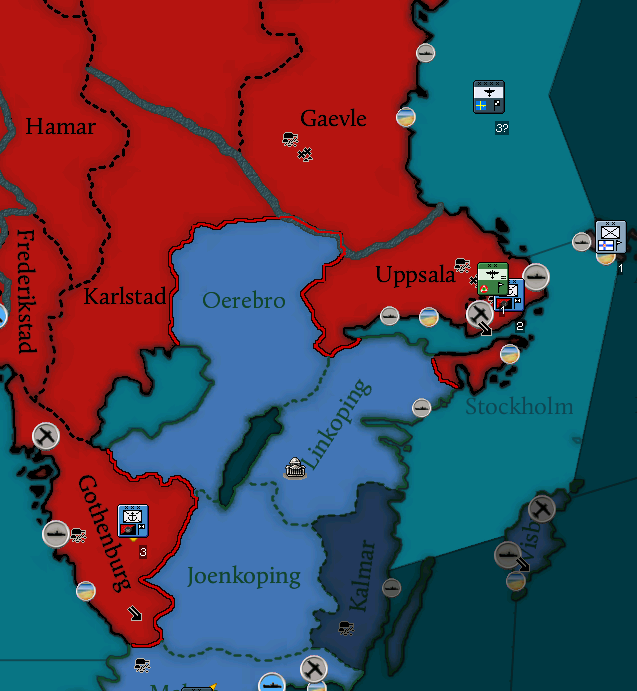
“So that made you angry?”
“Of course it did! The Republican Army resented us ever since Torch, because that’s when we became France’s best pals. They wanted us to fail. That northern front should have been open long before we did it, but instead they invaded goddamn Mallorca, like anybody gives a shit about Mallorca. They never wanted to help us because they were only in it for themselves. Once American blood was shed in Scandinavia, they knew that Scandinavia was going to be in our corner after the war, just like the Middle East, just like Africa. That’s why they tried the stunt in Oslo, to try and get what they believed they were owed, which was post war influence in Scandinavia. Of course, the second our troops landed, there was no shot that Scandinavia wasn’t going to be under our umbrella. That’s why Gitlow put his foot down and forced the British to retract. The Republican Army was looking for some power and glory, and they hadn’t earned any, and no chance we were going to let them steal ours.”
“I had never heard that they were supposed to send divisions.”
“No, because Marshall and Gitlow didn’t want another scene after Oslo. The whole thing was suppressed and forgotten about.”

“We had gotten Sweden by that point, and everything was so close to over, so I don’t blame them for that.”


I was still writing down all of this information when Liffland piped up again.
“Remember that Denmark was neutral. They never joined the Pact until the British attacked their shipping and declared war. Again, I don’t know this but I’m sure the British had their eyes on the Baltic. If the Mediterranean was to be America’s domain, then they wanted the Baltic.”
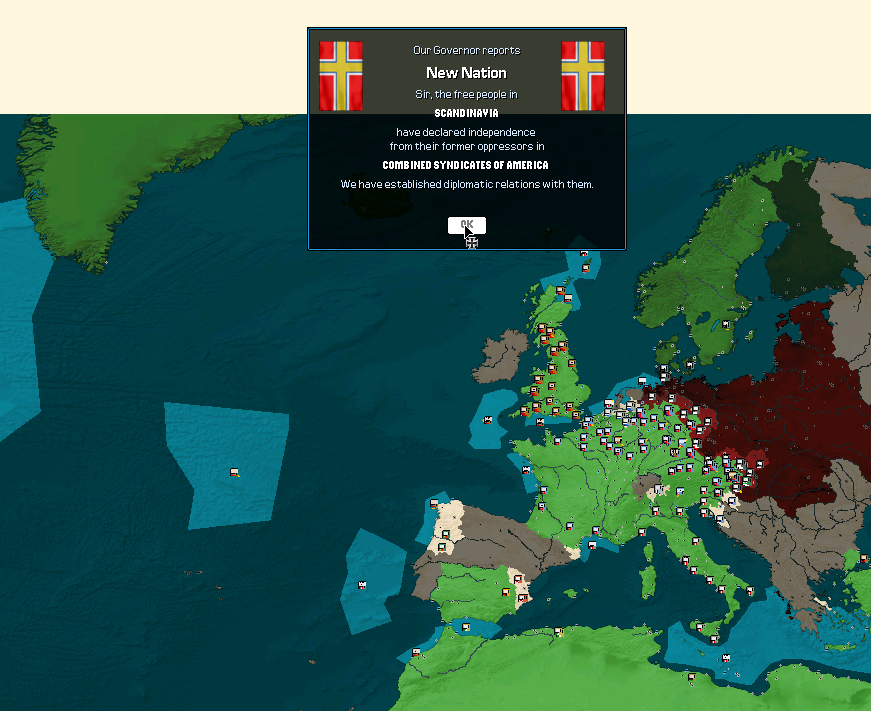
I had put the dots together by this point.
“So they were upset that Scandinavia was put together without their involvement?”
“Yep. Absolutely. Not that I feel the slightest bit of sympathy for them. They could have done it themselves at any time and I’d be the first to congratulate them.
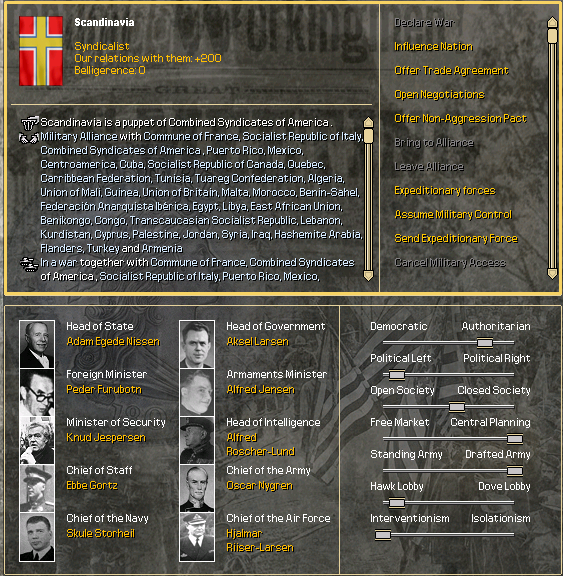
He was onto something, for sure. Scandinavia had become one of the most pro-American voices in the European Union in the past few years, second perhaps only to Italy. Britain, by contrast, had almost no friends in the Union.

“Thank you, Comrade Liffland.”
Liffland looked up at me, all the earlier contempt gone from his eyes.
“One more thing, Parks. I know it’s been a while but I’m sure you remember what the Commission was formed to investigate, even if you’re here asking me about Scandinavia of all the damn things in the world.”
“Well yes, of course I remember.”
“Well, I’ll tell you that you’re onto something asking me about all this, but believe me the takeaway from Scandinavia isn’t that our working relationship deteriorated. Just think that Britain had, over and over, been shown up by the Americans. The Americans landed in Africa, the Americans put an end to the Ottomans, the Americans took over Rome and crossed the Alps. But that was all to the south. In Scandinavia, we went right into their neighborhood and did their job for them. We threw the Germans out of port, and it was our Navy who had the final triumphant victory, and not theirs.”
“What are you getting at, Comrade?”
“America had clearly supplanted them, and they must have felt like they were in danger of being rendered irrelevant. So eventually, they resorted to the one thing that would force the world, socialists and capitalists alike, to recognize their power. So maybe this wouldn’t have happened if we had tried harder to include them, but that’s the benefit of hindsight. And really, they were such a mess that we had to do what we did. But if we had known what could have happened, I guess maybe we’d have thought differently than we did.”
“I see.”
“I’m not sure you do, but that’s not my problem. Go home, Comrade, and tell your Commission the truth about the whole thing.”
I stood up and shook his hand and turned to leave, but then paused.
“Comrade Liffland, out of curiosity, what would you say to the Commission in my shoes?”
Liffland said nothing for a few seconds, thinking about it.”
“I’d tell them that both America and Britain fucked some things up and a lot of things happened because of it that many of us regret.”
“Then that’s what I’ll tell them, Comrade Liffland.”
I walked to the door and opened it.
“And also that we did our best.”
I looked back at Liffland after he said that, and watched him pour himself another drink. He clearly had some memories he needed to be alone with.
“And the world appreciates it, even if it doesn’t always seem that way. Good bye, Comrade.”
I closed the door behind me and walked over to the Marines.
“Comrade Parks, the General has authorized us to offer you use of our facilities if you’d like to eat and take a shower.”
“Please thank him for me, but I must decline. I should get back to Istanbul as soon as possible.”
“Very well, Comrade. Please follow me.”
I had gotten everything I needed from Liffland, and the trek had been worthwhile, but now my mind was racing, and the sooner I could get back to Chicago the better. I suspected that Liffland’s supposition about the British was entirely correct, and proceeding with that paradigm would bring our investigation into its most fruitful period.
-
Chapter Twenty Four: Some Things Don’t Ever Change (Middle East: September 23 – November 28, 1943)
Harry opened the Vanguard, greeted as always by its proud declaration that it was the LARGEST INDEPENDENT MILITARY NEWSPAPER IN THE WORLD. It wasn’t entirely independent, like the other newspapers published for military consumption, it had to be filtered through the Army apparatus, ostensibly for purposes of operational security. It appeared that the censors exhibited restraint with their power, though, as critical editorials were left alone. It was the thinking soldier’s paper, as opposed to the official outlets that served mainly as propaganda and diversion, trumpeting victories and honoring heroes across all the fronts. Harry didn’t begrudge the official paper’s readers, though. Everybody had different needs to keep it together, this far from home, this far into the war.

The cover story was a tough one to take. The Transcaucasian Socialist Republic, the bastard stepchild of the world revolution, long ignored by the syndicalist mainstream, had come into the fold.

The Vanguard had reported on rumors for months that the TCSR was engaging in nefarious schemes all over the Caucasus and Middle East. The way they told it, the TCSR was run by the lowest of the low. Rather than the noble syndicalists and anarchists who went to Paris, the Makhnos of the world, the TCSR was supposedly the haven for the dirt worst of the Russian Revolution. The Vanguard had always taken an anti-Totalist stance, so Harry wouldn’t be surprised if they were exaggerating, at least a little bit.

“Can you believe this, Joe?”

“Of course I can.”
Harry read on. The double punch came later. American troops were rumored to be involved in what the Vanguard speculated was the TCSR’s price in the deal that was made. The takeover of Armenia and Azerbaijan. Harry was surprised that that made it through the censors.

“But why would they do this, Joe?”

“Because America, for all that it says, is a great power, and they’re gonna do what great powers do. They sold out the Caucasus so that the TCSR wouldn’t interfere in the Middle East. Deal with the devil. May be the best thing for the most people, could be horrible, I don’t know.”


“Isn’t it callous to make that kind of deal? Anti-revolutionary? Un-American?”
This cracked Joe up.
“Un-American? Have you ever read a history book? We’re talking about seven years of revolution and hundreds of brutalities. If you think that can all wash away in a few years, then you’re full of shit, Harry.”

“Joe, I think you’re wrong. I believe in the revolution.”


“I only believe in myself and the people who stood up for me. America has fucked me and my people forever, and now it tells us to believe in it. Go ask the Azerbaijanis what America’s word counts for.”

Harry was perturbed by Joe’s words. He couldn’t focus on the paper any longer.
“I just- I don’t know.”
“Listen, Harry. America is probably the most powerful nation to ever exist, except the Romans maybe, and I guarantee half of the people back home don’t give a goddamn about some people they’ve never met in some shithole caught up in our ‘revolution’. Some people have a voice, others don’t. A hundred thousand years of human brutality won’t be undone in a decade, the simple equation that the most vulnerable suffer the will of the powerful will not change. You’re not helping anybody if you believe otherwise. The revolution, Harry, is not over. It will never be over. It’s just that the enemy will be ourselves.”

“I think you’re wrong.”
Joe stood to his feet with a start.
“Then fucking prove me wrong, Harry! Why should I believe they’d treat me any better than those poor Muslim bastards in Baku, if it was convenient for them? Do you think they’d let one goddamn black man in this army if Hoover hadn’t fucked up your lives? Just because you flipped a switch and realized what a mean world this is doesn’t mean the rest of us haven’t known it forever! If you want this fucking country to do better, then get your head out of your ass and make it do better!”
Joe turned and left without another word, leaving Harry alone with his newspaper and his thoughts. Harry couldn’t help but think back a mere ten years, when the black folks lived in another neighborhood that was practically another planet. Harry, like so many others, had only recently bought into the idea that humanity was one large family, united through struggle. But the truth of the matter is that the alliance between the white and the black worker was truly forged in a time when the nascent socialist uprising was desperate to expand its reach beyond the most radical of Northeast and Midwest union halls. They had lent their arms to the fight, and more importantly, put their faith in the Combined Syndicates.
Now, the world was being asked to put their faith into America. Harry was no longer sure if America deserved it.
-
Chapter Twenty Three: The Last Sultan (Turkey: September 7 - October 25, 1943)
Major Erik Vogt had worked very hard and put in a lot of years to make it to this level. He was the lead military attaché for the German Army in the Ottoman Empire, an important position that would surely give him an opportunity to prove himself and make progress towards a colonelcy, then a generalship. That was the plan in 1941, when the future of the German Army officer corps was something worth worrying about. In 1942, with the future of the German nation in doubt, not many of his superiors were concerned with succession planning.
His father-in-law made his situation worse when he attempted to flee Germany for Finland. He stole an array of technical documents from the airplane factory he was part owner of, with the intent to hand them over to the Finnish military in exchange for asylum. If the Germans had known about this, it would have been an enormous scandal, and Erik’s career would have been over. The Germans did not know about it, they thought that his father in law had been kidnapped. He used to frequently get messages from Berlin updating him on the investigation into his disappearance. Now that the Germans had lost Saarbrücken, the site of the factory, the investigation was ruled inconclusive and forgotten.
Not that he needed anybody to tell him who took his father-in-law. He already knew. A few months after the war began, he was approached by a mysterious Turkish man, who notified him that his father in law was in British custody. His father-in-law’s Finnish contacts who were supposed to transport him to Helsinki delivered him to a British Intelligence base in that most famous of wartime espionage hubs: Amsterdam. Whether the Finns were paid off or coerced in some way he didn’t know.
At any rate, the deal the stranger offered was simple. If he acted as a British agent, they would organize passage to America for his whole family. If he didn’t, they would send his father-in-law back to Germany with the evidence of his treason, and his family would be ruined. He was given two days to decide.

He eventually decided to cooperate, with the justification that even if he tried to help the Ottomans in good faith, it wouldn’t make any difference. Feeding the Ottomans bad information wouldn’t matter if they weren’t even capable of putting good information to proper use. And God knows they couldn’t.

After the catastrophe at the canal, Erik convinced his handler to give him accurate information about American positions in Syria to bolster the Ottomans’ confidence in him. This occurred after he had proven that the Ottomans couldn’t actually do anything with good information in their current state. It was after this point that Erik began hearing a lot more of “I told you the Major was right!” while the generals were bickering in the war room.

The defeat at the canal had proven to be such a shock to the Ottoman Empire that it now found itself incapable of mounting any kind of meaningful resistance. The Arab territories had been overrun by the Americans, and what forces the Empire could muster were so undersupplied and demoralized that they were swept away without much trouble, even when they outnumbered the Americans.

And so Erik’s situation became easier to manage. Before the canal, he was on uneasy terrain, his handlers wouldn’t give him accurate information, and he was expected by the High Command to deliver the intelligence they gave him to the proper people, who also didn’t trust him. Then, he was trying to confuse the efforts of the Empire to repel the coming attack. Now, the confusion had run far past anybody’s ability to stop it.

However, the fact that he hadn’t been pulled out yet meant that the British must have still had plans for him. The Ottoman state was so porous and inept in its current state of collapse that they didn’t need him in Istanbul to know where the enemy was. They already knew what the state was up to, they knew where all the major players were and knew the details of their petty schemes against one another.
About a month before everything hit the fan, his handler informed him he was going to have company. First his handler sent prostitutes to his quarters and commanded him to have sex with them, lest rumors go around about the strange German who hires prostitutes and then refuses what he paid for. This was a regrettable circumstance and Erik had to put his wife out of his mind on those nights. Only in the bizarre circumstances of this war could a man sincerely and honestly say that he was cheating on his wife for her sake. His lofty ambitions for his military career were all gone. A simple life with his family in Wisconsin or some such place seemed utopian relative to all of this. He had read the phrase “lie back and think of England” at one point. Now he was getting on top and thinking of New England.

Returning from a war council at the Sublime Porte one night, he waited and waited for his next awkward tryst. A young Turkish woman entered his quarters that night. She had a more serious look to her than any of the women before.
“I’m not a whore.”
“Pardon?”
“You heard me. I’m the one you were told about.”
The whole point of the prostitution ruse was that one “prostitute” would become his favorite and thus have an excuse to spend every night with him without anybody raising an eyebrow. In this misogynistic and patriarchal environment, men away from their wives were practically expected to partake in the “local fare”. In reality, this new woman was a veteran of underground Turkish socialist groups. Before the war, she was organizing strikes and dodging the police. Once the war began, she was recruited to spy and operate for the British. She gave her name as Yasemin. What her real name was, Erik would never know.
Each night after that, she came and got intelligence from him then gave him his direction for the next day. That business usually took 20 minutes, then she would stay the night. She was always gone in the morning, delivering her information to the British, no doubt. The first night Erik relayed that the Pashas were convinced that their Armenian puppet state was about to pledge allegiance to the enemy. This information helped a number of known Armenian socialists and trade unionists get into hiding before the hammer came down on them. Those nights he felt good about ameliorating the chaos in some small way. Other nights he helped the Internationale locate various Ottoman officers and bureaucrats who would then wind up dead. He didn’t feel so good about that.

Yasemin seemed to only want to know the locations of as many important figures in Ottoman society as possible. Yasemin never had much to tell him in return, and so they found out quickly that they really did not like one another. They tried to play chess to pass the time, but Yasemin turned out to be a far superior player than Erik to the point where it wasn’t even enjoyable. She then began arriving with books to read, books he suspected she paid for with the money that had started to go missing from his things. He was hardly in a position to protest, so instead he began drinking in order to quiet his anxieties enough to get some precious hours of sleep.
Erik could not stop thinking about something Yasemin said during their first few days together. She had walloped him for the third time in a row, and then said:
“Your endgame needs work. And not just in chess.”
It was true. Erik had become nothing but a pawn, hoping to God that his handlers were sincere in what they had promised him. He knew nothing about how he was going to navigate the imminent demise of the Empire. And he was fooling himself if he thought the British would bat an eye about sending him to be killed by a Pasha’s men, or if desperate Ottoman politicians wouldn’t have him shot merely on suspicion of being a part of a rival’s camp. The day of reckoning was coming, not just for the Empire, but for him as well.

He knew it was upon him when the news came to the war room at the Sublime Porte. A large American fleet had been spotted sailing north through the Aegean, towards a familiar destination. In a properly functioning government, somebody would have been prepared for this and began to make moves to counteract the invaders. In this decaying husk of a formerly glorious power, the generals began blaming one another.

By the time the shells began falling in Gallipoli, Istanbul had imploded. The underground socialist groups came out in force, whether because the news leaked out of the government, or because they were tipped off by people like Yasmine. The city was paralyzed, and everybody of importance was now planning their escape or their last stand.

This was not 1915 and there was nothing resembling the stiff resistance the Ottomans had put up once before. The troops who were supposed to man the fortifications had either abandoned their posts or been diverted to some other pointless front. The Americans simply walked ashore. In the hubbub, it was difficult to move around, lest some rebels decide to bag themselves a German. Yasmine no longer came at night and instead delivered her messages to him in the palace through a sympathetic harem girl.
The Americans were expected to arrive in the city in just a few days, and the war room was now a barren place. The Sultan remained, and only a few loyalists stayed with him. The Pashas had departed to parts unknown, while Yasmine and her cohorts were endeavoring to abduct them. Erik was given the job of locating and “securing” the Sultan.
The Internationale, in this time of war, always strived for a smooth transition. Rounding up anybody who could lead a counter-revolution and anybody who could be scapegoated for the problems of the needy and battered populace was probably on page 3 of the syndicalist handbook. The Sultan and the Pashas would be offered up on the altar of progress. Erik put this out of mind as he stole through the palace trying to find him. Finally, he heard two voices in a room and cracked the door open.

His Imperial Majesty the Commander of the Faithful on Earth, Caliph of the Faithful and the Servant of Mecca and Medina, Sovereign of the Imperial House of Osman Abdülmecid II was sitting next to an easel, painting a landscape of the Istanbul skyline. The constant machinations of his theoretical servants had clearly aged him, and now it seemed like the war would put him in the grave, whether through stress or hanging. The painting was about half done, the half of the sky painted so far looked dark and foreboding, with lightning storms that had fire poking through the gaps between the clouds, giving the whole sky a satanic red-orange glow.
“We need to go.”
The source of the voice was not visible, but Erik recognized it. It was the Sultan’s eldest son, Ömer.
“Where to?”
“I don’t know.”



Erik drew a deep breath. He would never be able to forgive himself if he traded the Sultan’s life for a trip to America. The Sultan had only ever been kind to him. He had to try and help him escape. He knocked on the door.
“Yes?”
“Major Vogt.”
“Come in.”
The both of them liked and respected Erik. His being a foreigner helped, as he would be a neutral party in the rivalries between the generals and viziers. If they had only known.
“Your Majesty, I overheard your speaking. I just received intelligence from Berlin that I believe you’ll find of interest.”
It was a white lie. Berlin hadn’t bothered to send him anything except a recommendation that he get to Odessa.

He continued.
“The Americans are going to take over this city, Lesbos, Smyrna and Ankara in a matter of days. They’re coming from all directions.”
“Except north.”
“Yes.”

“Then it’s true. There really is no hope for the Empire. We ought to go to Odess-”
Both the Sultan and his son looked past Erik towards the door. Erik turned around and saw Yasmine with a very nasty expression and a very nasty MP40 aimed in his direction. Which scared him more was hard to say.
“I should have expected as much from a German. Very interesting information, yes, Your Majesty?”
The last two words were delivered with condescension so thick it could probably stop a bullet from the submachine gun in her hands.
“Major Vogt here didn’t tell you that he got it while working for us, did he?”
The Sultan stood up from his stool and stared Yasmine down. If he was afraid, his eyes did not betray it.
“And who is ‘us’?”
“People who will put an end to your line if you don’t quiet down. The both of you do what I tell you and you’ll be fine.”
She turned back to Erik.
“All you had to do was follow our instructions and everything would have been fine, Erik. You did this to yourself…”
Erik closed his eyes and waited for the inevitable.
*CLICK*
He opened his eyes and saw Yasmine staring at her gun with an expression of disbelief. While his eyes remained open, he has no memory of the few seconds after this. What he does remember is standing over top of Yasmine grasping the MP40 by the barrel and watching her claw at a gaping wound on her neck. A few seconds after that, she was dead.

He turned to face the Sultan. He muttered a few words about a change of heart and began slowly walking towards the door.
“Major.”
He turned back around. It was Ömer, kneeled over top of Yasmine.
“Does the name Göktürk mean anything to you? There is an order here with that name signed to it.”
“Could be her commander. I never knew his name.”
“You have done us wrong, but in the end you did us a kindness, and so we will repay you. Go to this Göktürk and tell him that I shot this woman dead. I will find a way to corroborate such a story. All we ask in exchange is that you tell nobody of where we are going.”
Erik’s ears were ringing but he heard enough to get the gist.
“Yes… Yes, of course.”
“Go now, Major. And peace be upon you.”

The whereabouts of the Last Sultan, a moniker that would grace many popular Turkish books in decades to come, are known up to the day before this incident by mainstream historians. In the midst of the score settling and street fighting of the few days before the Americans pacified the city, the world lost track of Abdülmecid II. The theories are bountiful. He left the palace and masqueraded as a beggar, his escape vessel sank with all hands in the Black Sea, he was kidnapped and “disappeared” by Transcaucasian agents, he died weeks before the landing at Gallipoli and the Pashas didn’t tell anybody for fear of stoking further chaos. Erik would bet that he set foot in Odessa at one point, but he definitely didn’t stay there, and where he went afterwards is as much a mystery to Erik as anybody else.
After he closed the door on the Sultan and his son, he never saw either of them again. He went to his quarters and set them alight, hoping to destroy any evidence that a German was ever here. This was after he covered himself from head to toe in various garments from head to toe, covering any pale skin untanned by the Mediterranean sun and any trace of blond hair that would betray him. He arrived at the palace with a multitude of grand plans and as part of a grand procession, where the Ambassador and a few of Erik’s superiors were welcomed with all the pomp and circumstance one expects from a meeting of two Empires. He left the deserted palace in a ratty disguise in the middle of the night and with no plan whatsoever.

Dawn was breaking in Asia, and Europe was bathed in the rays of a Sun rising on a new Turkey. It revealed a city at its lowest point since 1453, the streets deserted, every door closed and every window barricaded, the dead lying abandoned in the street. Sporadic gunshots could be heard ringing out and as Erik walked east towards the water, he saw a few people peeking out their windows at him. The police and army were nowhere to be seen. As he turned a corner, the majestic Hagia Sophia came into view. A large crowd was assembled around it. Everybody was looking upwards towards one of the minarets. From where Erik was standing, the sun was directly behind it, and so it was impossible to make out what was happening. The crowd erupted in cheers and the sun was suddenly blocked by an enormous red and black banner being unfurled into the wind. It was official, the Empire was dead.
And yet, against all odds, Erik wasn’t. As much as he wanted to kill every socialist in this square for what the British had tried to do to him, he couldn’t let the Internationale take away the few things they left him with. He was still alive and so was his family, at least as far he knew. And he still had hope: hope that Ömer and the British would do what they promised, a hope for a peaceful life, and a flicker of hope that this frightening new world may turn out to be alright. If he let himself be consumed by despair and a desire for suicidal heroism, then his enemies would have won a total victory over him. He adjusted his mask and turned back west. He wasn’t sure where he was headed, but he knew that any home he could ever hope to have was in that direction. And so, he walked.
-
Chapter Twenty Two: Stille Nacht (Austria: July 1, 1943 – February 23, 1944)
The last hour of Rodrigo’s work day was his opportunity to reorganize and regroup, he read his letters and filed documents he had dealt with. Most delegates left this kind of work to assistants, but Rodrigo felt that the process helped him make sense of all the Chamber chaos. More importantly it allowed him to go home with a relatively clear mind. And so he went through his in tray.
It was mostly letters from his constituents and reports about the productivity of the union, everyday things.
The out of the ordinary things this day were a newspaper clipping:
“Former Dakota Growers Syndicate national delegate Leonard Grassley was convicted of profiteering, racketeering, and voter fraud today at civil court in Bismarck. The membership of DGS voted last Thursday to recall and eject Mr. Grassley, 73. Mr. Grassley has been one of the most vocal opponents of the administration’s plan to create a path to American citizenship for Canadian refugees, a key reason why refugees cannot get out of the camps which Mr. Grassley has decried as a blight on his native North Dakota and other border states. A ten-month investigation by the Bismarck Tribune revealed that Mr. Grassley and other conspirators within the Syndicate engaged in a scheme to divert grain from DGS production into the black markets that have thrived in the camps while American aid efforts remain stymied by various obstacles. Mr. Grassley, according to the prosecutor, aimed to stop the aid and citizenship proposals not because of his expressed nationalist views but because they would have put an end to his source of illicit income. A spokesman for DGS denied claims that the syndicate was irreparably corrupt. “What city folk need to understand about rural syndicates is that we aren’t all living close together like they are in Chicago or New York, so we wouldn’t necessarily notice that Grassley was accumulating so much wealth. This isn’t like the Hoffas where everybody in town can see the excess and ignores it. He has no neighbors who could tell he was living so well off of the suffering…” continued on page B4
A wise man had told Rodrigo on his first day in Chicago that having rivals was a dead end, and that a delegate’s only job was to do what was best for the people who sent them there. But Rodrigo couldn’t help but consider Grassley a rival. It seemed as though Leonard’s shit eating grin was always present when Rodrigo ran into difficulty. Rodrigo, born in Mexico, was an Internationalist. Leonard was a Nationalist, and a particularly nasty one at that. Leonard’s sly comments about Rodrigo’s birthplace got under his skin, and so Rodrigo took pleasure in his demise. The DGS considered itself to be a syndicate of forthright and honest people, far removed from the shady business that occasionally went down in the urban industries. The farmers of the Dakotas would take this personally, and Grassley would never be able to show his face in either state again.
The next item in his in box would melt all that schadenfreude right away. It was from his son.
“Pop,
Rafaela has an assignment for Sunday school about Christmas. I did all the religious stuff myself because I know how you feel about it but I did tell her about the Austria story. If you could answer these questions for her, she would really appreciate it. Can’t wait to see you down here next month, Pop.
Pedro”
Stapled to the letter was one page of a workbook titled “My Favorite Christmas”.
“What year was your favorite Christmas?”
1943.
“Where were you?”

Klagenfurt, Austria.
“Who was with you?”

Some of the names came to Rodrigo quickly, others he couldn’t remember. He had a picture somewhere of the event, but couldn’t remember which shelf in his office it was on. He set his pen down and got up to find it. It was behind his plaque for serving 15 years in the Chamber.
The names were listed at the bottom, but the faces brought back immediate memories.
Rodrigo
George
Gustavo
Joanna
Klaus
The young dark haired man with a scar across his cheek on the left was most familiar. It was him, of course. The scar had healed enough that he was once again handsome, though with a more rugged look than before, thanks to the wear of battle and a shortage of razors. There were a few pictures around in between the time of Rocky and this picture that showed him looking quite grotesque. Thankfully, the march from Venice to the Alps had not brought any further near death experiences.

With his arm around Rodrigo was an older man with a grizzled look. The easiest thing to notice on his uniform was the Texas Ranger badge pinned to his chest. That was George. Rodrigo couldn’t remember exactly when he first met George, but it was around the time that the cross-national personnel transfers started. The Mexican army had a shortage of anti-tank capability, and with more and more German tanks showing up, the Americans sent over guys like George who knew how to operate anti-tank weaponry.

George and Rodrigo hadn’t gotten along at first. Rodrigo’s English was the best in his unit and so he did most of the talking to George, who stubbornly refused to speak Spanish, at least beyond a few patronizing and purposefully misconjugated phrases. Rodrigo attempted to identify with him by telling him that he had planned on moving to Texas during the Mexican occupation, which was a big mistake. George hadn’t been a part of the actual Texas Rangers prior to the civil war, but joined up with one of the many paramilitary and guerilla outfits that popped up after the Mexican Army invaded Texas. Many of the ad hoc Rangers units were nothing more than white supremacist groups engaging in reprisals against Mexican civilians, though many others were legitimate liberation fighters. The latter group had proved vital during the syndicalist reconquest of Texas. Which half George had been in was unclear, and Rodrigo didn’t particularly want to know. They found a way to work together, which they needed to, because the German tanks were not going to repel themselves.

That had changed by October. After months of battle, what would end up being the final push towards Klagenfurt started in earnest. Rodrigo and George had become friendlier with every German truck and tank they took out together.

By the time Klagenfurt fell, George had gotten rid of the chip on his shoulder about Mexicans, and Rodrigo had to admit he was an intelligent and resourceful guy. George was even trying to convince him to move to Texas and work on the oil rigs with him.

Rodrigo used to sit and listen when George would weave plans for the future, usually depending on whatever was around at the time. When they were in the mountains, he was going to move to Austria and open a ski resort. When the bombers flew overhead, he was going to learn to be a pilot.

The short and stocky man next to George clapping his hands was Gustavo. He was even older than George, well into his fifties. The Italians had drafted just about every man in the country trying to match the deployable strength of the departed Federation. Gustavo was good natured and spoke barely any English. He would have arrived in Klagenfurt a few weeks before George and Rodrigo did.

Klagenfurt had become the nexus of what would become a unified front stretching from the North Sea to the Adriatic. Armies from north and south were staging around Klagenfurt in preparation for maneuvers to the east, towards Vienna. Gustavo was among them.

Next to Gustavo was a young blond haired woman, who exuded a photogenic vitality that would belong with the many posters of female soldiers that were popular with young women these days. She had all the ingredients: a confident smile, a beret cocked slightly to one side, her hair tied back in a ponytail, and her head held high as if ready to battle the entire world. None of the press photographers had seen her apparently, because otherwise she would have been on dormitory walls like the rest of the feminist icons of the war.
That was Joanna. Seeing her face brought back many memories. The most recent of those memories was at the big Internationalist rally in New Jersey last year. His good friend Tony Leone was railing against the Nationalists’ recent habit of smearing foreign born delegates, like Rodrigo.
“They’re going on and on about decency? Rodrigo here, he fought for our revolution, he damn near died for our revolution, he came to this country and has served the oilmen of Texas loyally for eighteen years. He’s so goddamn decent, he’s only ever slept with one broad!”
The crude remark elicited a roar of laughter and approval from the crowd of Teamsters at Mara Field. Rodrigo knew that Leone was playing to his crowd, but was embarrassed nonetheless. People assumed it was because he was private and prude, but really it was because, to his shame, what Leone said wasn’t true.
Joanna and Rodrigo met on Christmas Eve on a narrow street in Klagenfurt. Joanna was hanging up signs that read:
Frohe Weihnachten
Joyeux Noël
Merry Christmas
Feliz Navidad
Buon Natale
The French, with the approval and cooperation of General Rose, were organizing a Christmas celebration for the soldiers and a handful of the locals who were putting together a new local government after the collapse of German authority. Rodrigo accompanied Joanna on the remainder of her rounds, as she was the first French soldier he met who had fought in France, Flanders and Germany proper. She was a sniper for the Communal Army, and so they traded war stories, of Italy and Flanders. After over a year of war, she was happy to have a task that didn’t involve shooting people in the head. It was going to be a long march into Eastern Europe, and everybody needed a moment of joy before their units set off in the coming weeks. Joanna, like Rodrigo, was an atheist, but she felt that Christmas was as good an occasion as any other, particularly in the midst of war.
Towards the end of her rounds, they met the fifth and final subject of the Christmas photo: Klaus, a local socialist, who had spent months feeding information to Syndintern command and was now finally able to openly declare his support for the revolution. He was involved in the nascent city government and was eager to impress his “liberators”.
The trilingual dance between the three of them was somewhat torturous but Rodrigo was able to garner that the city’s elite didn’t believe the Syndintern would ever make it past the mountains. When the Rocky landings threw the Federation into crisis, the city panicked that they would be captured within weeks and nearly everyone with the means fled to Vienna. Klaus didn’t want any looting, but knew a few choice spots where a few luxury items could be “procured” for the evening’s festivities.
The party started around six thirty at the Landhaus. Joanna coaxed Rodrigo into dancing with her. Men with video cameras arrived not long after, probably to record the celebration for distribution as propaganda. The Germans had taken to telling their citizens that the syndicalists were going to burn their churches and rape all the nuns and other such lurid things, so footage of Austrians and Syndintern soldiers celebrating Christmas together would be helpful. Nonetheless, it made Rodrigo uneasy.
“Joanna, I have to tell you, I’ve a girl waiting at home for me.”
“And I have a husband on a destroyer in the North Sea. What’s the difference?”
“Still, I’d rather not have her see me on a newsreel.”
Joanna sighed and dragged him away from the cameras by his hand.
“Where are we going?”
“To find something good.”
The pair left the Landhaus out to the neighboring park, where a giant group of soldiers were watching two men, who appeared to be a Frenchman and an American, have an impromptu wrestling match. Joanna barely stopped to register it and instead dragged Rodrigo into a nondescript building across the street.
She produced a key, apparently from Klaus, that unlocked the building. When the door opened, Rodrigo’s jaw dropped at the opulent decoration.
“What is this place?”
“Klaus says the bourgeoisie of the province would come here to drink fine wines and fuck prostitutes after conducting their business in the city. It’s bound to have something worthwhile.”
They made their way down to the wine cellar, which appeared empty, but Joanna seemed to know where to look. There was a false panel, and behind it was an array of bottles, bearing the markings of various wine-making syndicates in France and southern Italy.
“Naughty, naughty bourgeoisie. They would never let any embargo get in between them and the very best wines.”
She chose a bottle marked with the name of some village in Burgundy from the cabinet, popped the cork, and poured two glasses of the best wine Rodrigo has ever had. Perhaps the sheer quality is what enticed him to make the regrettable decision that followed.
And to make it again. And again. And once more in the morning.
Rodrigo, in the present, mind you, shook his head. Rafaela’s catechist certainly did not need to know about that part of the story. All he needed to do was write who was there on Christmas Day.
George, an American
Gustavo, an Italian
Joanna, from France
Klaus, an Austrian
The next question, what were you most grateful for on that day?
He was half tempted to write penicillin, but took a moment to compose a more appropriate response:
A moment of respite and joy from an otherwise terrible and taxing war, as well as the opportunity to meet good people from all over the world.
Easy enough.
Next question: Why was that Christmas so special to you?

That was a harder question to answer. Rodrigo had to imagine that most of the other children’s parents and grandparents would write about how wonderful it was to see their children growing up or to be loved by their own parents. The Austrian Christmas was spent with strangers, essentially, ships passing in the night. It had been a coincidence that Christmas fell when all of their units were regrouping in Klagenfurt. Within ten days, all of the units were gone, and of the people he spent that Christmas with, George was the only one he would ever see again.
That picture he had was really just a coincidental thing. George was trying to find Rodrigo in order to warn him that his commanding officer was ready to kill him; Rodrigo and Joanna emerged from their den of sin; Gustavo had heard the rumors of what Rodrigo was up to and thought it’d be funny to applaud him when he emerged; and Klaus wanted to know if Joanna had found the smuggled wine stores. Somebody happened to take a picture when the five of them converged in front of the Christmas tree in the park. That moment, captured in a photograph, seemed as though it had been the whole day in a way, just like that night and day, captured in Rodrigo’s memory, seemed so much larger than any other day of Rodrigo’s service, except perhaps when he almost died.

Joanna went back to her unit’s camp to the north of the city. Rodrigo had done some research on her during a Chamber trip to France. Her unit struck out to the north in the direction of Linz and Bohemia. She ended up with a few commendations and even qualified for the French shooting team at the ’52 Spartakiade, though she didn’t medal.

George and Rodrigo continued on a path towards Vienna and Hungary, by way of Graz. The action was far less intense than it had been in Italy, as French armor overtook the OAS infantry and thus a lot of the responsibility for the fighting.

Gustavo would have stayed in Klagenfurt, probably. The Italian army had the responsibility of keeping together a nation that had doubled in size and absorbed its mortal enemy, not to mention occupying Slovenia and parts of Austria. The OAS divisions moved on without the Italians. Rodrigo never learned his last name so it was impossible to learn what happened to him. He was probably dead by now, hopefully of old age.

Christmas had been a bright spot. Before Christmas was intense battle across a static front. After Christmas, the front was finally moving, but the weather was nasty and cold, and snowfall made Rodrigo and George’s job miserable.

The people in those photo were just five of well over a million who fought in Austria. Their experiences and sins and sacrifices were a minuscule part of a front that was just one part of a broader conflict. In that enormous context, it was difficult to feel as though one mattered as an individual.


The little things that kept people going, like a coming Christmas holiday or the possibility of seeing one of the great cities of Europe in person, turned out to come true or not, depending on the vagaries of war. The decisions of people Rodrigo didn’t know with a healthy dose of pure chance meant he would never actually see Vienna like he hoped he would.

However, Austria had given him, in the midst of dehumanization and brutality, one night in which he really felt like a man. Not in a simplistically sexual way, but more in the sense that he got an opportunity to revel with friends, to engage in a dalliance with a beautiful woman, to experience luxuries and delights not many people could, the little thrills and frustrations that make up the spice of a normal person’s life. In the midst of a year that would challenge every aspect of his humanity, there was one day when he was able to feel like a regular person. That is why that Christmas was so special to him.
Now he just needed to figure out how to fit that answer onto the three lines provided by the worksheet.
-
Chapter Twenty One: Mission Accomplished (Middle East: August-October 1943)
Newsreel produced by Los Angeles Bureau of Filmmakers using footage provided by the American Red Army. Released to public September 4, 1943.

RED ARMY RACES THROUGH TRANSJORDAN

Trucks with smiling and confident soldiers hanging on drive down a desert road.
It’s only been a few weeks since over three hundred thousand Turks surrendered in the Sinai, and now the whole of the Ottoman colonies in the Middle East are ripe for liberation!

Twin engine bombers fly over a coastal city and drop bombs.
A few Turks escaped the brilliant amphibious assault carried out by our soldiers a month ago, but our fliers won’t let them go that easily.


A column of surrendered Ottoman soldiers walk down a street with Quebecois soldiers standing guard.
These ones here tried to make it back north, but before they even knew what was happening their escape route was cut off by the rapid advance of General Law, which made it easy for the boys from Quebec to take them out of the equation.

Columns of soldiers, including a few tanks, probably Canadian, move down the road.
Half a million North American and Egyptian soldiers follow in Law’s footsteps, or tread marks we ought to say, ready to bring liberty to lands occupied by the Turks for centuries. General Law is already hundreds of miles further inland, with Baghdad in his sights.


A map appears showing a large arrow sweeping from Jerusalem all the way to Baghdad. Much smaller symbols with the Ottoman star and crescent represent the opposing forces.
There’s still a few Turks to deal with, but the Sultan hasn’t a prayer now!

It’s smooth sailing all the way to the Bosphorus from here on out!
------------------------------------------------
From an editorial in the October 24, 1956 edition of the Chicago Proletarian.
An Appeal for Calm and Clear Memory
There has been a great deal of panic and discontent across America over the last few months, and much of it is understandable. 1956 has been a poor year for the syndicalist mainstream, at least in terms of prestige and image. The twentieth Revolution Day, approaching in just a few weeks, looks like it will be a much more muted affair than the tenth was, when a triumphant America celebrated total victory over the Prague Pact. The many buildings and monuments dedicated that year are just now showing signs of age, the shine and luster of the many plaques and statues bearing the date November 11, 1946 somewhat dulled.
The last ten years of Franco-American dominance, nicknamed the Biarchy by Delegate Rustin in a recent Chamber speech, have been kind to the general welfare of the Syndintern. The data does not lie: the Marshall Plan has been a resounding success, erasing the scars of revolution and war in North America and Europe, and upgrading and expanding colonial-era infrastructure in Africa and syndicalist Asia. The condition of the average human in the free world is improving dramatically as you read this. Lost in all of the pessimist news recently was the announcement of campaigns to eradicate polio and smallpox by 1960. Much of the discussion chooses to focus on all the nations that will likely refuse to allow Syndintern health personnel in their borders, thus making eradication “impossible in the current political climate”, according to a quite pessimistic statement put out by the eternally dour Delegate Foster.
Such are the kinds of perspectives one finds in this current atmosphere. Despite the unprecedented pace of progress, America is beset by a sense that we are losing ground in a political sense, that the achievements of other non-socialist states signal that we are no longer as great as we were during the triumphal times of 1946. Combine this contrast with the constant controversy over almost every foreign situation the so-called Biarchy has involved itself in since then, and it is easy to understand where the malaise comes from.
Nobody is obligated to feel positively about the current state of affairs, indeed we all have a right to think the way we want. However, there is a troubling trend where recent events are being blamed on the decisions and actions of the Syndintern during the war in such a way where it should have been obvious to the decision makers that things would go wrong. This is simply wrong and irrational.
Consider Iraq, for instance, one of the nations Comrade Makhno referred to as a “people’s march” on the periphery of the free world, a group that also includes the Bhartiya Commune and Bolivia. Iraq has been beset by problems lately, so much so that they advised the International Council of Sport that an alternate may be required for the 1960 Spartakiade, currently scheduled to take place in Baghdad. So bad does the situation seem that the Iraqi Trade Union Congress doesn’t seem confident it can keep an event in its capital safe four years from now. This is not a country that sees itself going through a temporary crisis, but rather one that sees itself up against a long term threat.
There are many reasons why Iraq is in the situation it is now, many of them can be attributed to America. It is a complex discussion, and one with the time and willingness to learn can avail themselves of many fine positions on the matter at the international newspaper section of their local library. What we shall concern ourselves with are the overly simplistic and oft repeated claims that all of Iraq’s problems would be avoided if America had only done one thing differently, usually something similar to what the aspiring historian wishes to be done now.
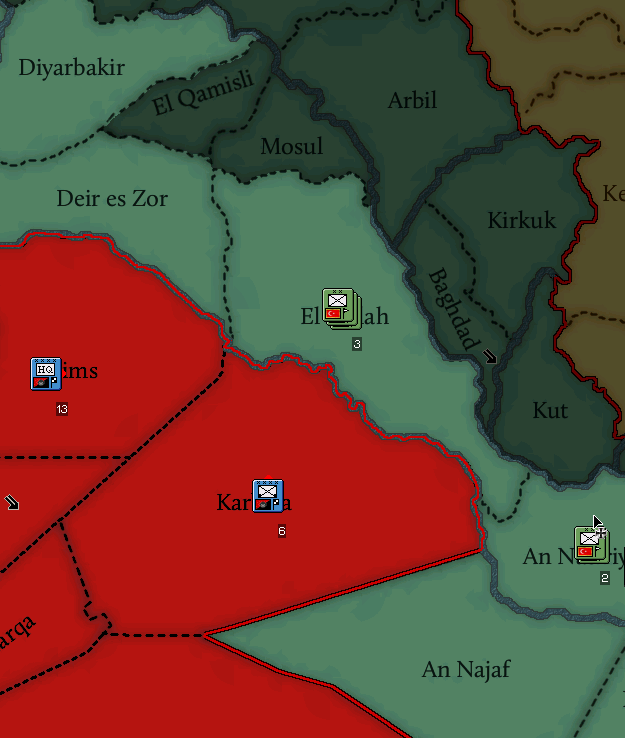
Some would have you believe that the invasion of Iraq was a rushed and chaotic mess, to be blamed on glory whoring commanders eager to see their names in the headlines of this and other newspapers back home.
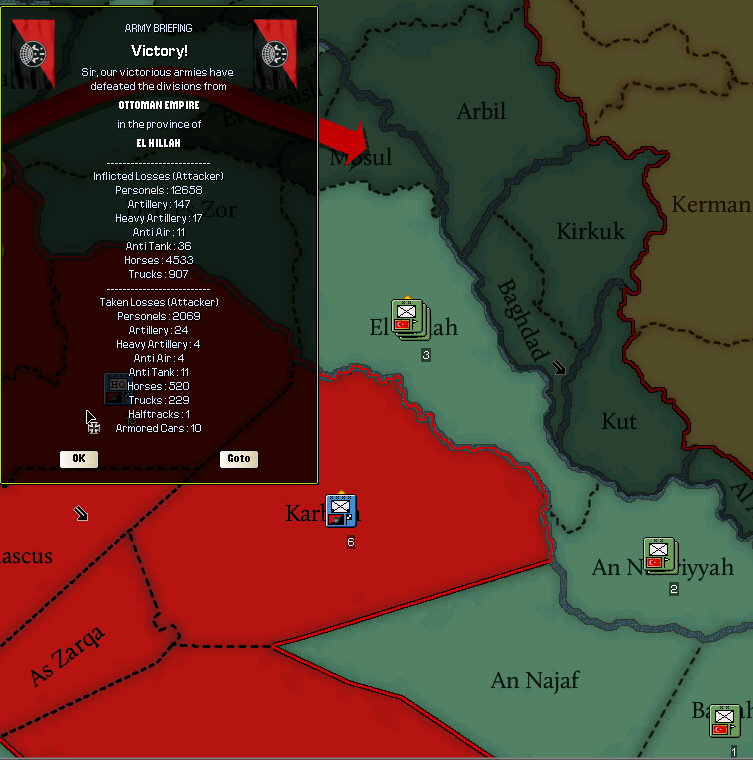
In fact, there’s nothing about the operation that would distinguish it from any other of the “clean-up” operations of the war. The goal of the operation was to chase down and eliminate the threat posed by what was left of the Ottoman Army, just like the goal of Operation Rocky was to eliminate the threat posed by the Italian Army, so on and so forth.
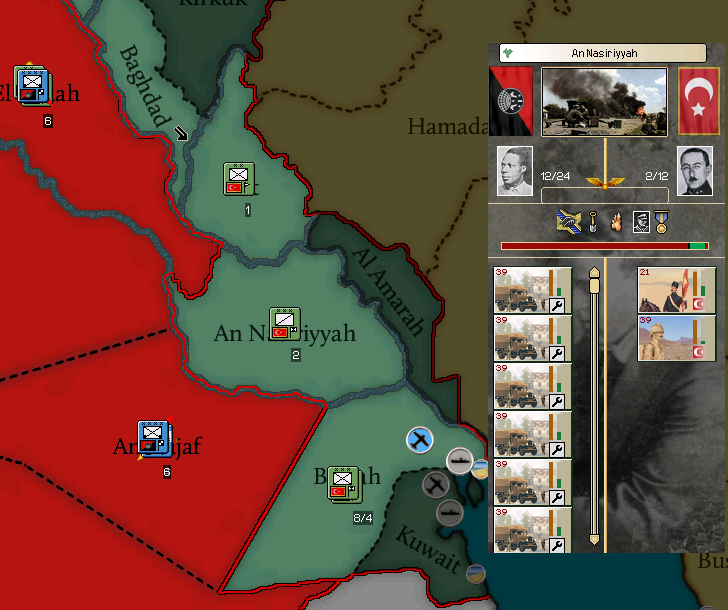
A delegate who will remain unnamed in this editorial, as naming them would serve to advance their seemingly bottomless need for attention, made the ludicrous statement during a hearing last week that being involved in the invasion of Iraq should disqualify Oliver Law from being Supreme Commander. This condition would also disqualify George Marshall.
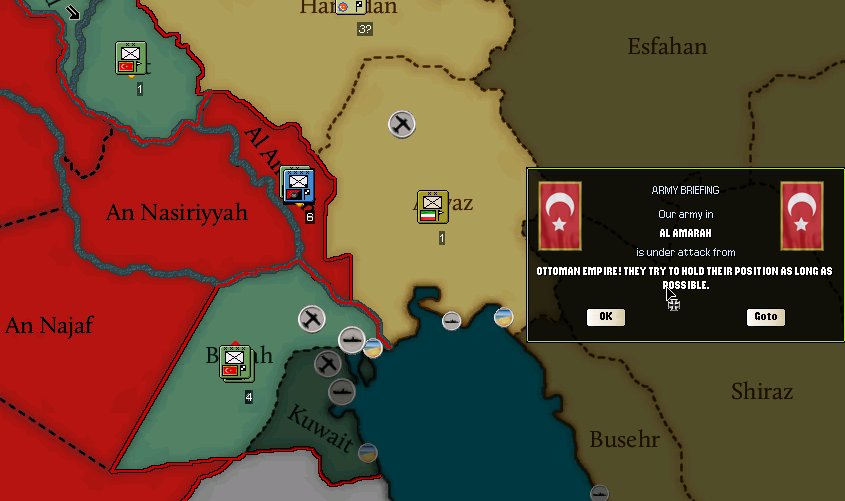
The decisions made in Iraq were meant to hasten the end of the Middle Eastern Front, plain and simple. Considerations about the post war position of the Muslim Brotherhood or Turkestan were far behind the most pressing issue on every Syndintern planner’s mind: saving the Commune from German breakthrough. The forces rampaging across the Middle East were needed to assault the core of the Prague Pact from every direction.
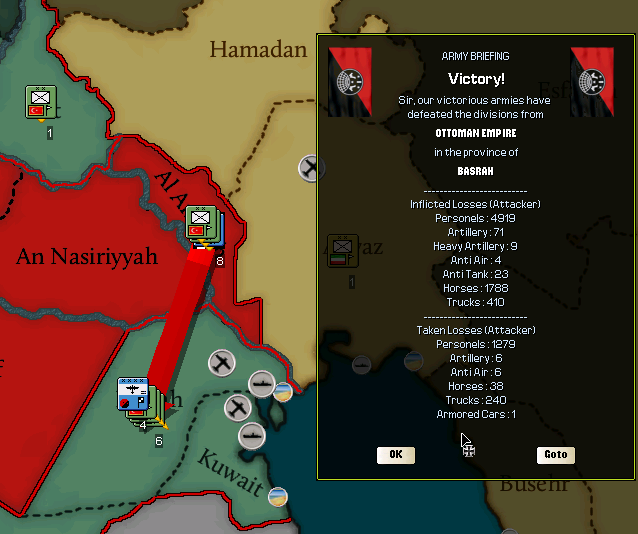
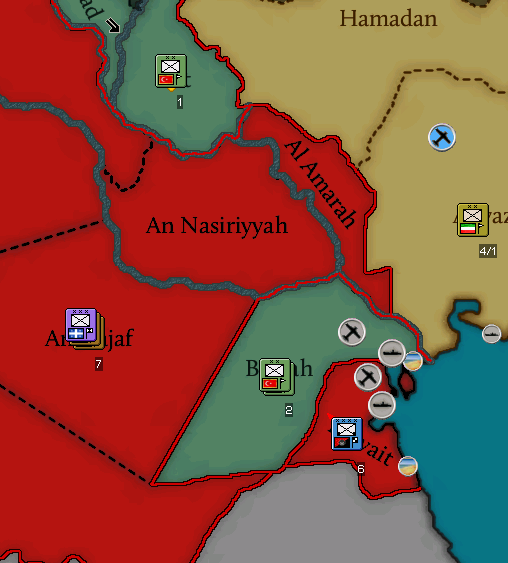
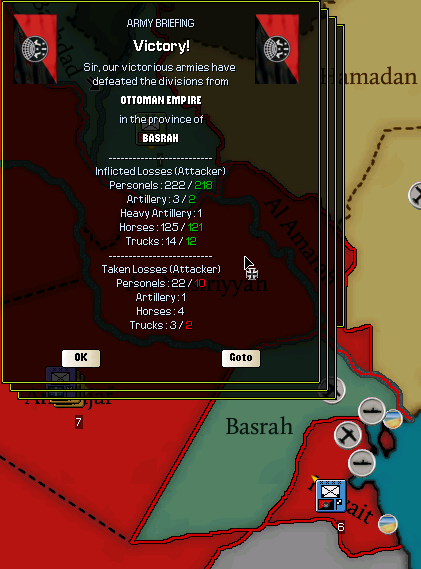
The American Red Army, including this paper’s endorsee for Supreme Commander, worked towards that end admirably, utilizing their superior mobility to put away the obsolete and broken down Ottoman forces.
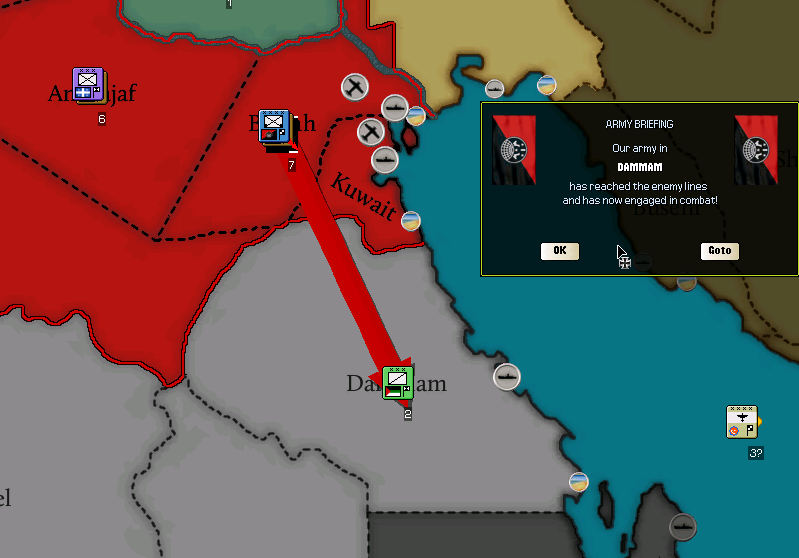
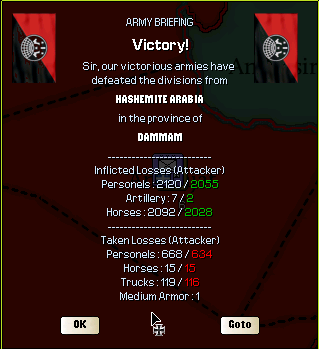
Once that was done, they moved on to put away the Hashemite forces to the south, an enemy made in the course of the strategic masterstroke that sealed the Mediterranean, and the Prague Pact with it. This is another aspect of the war that modern commentators love to blame the ills of the Middle East on. Not many of them have much of an alternative in mind other than making an opposed landing from over a thousand miles away. There are many other examples of this kind of hindsight being presented as obvious. It is disrespectful not only to the men and women who made those decisions but also the people across the world who need the Biarchy to provide solutions, rather than wallow in self doubt.
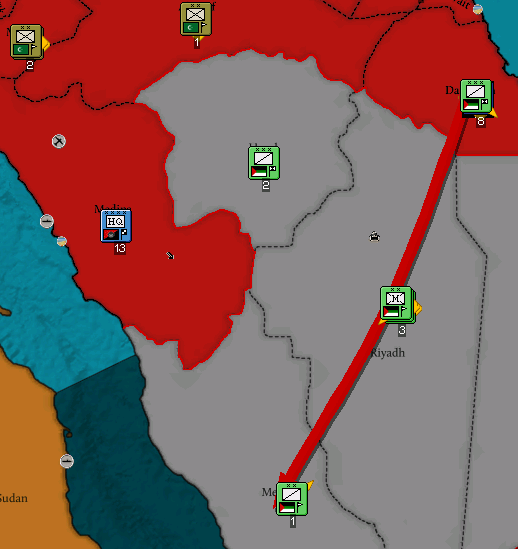
This is not to say that there are no valid criticisms of wartime conduct. The total suppression of the Arab nationalist establishment in Cairo turned a potential partner into an enemy, and the ignorant behavior of American commanders operating in the vicinity of Moslem holy sites provides justification to this day for the Turkic claim that the Central Asian theocracy is the only world power that has the right to govern Moslems.


There was fighting for Arabia, of course, but none of it was interesting and I don’t know where the right screenshots are if I even took them. Some Hashemites got in the way, they were thrown out, America wins.
Nevertheless, the assignment of blame should be left to the historians, not our delegates. Historians, particularly of war, understand better than anybody that innocent people are caught up in the progression of events larger than them. In what was the largest war of all time, innocent countries were caught up in events larger than them. A leader in wartime operates in a different ethical environment than one in peacetime, particularly if that war goes beyond the imperial ambitions of states into a clash of intractably opposed ways of economic and societal organization. Anybody who does not recognize that is either being ignorant or disingenuous.
Somebody ought to remind some of our delegates that they are not congressmen. Be wary of these political creatures that honor their predecessors one day and then denigrate them the next in order to promote themselves. As a worker and citizen, it is your responsibility to always know who your delegate is and what they are up to. If your delegate is one of these despicable climbers, then consider speaking with your coworkers and organizing a recall vote. If your delegate is willing to spit on distinguished comrades like Comrade Law or Comrade Marshall to get ahead, then they are more than willing to spit on you if it behooves them. If syndicalism in America is to operate for the benefit of the workers as it has so far, then these politicians must be expelled from the Chamber and replaced with servants of the people.
-
Chapter Twenty: The Great Arsenal of Socialism (Western Europe: April – October 1943)
Propaganda film produced by Los Angeles Bureau of Filmmakers. Released to public September 24, 1943.

This is Leonard. He sure looks down, don’t he? Say, Leonard, what’s the matter?
A down on his luck man standing in front of a massive billboard exhorting Americans to enlist turns to face the camera.
“They just told me I couldn’t fight because of my bad eyes. It’s back to the shoe factory for me…”
What’s wrong with working at the shoe factory, Leonard?
“I want to be over there. Fighting for what’s important!”
Oh, but don’t you see, Leonard, you can fight for what’s important at home too.
“I can?”
Sure can. Leonard, meet Gerald.
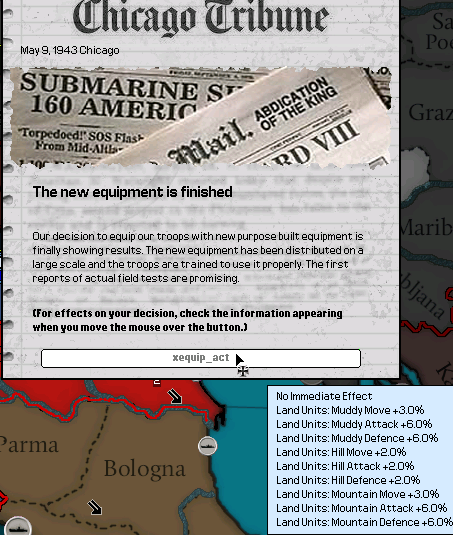
Gerald is a soldier in the Red Army, looking through binoculars towards some mountains.
Gerald, how do you like your new boots?
“Oh, they’re the best. They sure do help us climbing up all these hills.”
Do you recognize those boots, Leonard?
“Why I sure do, we make those at our plant!”
And that, Leonard, is how you are in the fight. And what do you say, Jess?

Jess is a welder working in a shipyard. She speaks with a thick Scottish accent.
“We use these welders to fix up our ships. We just got them in from Mississippi. Thank you, comrades!”
And how about you, Jacques?

Jacques is fueling up a fighter plane.
“Texas oil keeps all our planes flying. Merci, camarades!”
Giuseppe?

Giuseppe is working on a train.
“West Virginia coal keeps our trains moving. Grazie, compagni!
You’re welcome, comrade! And how about you, Harriett?

Harriett is tending to the wounded in a hospital.
“Bandages made in Tennessee helped me save three lives today! Thanks, comrades!”

See, Leonard? Workers like you are keeping the free world fighting each and every day. Without American industry, why, we wouldn’t stand a chance.
“Yes, you’re right! I’ve gotta head back to the plant. People are counting on me!”
Leonard picks up his lunch box and confidently walks up the hill towards the plant. The seal of the IWW is superimposed over top of the factory as an instrumental version of the Internationale ends the film.
------------------------------------------------
Excerpt from An Easy History of: The American Red Navy, part of the Easy History series by Dexter Knowles. Published 2008.
The Dawn of the Carrier Era
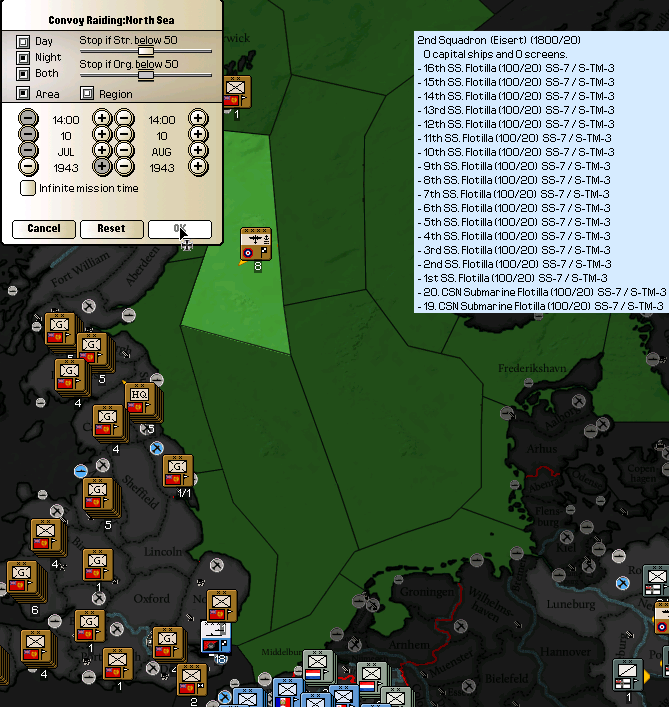
The short period of submarine dominance in Red Navy thinking came to an end when the first post-revolution carriers were launched. Submarines had been originally intended as a complement to the main battleship fleet of the Navy. It was only due to the losses of the previous few years that the submarine corps was forced into the limelight as the diminished surface fleet was relegated to amphibious support operations.
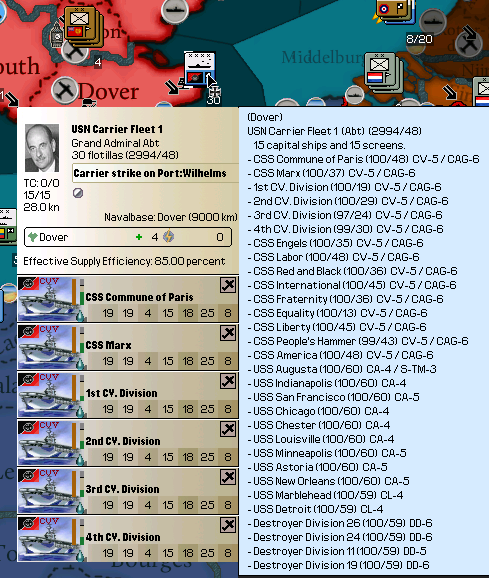
Post-revolutionary naval planners were divided on the direction to take with new naval construction. The British and Japanese carrier fleets provided one example and the German battleship fleet provided another, the latter with a proven track record but the former promising increased range and power projection capability. Ultimately, the British example proved to be too convincing, especially with the blossoming Anglo-American alliance allowing for a great deal of technological exchange. Plans were made for thirty carriers that would span an Atlantic and a Pacific Fleet. Fifteen of these carriers were operational by the summer of 1943 and made up the core of the European Task Force that was sent to Dover, England from Norfolk, Virginia.
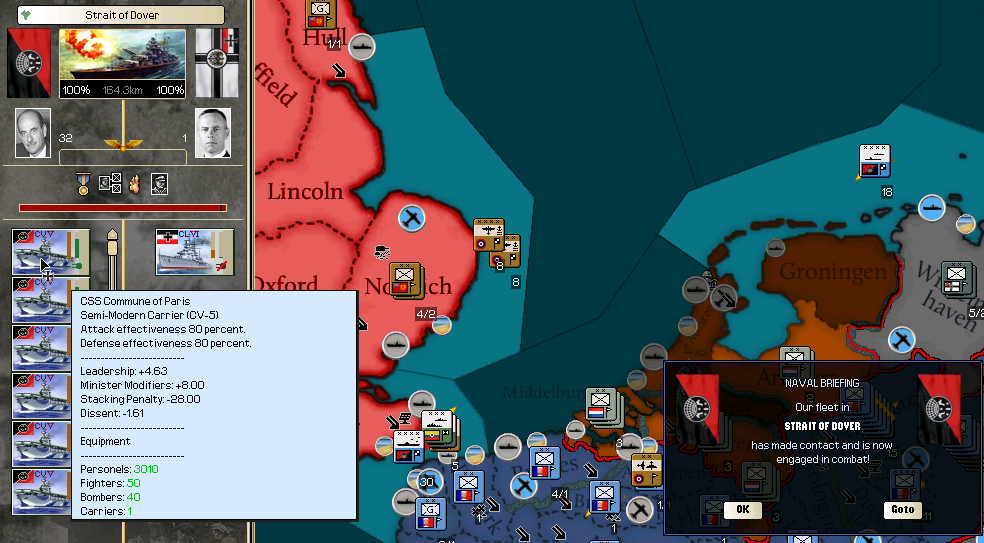
The American carriers were welcomed warmly by the British, who were saddled with the lion’s share of responsibility when it came to battling the German fleet. The depleted American Red Navy had grown into a world class force with the addition of the carriers. The British had dealt serious blows to the German Navy in the opening months of the war, particularly during the Battle of Heligoland and the Battle of Malta.
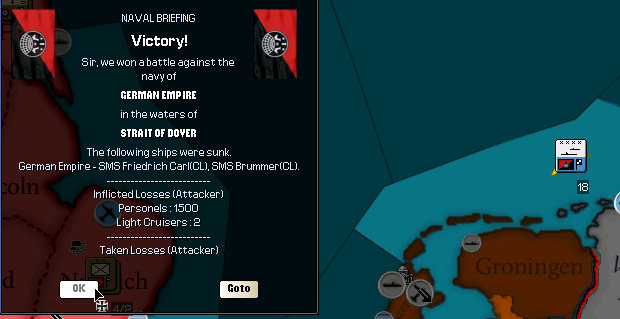
By the summer of 1943, the Germans had reverted to a fleet-in-being posture due to their losses. (Remember: a fleet-in-being aims to affect the enemy by staying in port, thus forcing the enemy to deploy forces to guard against them.) Commerce raiding missions continued, however, and the long range of the American carriers’ planes allowed them to hunt down and dispatch German ships with relative ease.
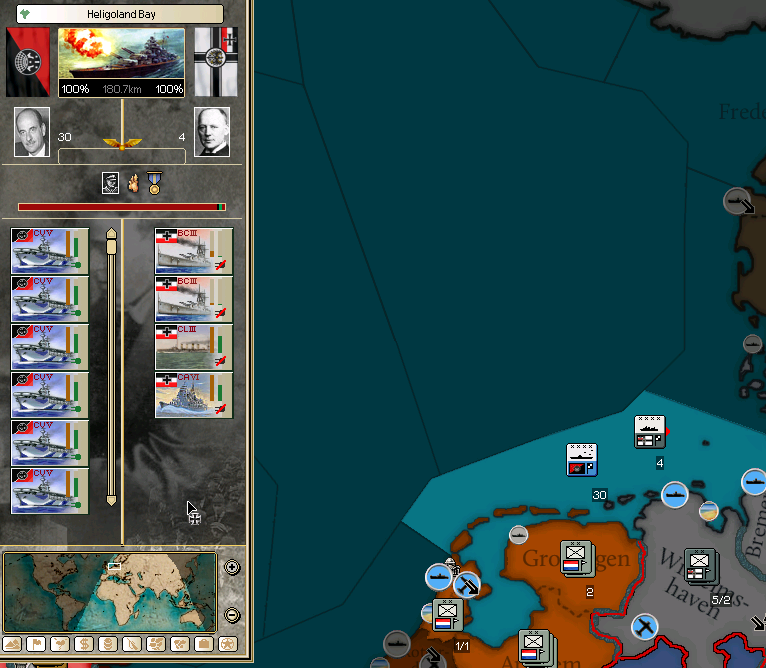
The carrier fleet had arrived too late to face any real test of its battle readiness but it was nonetheless very effective in expanding the ‘safe zone’ beyond the English Channel and allowing for Internationale trade with the Netherlands to go on unhindered.
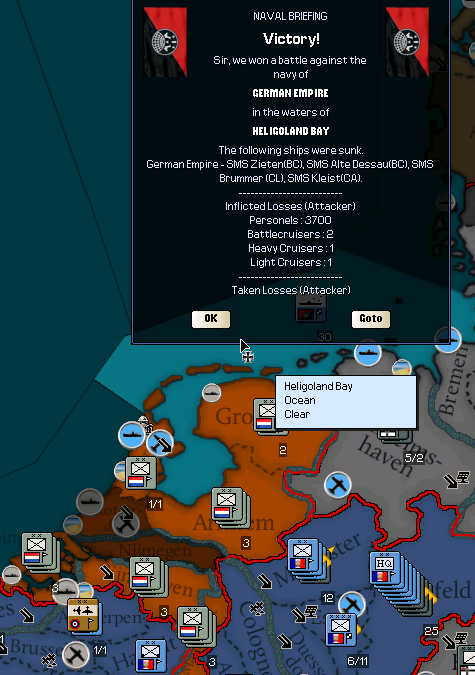
German industry would already be hard pressed to match the shipbuilding capabilities of both the Combined Syndicates and the Union of Britain, and so the sinking of six German ships in the first few weeks of the American naval mission to the North Sea was a serious blow to the Prague Pact’s morale.
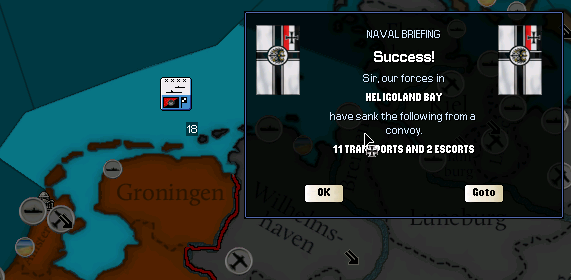
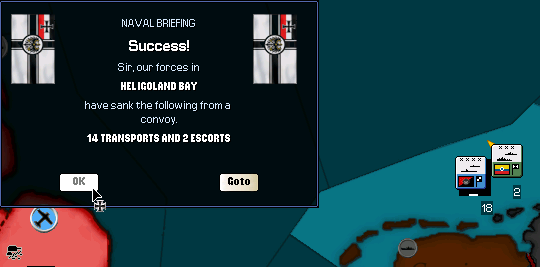
American naval power also meant that there were more ships available to establish an Internationale blockade of Germany. With the Mediterranean closed off, a North Sea blockade would prove to be disastrous for the Germans. In the later stages of the war, the Germans faced dire shortages of important materials as their colonies were either conquered or isolated.
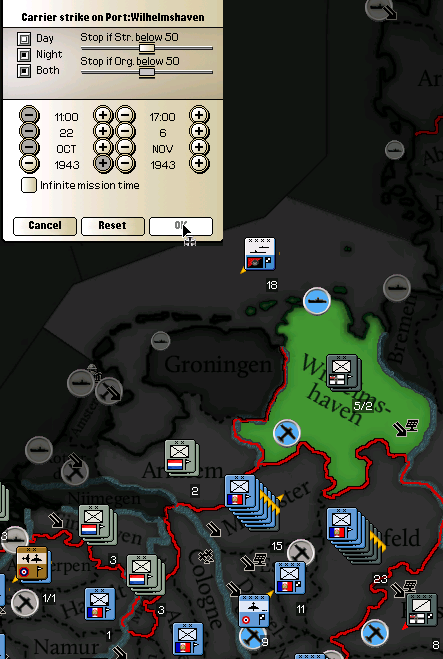
The Internationale could have maintained the blockade and waited for French forces to forcibly evict the High Seas Fleet from its ports, but Red Navy brass were eager to test out the capabilities of their new carriers. And so the Raid on Wilhelmshaven was conceived.
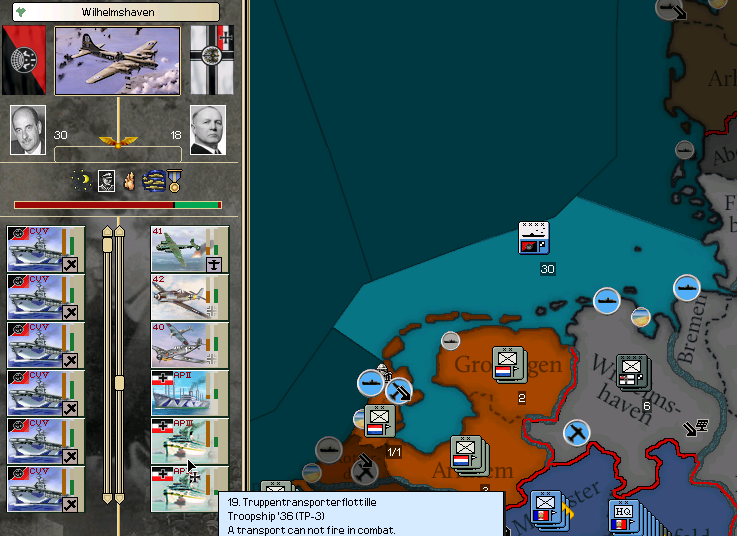
The Raid was not any kind of turning point in the European war. The German fleet had already been more or less contained through British effort. However, it would prove to be important because of what it would eventually inspire.
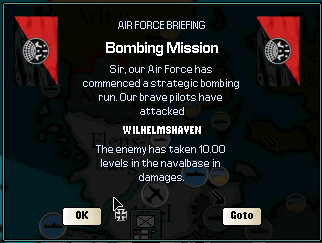
American planes successfully managed anti air defenses and German fighters and heavily damaged the port facilities at Wilhelmshaven, as well as sinking a number of German vessels. The Red Navy used the Raid as a case study that would form the basis of its new carrier-based doctrine. That in turn would lead to the far more well known carrier raids of later years.
------------------------------------------------
“I don’t understand it. Why in the hell wouldn’t they send ground forces now?”
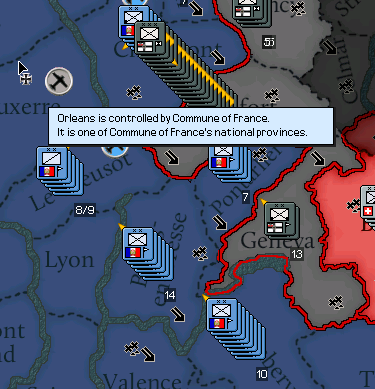
“When the Germans looked like they were gonna barrel right on to Marseille, they were about to, but now the situation is ‘under control’ and they’re ‘evaluating.’”
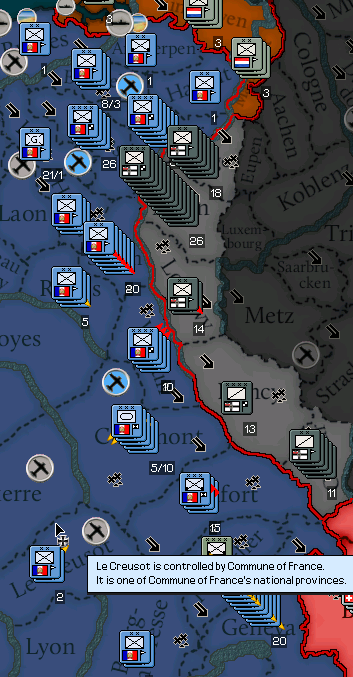
“What’s to evaluate?! We got them on the back foot! When the iron’s hot, don’t let it cool. Strike it! BEAT THE EVER LOVING SHIT OUT OF IT!”
*a short silence where only some heavy breathing can be heard*
“If you give yourself a heart attack, I’m going to have to do all this work on my own and I will not be happy. Get a hold of yourself for Christ’s sake.”
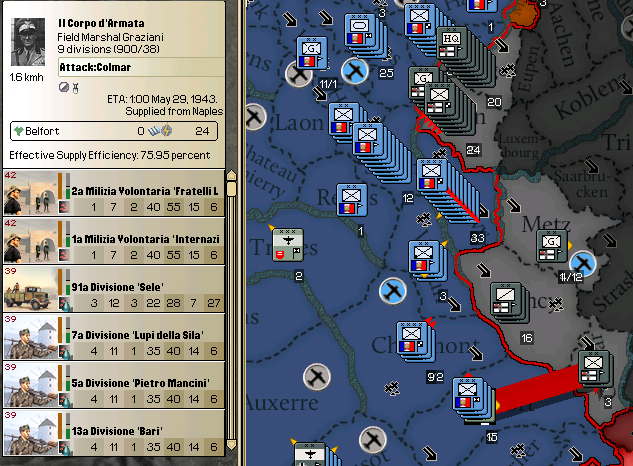
“I know, I know, it’s just… The goddamn Italians are sending troops to the French lines and they’re trying to piece together their country at the same time. What is holding back the British? Are the Irish that frightening? Is the memory of Viking raids that fucking terrifying still? Will the goddamn King sail from Australia to Portsmouth while nobody’s paying attention? I don’t understand their reluctance. We can put the Germans away and the sooner the better.”
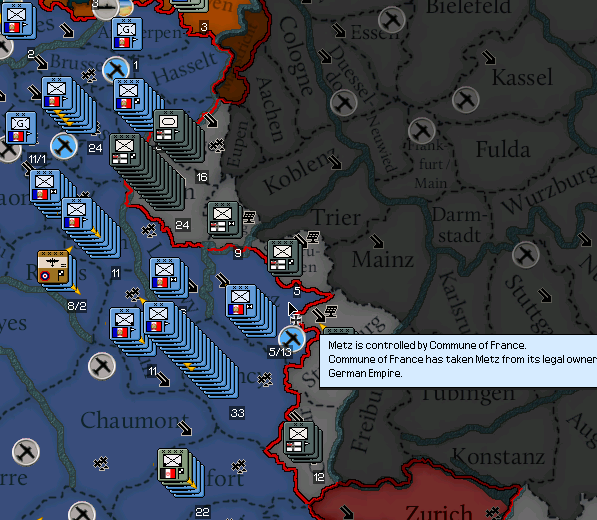
“Well if the recent trend continues, there will be less and less urgency to convince them with. Now that the fight is on German soil, it seems more like a matter of time.”
“There’s still a lot of fight left in that dog.”
“Well I know that, but they don’t seem to. And with all the rationing and shortages in France, the CSP needs to promise the situation will be over with soon before people get antsy.”
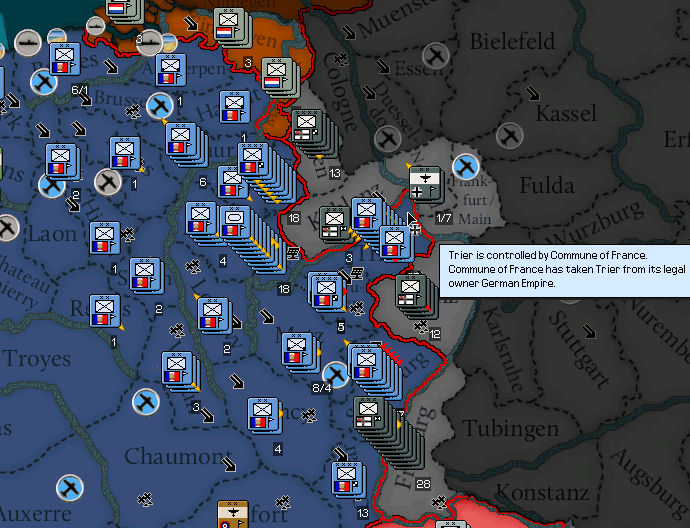
“We even sent over the carriers like they wanted and they’re still playing with themselves. I don’t understand it.”
“Are you even listening to me?”
“What?”
*a sigh is heard*
“Listen, it’s going to be fine in the end. Our offensive in Austria drew forces away and now they’re finding the holes. Their armor will bust through in no time and we’ll be done with this. The lack of British ground forces probably just reduces our chances at reaching Berlin by the end of the year.”
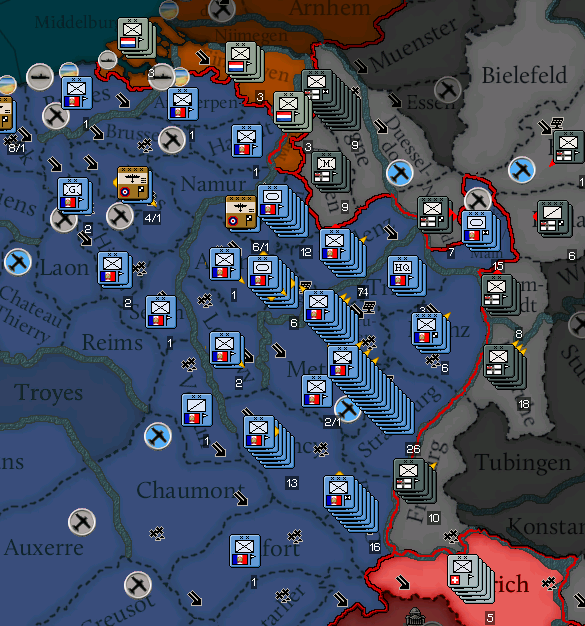
“Why Makhno made that guarantee is beyond me… just idiotic. But more importantly, I just get this sense that the Internationale is splintering as we’re approaching our greatest triumph. The French get angrier and angrier each day. They’ve been giving the Germans a good hiding all summer, sure, but at such a cost… Honestly, man, how do you see this playing out?”
“Well the humanist in me weeps for those lives that will be lost for no good reason.”
“I take it there’s some other aspect of you that has a different stance.”
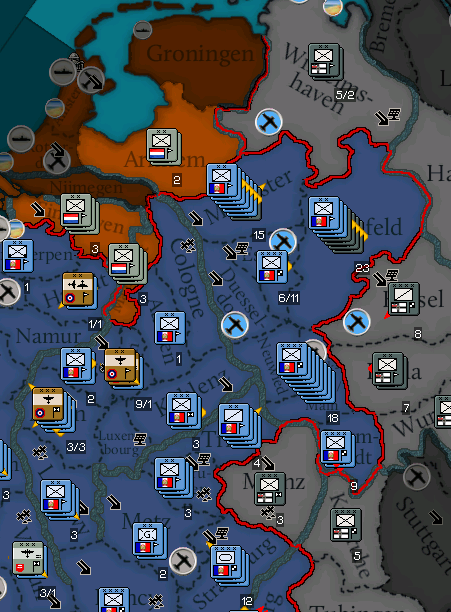
“The cynic.”
“And what does he say?”
“How much longer do we need to keep pretending that America isn’t carrying this entire alliance on her back? If France is too depleted and Britain is too unwilling, then soon enough it will be our time to captain the ship. And that’s both a responsibility and an opportunity.”
*A long silence*
“We’ll have to see about all that. Let’s just win this damn war first.”
-
Chapter Nineteen: Three Weeks in August (The Sinai Peninsula: August 1 – 21, 1943)
L’Humanite du Monde – English Edition – February 2, 1973
An Unlikely Historian on a Mission to Collect Artifacts from the Twilight of the Ottoman Empire
Mazhar Asif Gaber, Staff Writer, Cairo Bureau
Joseph Marchesi, by this time next year, will have lived in Egypt for a longer period of time than he lived in the United States, the country of his birth. Mr Marchesi, who prefers to be called Joe, is the youngest of three brothers. His older two brothers were both killed in action, one in Baltimore and the other in Italy. His mother died shortly thereafter, “of heartbreak” according to Joe, leaving no family for Joe to return home to. He first came to Egypt as a soldier in the Revolutionary Marines, and permanently relocated after the war. He then married the daughter of a prominent labor activist in Port Said.

Joe and his wife, Fatima, lived in Port Said for ten years, until Fatima was killed in an automobile accident.
“She was the popular one, and all of her friends stopped coming around after she died. There was nothing left for me there after she died, so I started to look for opportunities to move out of the city.”
The fishing syndicate in Abu Zenima, a small coastal town to the southeast of Port Said, had an opening for a boat mechanic. Joe took the position, despite having only ever driven through the town.

Joe’s new job had him sailing familiar waters. He had, twelve years prior, sailed these waters as part of the Sinai invasion force that seized the peninsula and dealt the fatal blow to the centuries-old Ottoman Empire.
“When I first moved here, the Ottoman occupation had only been gone for a few years. The people who had lived in the zone appreciated what we had done.”
The Ottoman Empire is deservedly regarded as one of the weaker member states of the Prague Pact. German support had propped up the Sultan for decades by the time the war broke out, and by August of 1943, it was increasingly forced to stand on its own two feet. The sizable Ottoman Army was not well regarded by either the Internationale or the German High Command, but German war planners desperate to match the manpower reserves of North America sought out to bring them into the fold regardless.

The Ottoman Army’s combat experience in the years between the wars consisted of putting down domestic revolts such as the Kurdish Uprising of 1938. They were not equipped to do battle against American troops who had been involved in almost constant warfare since 1936.

When Joe landed on the beaches of the Sinai peninsula in August of 1943, he remembers that the Ottoman defenders seemed to not even know how to respond.
“We had picked a horrible time to land. It was storming badly and we were having all kinds of trouble getting ashore, but they just seemed to miss every opportunity they were handed. They had no artillery, no machine gun emplacements, not anything.”

In the defense of the Ottoman Army, or at least those specific defenders, they were being outclassed on multiple fronts. American bombers operated unmolested over the peninsula. The Ottomans had barely any anti-aircraft weaponry.

“With all of that, we didn’t even have the easiest time! The First Marines were practically invited ashore!”

Joe is only moderately exaggerating. The barely contested landings contrast with the vicious battles of other fronts that feature heavily in cinema and literature, part of why Joe believes the theater does not get the attention he thinks it deserves.

“If you asked me to imagine one of those action movies based off my experience in the Sinai, I don’t think I could do it. Sure there was combat, but there was never any doubt that we were going to crush the enemy. But just because it wasn’t as intense as France or Spokane doesn’t mean it wasn’t important.”

An encounter with a teenage boy three years ago caused Joe to realize that the youth of Egypt were not being taught much of anything about the course of the war. Fatima had been a teacher, and so Joe found an opportunity to both honor his late wife and put his war experience to good use.
“I made some calls, and found that the antiquities people had nobody assigned to researching the war. All about ancient Egypt, which is fine of course, but still I think there’s something of value to learn from the war.”

The Battle of the Suez was one of the largest single engagements outside Europe during the war, and Joe has taken it upon himself to preserve its history as the Director of the Sinai World War Museum, an as of yet nonexistent museum that Joe hopes he can find a home for in Suez or Port Said. With almost a million people having been involved in the operation on both sides, Joe has already gotten a good response from Canadians, Quebecois and American veterans.

Joe is keeping the donated items in an old warehouse in Abu Zenima until he can secure a site to permanently display them. Until then, he is happy to show off some artifacts anybody who shows up at the warehouse. He has one assistant, a graduate student from Canada, who is spending a semester with him.
“First thing he learned was how to waterproof a ceiling. Gotta protect this stuff!”
One of the first things that caught my eye was a nearly intact ship’s wheel, missing only a few spokes.
“I got this from a kid up in Gaza. His dad pulled it off the beach and said it belonged to a Turkish supply ship that got blown to pieces in the Mediterranean. I sent photos of it to a naval historian in Istanbul to see if I could confirm that but I haven’t heard back yet. You know the Ottomans tried to relieve their canal garrison by sea after we cut them off on land, right?”
I did not.

It was one of many things I learned from Joe. Next to the ship’s wheel was a desk covered with plaques and a map. The plaques described, in Arabic, English and French, facts about Ottoman fortifications, the positions of which were laid out on the map.
“I just need permission from the antiquities people to place those plaques at those sites. They’re not getting back to me either.”

Joe has grown accustomed to being ignored in his newfound quest. One objective of particular difficulty has been to find records and artifacts about the sizable number of Ottoman casualties and POWs from the battle. There is, after all, lingering controversy about how the Ottoman dead were interred.
“I remember hearing that many were burned or left out in the desert. The enemy collapsed so quickly that we barely knew what to do with them. I don’t think some of the powers that be want that to be known. Something about the Brotherhood.”
That something is the fact that cremation and non-burial are considered a sacrilege in the eyes of the Muslim faith. In this climate of competition between Islamism and socialism, anything that would make the Internationale appear to have disrespected Islam is a touchy subject. It is unsurprising that Joe is getting nowhere with either Turkish or American sources.

Joe’s favorite part of the collection is the photographs. He has thousands of photographs, donated from people all over the world who respond to his appeals through veterans’ groups and newspaper notices.
“My favorite photo?”

“It’s this one.”
He carefully pulls it from a file cabinet and shows it to me. The photo is of Harry Haywood accepting the surrender of the Ottoman armies in the Suez, only three weeks after Joe landed on the beaches of the Sinai.

The Ottoman commanders are clearly and obviously demoralized in the photo. They had been thoroughly beaten, finally struck down by the malaise that had infected the empire for decades. The photo is captioned: “l’empire ottoman – 1453-1943”

The start date is off by over 150 years, marking the Ottoman capture of Constantinople rather than the true birth of the empire, but the point is true. The Battle of the Suez was the punctuation mark on almost two centuries of decline, the final death of Ottoman power. Only one small corner of the Empire had actually been conquered, sure, but any glimmer of hope the Ottomans had of keeping the Internationale back died with a hundred thousand of its men along the canal.

“I’m just trying to convince the right people that this is important. You know, the Ottomans were once Egypt’s nemesis? So I don’t understand why they wouldn’t want to commemorate something that contributed to their demise.”
I have an idea why. Joe’s unit, the Revolutionary Marines, wasn’t involved when the American Red Army put an end to the pre-socialist Egyptian state, a tactically expedient decision with repercussions that play out across the front page of this newspaper seemingly every day. History and politics will always be tied up in one another, and so the odds will likely remain stacked against Joe in his newest battle. Not that he’s going to let that discourage him.
“As long as somebody is keeping the history alive. That’s the most important thing.”
-
Chapter Eighteen: Unforgotten (Austria: May 18 – July 14, 1943)
From the Chicago Proletarian: April 5, 1996
Since Maurice Rose died last week at age 96, we’re well into another manifestation of what Daniel Kirkpatrick derided as the ‘postmortem piñata’ in the Denver Post’s Thursday editorial. I disagree with Daniel’s viewpoint that we ought to not criticize the dead right after their passing because the time right after death is when we discuss the legacy of important figures the most, and when we truly set the tone for how they will be viewed in history. There are limits to this, naturally, and I advise everybody to apply the standards of good taste, but it is undemocratic to say that we can praise the deeds of the dead right after they pass but that valid criticism and analysis of their legacy should wait until an arbitrary period has passed.
To be frank, news topics change on a weekly basis, and this may be the last week ever when all Americans are thinking about the legacy of Maurice Rose. If we are only heaping praise upon the departed Rose, then most Americans will move on thinking he was a saint. Don’t get me wrong, Rose deserves the adulation and respect of the thousands who lined the streets of Denver to say goodbye to their former mayor, war hero and native son. However, we owe it to ourselves and to the memory of General Rose to be fair and honest in how we assess his life and achievements. Thus, it is my belief that this conversation should not be left for historians to debate in their journals that most people won’t read. Instead, we should have it now. With that in mind, I have decided to collect the most common controversies about Maurice Rose that are currently flying about and invite historians to address them in an honest and comprehensive fashion. Readers are invited to utilize the new eProletarian billboard service (connection details available on page 2) to inform us of controversies and tales of things Rose might have done wrong or been partially responsible for, and we just may be able to shed some light on them. Check back next Tuesday for the first edition.
April 9, 1996
First of all, thank all of you for your contributions to the billboard service discussion about General Rose. For the most part, it was conducted in a civilized and respectful matter, and I’m grateful for that. Far and away, the most common topic was Rose’s tenure as the American envoy to the Istanbul negotiations between the Muslim Socialist Committee and the Council of the Diaspora over the political status of the Jewish communes in Palestine. However, we have decided to leave that topic until after the Passover holiday has concluded, because many Jewish historians who are experts on these events are currently away from their jobs while observing that holiday. Instead, we will begin with the second most common area of request, Rose’s experience as overall theater commander of the Southern European Front during the revolution.
[…..]

Did Rose turn a blind eye to atrocities committed by Canadian troops in Austria?
The short answer: No, and the Canadian atrocities are largely mythical to boot.
The long answer: Reports of Canadian troops being overzealous savages in Austria have been thoroughly debunked at this point, and while it is understandable why they flourished during the Buck era, it is surprising that they still persist fifteen years after the Northern Spring. In fact, Canadian divisions in Europe were completely under the control of the American high command (a fact that made Chairman Buck livid) and they acted much in the same manner and were subject to the same standards as American divisions. There were isolated atrocities and Canadian soldiers accused of war crimes were dealt with in the same court martial system as Americans were. Thus, Rose did not turn a blind eye to anything of the sort.

Did Rose order the bombing of refugee ships in the Adriatic?
The short answer: No.
The long answer: While Rose did have authority over the limited naval operations that took place in the Adriatic, there’s no evidence that he ever actually took an interest in it. Instead he focused on the land operations and delegated that authority to his subordinates. There is also no evidence that the sinking of civilian crafts fleeing to Serbian territory was anything but accidental, as German cruisers and destroyers were active and eventually sunk by the same naval bombardment wing that sunk civilian craft off the coast of Croatia. With no survivors, it has been difficult to ascertain whether the incident took place at night or during the day and so accusations of negligence on the part of the bomber pilots are also difficult to support or refute. Either way, Rose almost certainly did not order the action.

Did Rose play a part in the Rape of Slovenia?
The short answer: No, and the Rape is a myth.
The long answer: The Rape of Slovenia was a propaganda device devised by the pre-socialist Serbian government when it was demanding cession of Slovenia in the early 1960s. There was no Syndintern campaign to ‘punish’ Slovenia, and in fact, Slovenia was regarded in post-war Syndintern planning as an ‘oppressed’ territory of first the Austrian then German empires.

The basis of the mythology came from when the small Slovenian socialist insurgency engaged in reprisals against pro-German conservatives who had been tasked with exterminating them. The combined Syndintern armies did assist the socialist insurgency in tracking down leaders of local pro-German militias, but this was for a clear tactical purpose, as the advancing Syndintern army was being counterattacked in northern Slovenia. There is nothing to suggest that Slovenia suffered any more or any less war crimes than any other Pact territory.

There are some photographs showing a celebration as American and Canadian forces captured the encircled Ljubljana, and neither these photographs nor the current state of the city support the Serbian accounts of mass looting, and the entire idea of the Rape persisted only in Serbian and Slovenian nationalist circles in the time between the breakup of Greater Serbia and now. Why it has suddenly found traction beyond those groups is mystifying, to say the least.

Rather than being pillaged, most Slovenians will tell you that Slovenia began syndicalizing and rebuilding almost immediately after the Germans were evicted from the territory. There were some ugly spots but on the whole, Slovenia can be considered a success story of postwar recovery.

Did Rose abandon the Mexican army to be crushed by German tanks in Klagenfurt?
The short answer: Yes, but there was little Rose could have realistically done about the situation.
The long answer: The Mexican Army that fought in southern Europe was a nascent force, to be kind. They had found success against the pitiful military of the Italian Federation, but they understandably had difficulty against a much more experienced and better equipped German Army.

Some of the commentary surrounding the first battle of Klagenfurt accuses Rose of being a racist who regarded Mexican lives as less valuable than American ones. There is nothing to support this. Instead, Rose and the American high command were genuinely surprised that the Germans were so quick to move armored assets away from the French front to defend Austria. They never expected that the Mexican Army would come under such fierce counterattack.

Quotes of Rose that supposedly prove he wasn’t upset about the many Mexican deaths are taken out of context. Rose was satisfied that the offensive into Austria was achieving one of its goals. It was meant to relieve pressure off of the French in the west, and the sudden appearance of German armored divisions signaled that it was doing so. Rose was thinking about the greater strategic context of the first battle of Klagenfurt, not being cold hearted towards his Mexican allies.

Rose also did not send relief to Klagenfurt. Instead he decided to preserve the Syndintern’s position in Tyrol, and to prepare to counterattack the Germans as they reoccupied Klagenfurt.



It was sound strategy. While the Mexican army was certainly left on its own and beaten, they were able to retreat to the safety of Tyrol while the German counterattack was beset on all sides by the Syndintern. General Rose was, after all, a general. Thankfully, in these modern times, we have the luxury of being able to think about every life. General Rose had to make a choice while fighting a technologically advanced enemy in tough terrain, and the Mexican deaths in Klagenfurt served a greater purpose.

Did Rose order the terror bombing of Klagenfurt?
The short answer: The current state of Klagenfurt’s landmarks is not a sign of intense bombing, but rather of post-war neglect.
The long answer: Klagenfurt was bombed by American twin-engine bombers like many other cities during the war. The twin-engine bombers used throughout the wars of the period were not designed for mass destruction of cities, but instead were used to target military infrastructure in an area of operations. The damage to Klagenfurt’s old square occurred when American bombers were sent to bomb the German headquarters nearby.

The current state of old Klagenfurt does lend the city some historic value, as it mirrors what most German and Austrian cities looked like in the forties due to the air war that had raged over them. The difference is that most German cities have restored their landmarks while a number of Austrian cities have not. The reasons for this are many. In the immediate aftermath of the war, rebuilding industry and homes was considered more important than repairing landmarks. When both Germany and Austria had rebuilt, Germany embarked on a campaign to restore its historic landmarks as part of its overall effort to appropriate German history and identity from the Imperial elite for the workers.
However, Austria during the fifties was dominated by the anti-clerical faction of the KPÖ, which refused on ideological grounds to restore anything associated with religion or Austrian nobility, including many of the buildings in the old square of Klagenfurt. In later decades, restoration programs were started and stopped according to the needs of the Austrian government. For example, when the Internationale considered if Austria should share the burden of German reparations to its colonies, the restorations suddenly stopped and the Austrian government emphasized the ruined state of cities like Klagenfurt to ‘prove’ they couldn’t be asked to give up resources to the former colonies. Therefore, the restoration program in Austria outside Vienna has been half-hearted and irregular. This is the true cause of the damage still evident in Klagenfurt, not that Klagenfurt was bombed more intensely or with more malice than any other Pact city. One need only visit Tokyo to see that a city can bounce back from far more severe damage if its administration has the resources and willingness to do so. The Austrian government has the resources to make Klagenfurt’s old square as pristine as it once was, but it does not have the willingness.

Did Rose hold back the Austrian offensive in the summer of 1943 to please the French?
The short answer: No.
The long answer: There’s a lot of versions of this one, but they all revolve around the concept that the American high command put France’s political aims above tactical considerations. The idea is that France was already laying the groundwork for the European Union, and that the French leadership did not want American troops making significant gains in German territory. Instead, it was more supposedly more important for the Commune to appear as a powerful and equal partner of the Combined Syndicates. Therefore, diplomatic pressure from the Commune translated into Rose being told to ease up the pressure.

It’s a compelling narrative. It’s also not true. There’s no direct evidence of any such order to General Rose, and while there was plenty of premature concern about the postwar balance of power in both Paris and Chicago, there’s nothing to suggest that it had any effect on how Rose ran the front. If Paris didn’t want the attack on Austria to succeed, then nobody in Paris ever told their divisions that fought in the south. The Tenth and Eleventh Armored Divisions of the Communal Army fought to the best of their ability and with a ferocity that matched any other unit on any other front.

This narrative sometimes seems like a way to explain why American progress slowed from the rapid and comprehensive defeat of the Federation to a slow summer-long slog through the Alps. Instead of resorting to conspiracies, I urge the readers to think about the basic facts of the situation. Combine the natural barrier of the Alps with the superior skill, technology and morale of the German Army and consider that the front was expanding in width. The Americans were now dealing with a front stretching from Innsbruck to Hungary, almost all of it mountain ranges.

The Americans were also exhausted, having been on the march since Operation Rocky in March of 1943. It is only natural that the advance would halt coming up against an enemy more determined and better equipped than any before.

The Austrian offensive had the potential of capturing Vienna, and maybe Munich and Prague, but it is pure folly to think that it could have broken through to Berlin before the French. The Western front was the clash of armored divisions in the low country of Flanders, a dynamic series of maneuvers and counter maneuvers that continue to capture the popular imagination. The Southern front was a dreary war of attrition in the shadow of the Alps, hundreds of thousands of North Americans and Europeans trying to survive under the constant bombardment of the enemy, a throwback to the Great War. There isn’t much that Rose or anybody could have achieved in this situation other than what Rose did achieve, which was to relieve the pressure on the Commune and enable the gains that were to be made in the coming year. To criticize Rose for that is foolish.

Did Rose ignore the killings of teenage boys by the Communal Army in his theater?
The short answer: The boys were, unfortunately, enemy combatants.
The long answer: The German high command was beginning to realize as 1943 dragged on that they were hopelessly outnumbered. The manpower reserves of a united North America would far outlast those of Mitteleuropa. After the failure of the spring offensive, the Kaiser signed off on a measure conscripting boys as young as 14 and 15 into hastily organized ‘Landstormen’ units that were thrown into battle against French tanks and veteran American troops.

The Pact saw the summer of 1943 as a pivotal period where the American Army was still preoccupied enough with Middle Eastern and African operations that they could possibly be defeated in Italy, even if the Federation had been a massive disappointment. And so, the Landstormen militias were thrown into battle, as part of the Empire’s last true efforts to win the war. Even though the German Empire would survive 1943, many of its leadership were already beginning to realize that it was doomed.
Rose was personally troubled by the heavy casualties suffered by the Landstormen. Having witnessed the widespread usage of underage soldiers in Union State militias during the civil war, Rose was used to these types of horrors. So while it is true that he did not punish any of his troops for the deaths of the German boys, it is important to keep in mind that the German Army put them out on the front lines in the first place.

Did General Rose lose his fighting spirit in Innsbruck?
The short answer: Impossible to know for sure, but probably not.
The long answer: Storytellers have always loved to have their characters make massive and life altering realizations in a singular moment. Stories about General Rose are no different, and Innsbruck features prominently in the growing mythology of General Rose. But Rose was a real person and his transition from a skilled general to a capable civic servant can’t be summed up as the result of lessons learned in one day.
In case you don’t know what I’m talking about, the many questions best represented by this one are about an incident that took place during the late June offensive along the Eastern Alps. The Syndintern control of Klagenfurt was under heavy attack by German armor.

General Rose sought to flank the German counterattack by capturing Innsbruck. Rose’s forces outnumbered the enemy two to one…

…had substantial air support…

…had the city surrounded…

…and even had more time to capture the city than originally predicted, due to a spirited and clever defense of Klagenfurt by the Syndintern forces there.

But even with such an advantage, Rose called off the attack on Innsbruck. It’s not completely clear why he did so. Rose would only ever say before his passing that it made the most tactical sense to call off the attack and wait for Italian divisions coming from the south. This is likely true, but the popular story of Rose’s life will always lend a great deal of importance to his near brush with death in the Innsbruck suburb of Völs.
Rose had a penchant for commanding his troops from close to the front line. It was a risky proposition but one that had earned him the respect of his troops from the earliest stages of the civil war. It very nearly cost him his life in Völs, when his command tank was disabled by a mine. Shortly afterwards, a group of local partisans sprung an ambush. One climbed on top of Rose’s tank and fired a submachine gun into the hatch which had been blown ajar by the mine. One bullet grazed Rose’s arm and the attacker very well could have killed him if he hadn’t been killed himself at that moment.

Two days later, Rose ordered a retreat from both Tyrol and Carinthia. A common interpretation of these events is that the attack in Völs shook Rose so much that he was no longer willing to lead his army in the same aggressive fashion as he had been before, hence the retreat. In the longer term, it allegedly inspired Rose’s retirement from the Red Army in 1949 and his second and third careers as an accomplished diplomat and the mayor of Denver. The only man who knows for sure how much of a role that ambush played has left us now, and so we can only really speculate. In my opinion, its effect was probably overstated. Rose continued to lead from the front, and the slow and methodical pace of his advances after this point can probably be attributed more to the unfavorable terrain of the region than anything else.
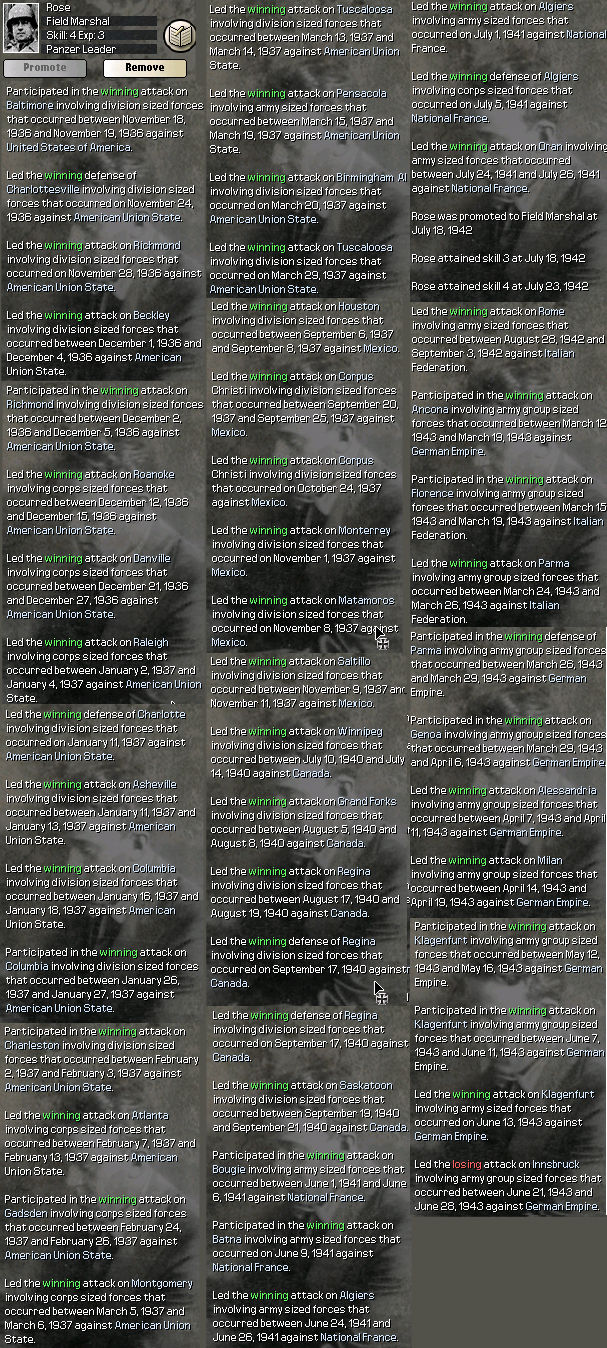
After all, Innsbruck represented what was honestly the first true setback for the Trans-Atlantic Expeditionary Force with Rose at its helm. Even then, the unit itself was doing quite well in Innsbruck. Instead of going for the personal glory and the headline, General Rose decided to retreat and regroup. I think it flies in the face of everything Rose accomplished before and since to attribute this to a broken spirit. We must remember that the stakes for the Combined Syndicates were extremely high during Rose’s campaigns in North America, where he earned his reputation. In Austria, the Syndintern needed more than anything to hold the Germans back, not to strike a death blow right then and there.
Imagine, for a second, that Rose had persisted and captured Innsbruck. But then German armor advances through the hole left by the defeat in Klagenfurt. Then perhaps we would be talking about how many Syndintern units were surrounded and destroyed in Slovenia, the collapse of the Italian front, the scrambling of divisions to hold back the Germans, which then leads to a new lease on life for the enemy in the Middle East or Flanders, so on and so forth. Perhaps this is too pessimistic and maybe some spectacular success may have come from the capture of Innsbruck, but the point is that these were the scenarios that must have been playing out in Rose’s mind when he made his decision.
Instead of being too cautious, I think Rose was being prudent. We have the benefit of looking back from a time where the Prague Pact is long gone and the victory of international socialism seems like it was an inevitability, a clearly superior and evolved society triumphing over an archaic and brutal one. Rose did not live in such certain times.
I’d like to thank everybody who contributed a question. The question thread on eProletarian is now closed, as we have plenty of material to span Rose’s entire life, however there is a new thread to discuss these findings. References for each answer can be found in that thread (once again, see page 2 for instructions to connect). As promised, next week will focus on the Istanbul negotiations.
-
Chapter Seventeen: The Romandy Offensive (Italy: March 29 - April 25, 1943
http://www.lumumba.edu.cng/history/faculty/dnkembe/blog.html
Professor Nkembe’s Military History Blog
Posted: May 4, 1996
Topic: Greatest Military Blunders of All Time: Honorable Mentions: The Romandy Offensive
Body:
The Romandy offensive was launched in late March of 1943 as a response to Operation Rocky. It was intended to relieve the embattled Italian Federation after the encirclement and surrender of Italian and German forces in Bologna and consisted of the southern pincer of Operation Südwind, which was diverted south from its base in occupied Romandy towards Turin.

The decision to split Operation Südwind in two took place while the Pact salient in Genoa was attempting to repel the Americans in Parma led by General Wark.

The Pact divisions in Genoa were certainly under great threat, and so, at first glance, the idea of a relief effort from the north of Genoa does appear to be a good one. So why was it a blunder?

First of all, its strength was woefully inadequate. The Internationale force in Italy numbered just about one million men, and a few hundred thousand Pact troops had already been captured during the course of Operation Rocky. The amount of German troops being diverted was simply not enough.

In order to relieve Genoa, where a Pact garrison was being attacked on two sides by a force three times larger, the Romandy offensive would have had to recapture Turin. Turin had been in French hands throughout the winter, and the Italian fortifications that were intended to defend against a French attack from Romandy were instead being used to defend against a German attack from Romandy.

On top of these problems, the Germans were attacking along a narrow corridor through rough terrain. The French forces in Turin were able to mount an extremely effective resistance along the St. Bernard Pass, one of the few routes the Germans could use without violating Swiss neutrality.

Therefore, it was pure fantasy to imagine that an offensive directed south, through the Alps, could ever relieve Genoa in time.

The folly of the attack through the mountains is enough to qualify this as a blunderous decision, but the amount of resources that it diverted from Operation Südwind is the most damaging aspect of the Romandy offensive.

In this case, the German High Command made the critical error of allowing public opinion to trump tactical considerations. Operation Rocky had ignited a panic throughout the Prague Pact, as one of the largest German allies was falling to pieces. ‘Saving’ Italy became an objective that distracted from what had been and should have continued to be the primary objective: defeating the French.
I will refrain from repeating the tropes of shoddy historical television programming. I cannot, nor can anybody else, say that this is the one decision that cost Germany the war. However, we can be certain that the divisions committed to the Romandy division could have had greater success against other targets. The French armor in the Pontarlier salient was left mostly unmolested, and the half of Operation Südwind left to its original task was unable to mount a sustained westward attack. Would a full strength Operation Südwind offensive have won the war? Probably not, but capturing Lyon would have been a boost to Pact morale and could have opened a number of opportunities for the German army.

Remember what I said in the previous post: it is better to respond than react. Attempting to relieve the embattled forces of Northern Italy at the expense of Operation Südwind was a reaction, and a particularly ill-advised one at that. Instead it would have been better for the Pact to respond with a blow of their own. Seizing Lyon and opening up the south of France would have been a good start. Also realizing that the outnumbered German defenders of northeast Italy had the Alps as a defensive aid would have been good.

The Pact failed to hold back the Internationale in the lowlands, but the further north the attack went, the more and more time and effort it would take for the OAS forces to advance. The pace of warfare in the Alps was drastically different than warfare in the south of France, and the German High Command failed to recognize what they could have accomplished if they had stuck to their original plan while the OAS began their arduous trek into the Alps. Every day the OAS spent navigating the increasingly rugged alpine terrain could have been a day that German armor spent speeding towards Marseilles had they went ahead and broken through the French lines. It is another of the many examples of the German High Command’s failure to understand the new age of mobile warfare, almost two full years after the epic collapse of the New English front changed the way (most of) the world thought about war.

Instead, the Romandy Offensive encountered increasingly stiff resistance on the road to Turin, as French forces wheeled northwards after capturing Genoa and linking up with the OAS in Italy. It petered out completely as the Internationale was knocking down the gates of Milan, the last bastion of the Federation.

The Romandy Offensive was designed to save an un-savable country. In this sense, the Romandy Offensive can be considered to be the final manifestation of misguided thinking about the military strength of the Italian Federation. The first was Italy’s complacency following its victory in the Austro-Italian War. Italy had spent decades in the shadow of the Austro-Hungarian Empire, and so when it defeated Austria, its leaders believed this to be an accomplishment of the highest order. The pope sincerely believed that the Federation’s military was favored by God, and the would-be military reformers in Italy were ignored. Instead of crucial upgrades to Italian equipment, funds were spent on lavish public works projects throughout the Federation, particularly in the Vatican.
Many in the German High Command recognized that Italy’s victory had far more to do with the many distractions besetting Austria, but the second manifestation occurred when military concerns took a backseat to the diplomatic efforts of Chancellor Brüning in putting together the Pact. The spiritual authority of the pope complicated the negotiations between the Federation and Germany. Unlike Bohemia and Sweden, which were willing to allow their forces to be effectively subsumed into a greater Pact command structure, the pope was reluctant to see the soldiers he believed were commanded by God to be integrated in such a way. Pope Pius quickly changed his mind once Rome was captured, but by then it was too late for an effective defense strategy to be put in action.
The third was how Germany bought into Italy’s own hype. While the Italian army was substantial in size, the events of the war proved that they were largely ineffective, even against green OAS units. Instead of leaving Italy to suffer the consequences of its poor preparation, Germany sabotaged its own operations out of a misguided belief that the Italian Federation was a key ally. Its geographic position was important, but it took until Milan had fallen for the German High Command to realize just how much of a liability their ally was.

Clearly by the time of the pope’s surrender in Milan, it was too late. But the fate of the Italian Federation had been sealed long before War Plan Black was ever executed.

The Federation simply stood no chance against a determined, better equipped and larger OAS force that utilized its naval supremacy of the Mediterranean to maximum effect.

While it was certainly alarming for a major member of the Prague Pact to crumble in such a fashion, the German High Command should not have panicked. Red Rome was an inevitability, but the stalling and failure of the German southern offensive was not. It was the combination of self-delusion, politics trumping sound strategy and sheer futility that earned the Romandy Offensive an honorable mention on my list of greatest military blunders of all time.
Here’s your hint for the next post: The British gave America its language but also the idea for invading this place. Whether you prefer American or British English is up to you, but we can all agree that the Americans pulled off the better invasion.
Got an idea what it is? Email me the answer for five extra credit points on the next quiz. Hope you enjoyed this post and see you in class!
-
Chapter Sixteen: The Great Liberation (Africa: February 17 – July 4, 1943)
The following are excerpts from the wartime writings of Abraham Johannes Muste, who passed Sunday. Muste, a Methodist clergyman by training, began his career in politics during the First Great War, during which he strove to prevent American entry into the conflict. Following the war, he engaged in a number of labor actions, most notably the 1919 Lawrence Textile Strike and the 1934 Auto-Lite strike in Toledo. Following the revolution, he served in the Chamber of Delegates for twenty years, as the representative for the New England Textiles Syndicate. He was a founding member of the Christian Socialist Group led by Norman Thomas, a key contributor to the Thomasite position during the drafting of the Chicago Consensus and an honorary member of the American chapter of the Pan-African Congress. After retiring from the Chamber in 1958, he served for five years as Ambassador to the Netherlands, where he was born. He was 82.
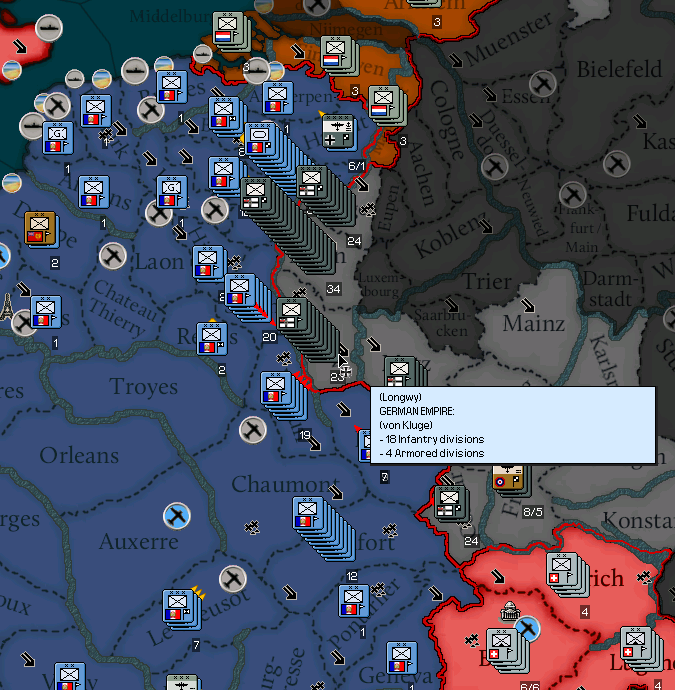
December 1, 1942
I know that Norman isn’t really supposed to be telling me many of the things he does, but I don’t betray his trust in me by telling anybody else, not even Anna. I also make sure I keep this book locked up at all times. Truth of the matter is that the Wallonian offensive has stalled, and that the optimistic predictions of the Rhine by Christmas are completely impossible.
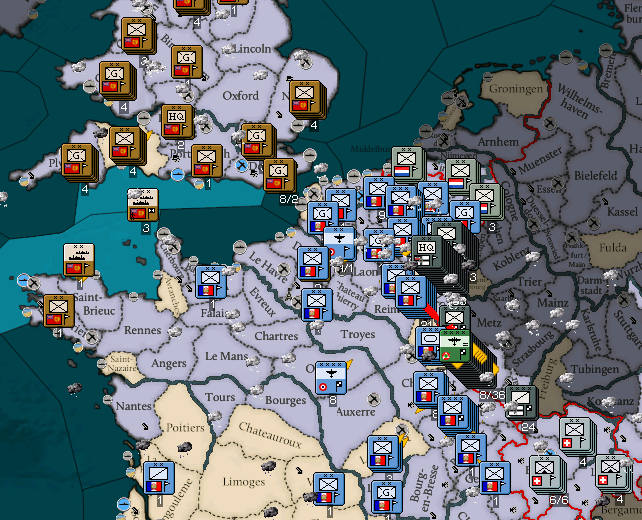
The French would be better off digging in for the winter than pushing this further. They would simply be overextending themselves I fear.
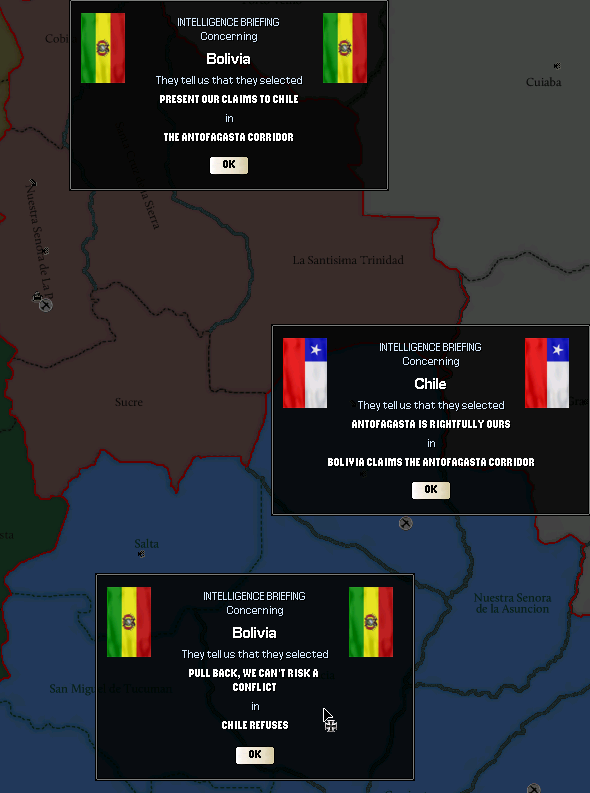
March 18, 1943
Met with the Bolivian ambassador and Norman today. Norman was straightforward with the ambassador that we frankly don’t have the resources to intervene in a second War of the Pacific should it break out.
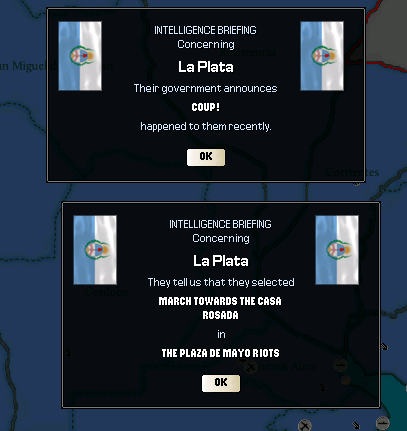
The ambassador’s main concern is that the situation in Buenos Aires could lead to an anti-Bolivia alliance with Chile.
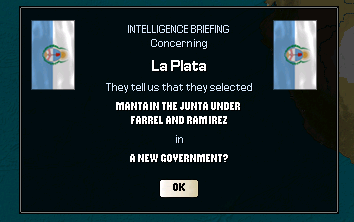
To the contrary, it is my opinion, as I told the ambassador, that the refusal of the junta to hold elections would actually paralyze Argentina. I am concerned that the ambassador seems to have had his head filled with stories the militarists in the Chamber that we have unlimited resources available to launch an invasion of the Andean coast. We simply must continue to stave off this conflict. I’m afraid of the consequences, both human and political, if we attempt to enforce socialism in South America by force, especially at this juncture.
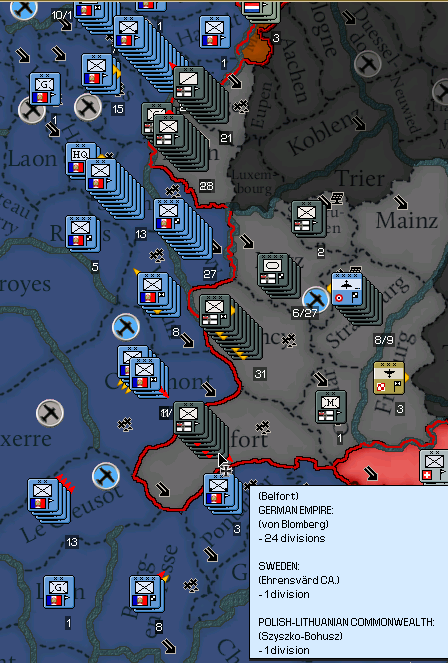
March 22, 1943
Having a weekend with Anna in Green Bay was lovely and I’m glad that the news didn’t break until this morning. I needed that rest badly with all that is going on, and George was very helpful in keeping things moving while I was gone. But still I would have had to come home for this. The atmosphere at the office was tense when I got here. The headline of the Proletarian told the story well enough:
GITLOW ABANDONING AFRICA?
It didn’t take me long to read the first few paragraphs and know what the deal was. Norman told me last week that the French are panicking about the German offensive in the south and wanted American divisions to be transferred from Africa to southern France. We told them we would consider it, Norman says that the idea went nowhere, and that was that. But when the Proletarian got a hold of this information, it had passed through so many filters that our false consideration became an agreement and a transfer became a total abandonment of the African front. And so here we are. My staff is outraged, naturally, but I can’t let on that I know what Norman has told me about the situation. The Central Committee is supposed to meet about this later today and we’ll see how they respond.

March 29, 1943
Norman is asking me to go with the Chairman on a trip to Wilmington. A few years, one of the workers there found some documents somebody at Dupont had hid during the outbreak of the revolution, detailing the creation of a new synthetic fiber called nylon. Now half of northern Delaware is working in those plants, producing nylon for parachutes. And now they’re working on mosquito nets for the troops in Africa. The tactical point is to prevent malaria, but the point of the trip is to show that the African theater has been, is and will continue to be a priority. We’ll see if it calms the backlash.

April 4, 1943
The Chairman asked me my opinion on the speech he’ll make at the plant. I’m surprised he would ask somebody outside the Committee. This experience may have humbled him. Either way, I told him not to bring up the local forces. The concern of last year was that the presence of our forces in Africa amounted to colonialism and thus championing the accomplishments of the new African armies made sense. This year’s concern, ironically, is that we’re going to leave Africa out to dry. Any focus on African armies would probably be interpreted as a sign that the Red Army is withdrawing. How quickly situations change.

This fiasco is having another effect beyond our borders. Based on the bits of intelligence from Norman, I don’t think the neutral powers who have a stake in Africa really believed that we were ever committed to eliminating Mittelafrika. I’m not sure what led them to believe this, but now that we clearly have a domestic motivation to pursue the campaign to the end, they probably don’t anymore. The Internationale does not consider Africa a colonial theater, whatever panic comes out of France, and I think the rest of the world is beginning to realize that. There is already concern that Portugal or South Africa or even Ethiopia could be ‘transferred’ territory, simply to keep it out of our hands. We need to move quickly before the colonizers get together and figure this out.

The South Africans might not even wait. Would they move up towards the Congo? I have to say that I don’t think its outlandish. They’ve had to be pretty clever to survive on their own all this time.

The fact that they haven’t sent the Canadian tanks elsewhere is encouraging. Getting to Dar es Salaam as quickly as possible is important. Cutting the head off of the colonial administration is important.


It would be one thing to justify an attack on South Africa or Portugal but to attack Ethiopia would be, simply, a crime. How do you combat colonialism by fighting with a nation that has thrown colonizers out of Africa? Quite frankly, I’m ready to get back to Chicago, there’s a whole lot to deal with since the Proletarian article came out and none of it can be solved in Wilmington. This nylon trip is tiring, especially when the specter of further conflict in Africa hangs. We must endeavor however we’re able to avoid it.

May 15, 1943
I think the Committee might actually have considered the report that Randolph and I put together. The Canadian armor have not been withdrawn from the theater as we expected.
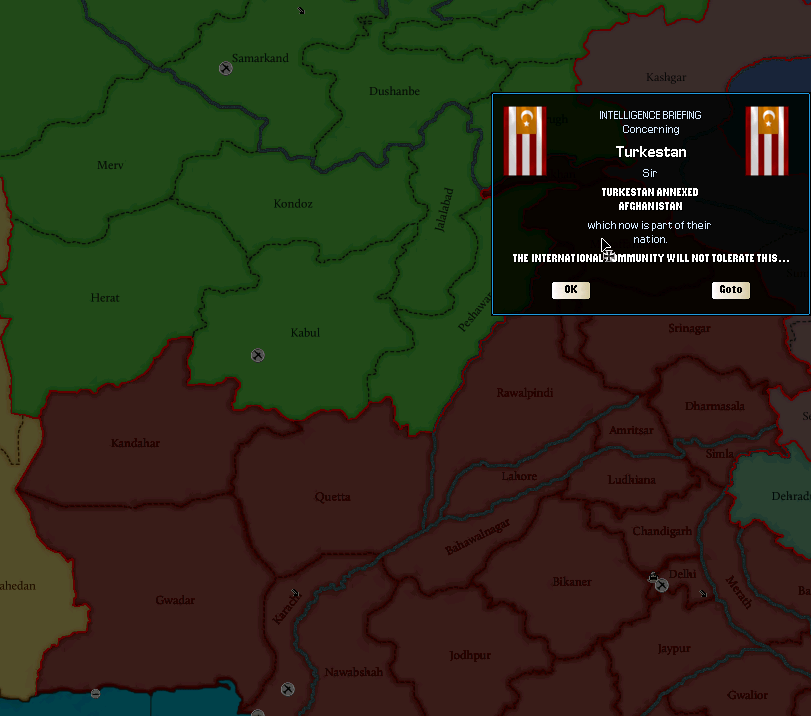
They were supposed to remain in the area to safeguard against an invasion by the Entente, but with the fall of Kabul, we were certain they would be withdrawn. But they haven’t been, and I have to think that means the Committee is regarding the threat of neutral occupation as a real one.


There also hasn’t been any kind of unnecessary delay in moving to block Portugal and South Africa either. The vultures are actually afraid that we may not be stopping at the borders of Mittelafrika.

June 16, 1943
I knew I told Norman I never would, but I had to let Randolph know. The Committee is loath to make any grand pronouncements without being sure but it’s hard to figure that this isn’t the end of the African front.

I had to manually edit the save to get control of Dar es Salaam back from Egypt. Don’t attack from puppet territory with puppet armies, friends.
The capital fell Thursday. Most of the German population fled to Zanzibar, where we suspect they are waiting for an evacuation to New Guinea. Goering was captured but managed to kill himself in his cell somehow. It is a shame that the people won’t get to see justice administered.

But that is just a tiny blemish on what is otherwise a shining triumphal moment. Mittelafrika is gone and even if we lose Europe, we have two continents united under the banner of the Internationale. Randolph is preparing a speech of his own, which shows how important this really is.

The liberation of Africa is a profound moment for black people everywhere. There is still more to be done, of course, but we have ripped the crown jewel of the German Empire out of its grasp for good. Both Randolph and Gitlow have invited me to their speeches, but I think given the circumstances, I will be declining the Chairman’s invitation.

July 4, 1943
I’ve heard the same joke six times today. “It’ll still be Independence Day somewhere, huh?” It was funny the first time. Rustin and Houser are pushing a resolution for an African Liberation Day for today, I think half for the explicit purpose and half to confiscate the Fourth of July for the black peoples of the world as a sort of symbolic restitution. A lot of people still celebrate Independence Day instead of Revolution Day, and some of the observations have a reactionary tone. To have a pan-African celebration on the same day will irritate many people who deserve to be irritated. I will certainly be voting in favor of that resolution and I hope the holiday catches on next year.

The African Section was, for lack of a better phrase, promoted today in Dakar. It is certainly no longer a group of exiles twiddling its thumbs in Paris. Thanks to the actions of the American Red Army and the advocacy of the diaspora, the territory of black Africa is in black hands. It is only a matter of time until the remaining colonies are liberated. The African Section is now the African Union.

I don’t expect this to be the end of controversy about Africa, not by a long shot. Europe and America ought to pay restitution to Africa. I doubt Europe will be overly willing to pay up, and America may only be willing when shamed into it by our black population. Africa has been neglected, brutalized and subjugated for centuries, and they will need industries, infrastructure, schools and teachers, healthcare, everything that they have been denied while Europe and America enjoyed them partially at their expense.
This makes Africa ripe for socialism, but what I believe the white left fails to understand is that Afro-socialism will not be a mere copy of western Marxism. It will take on its own character, and as Africa asserts full independence, it might leave a bad taste for my colleagues to give them unconditional aid despite what disagreements are bound to come. But that is what must be done.

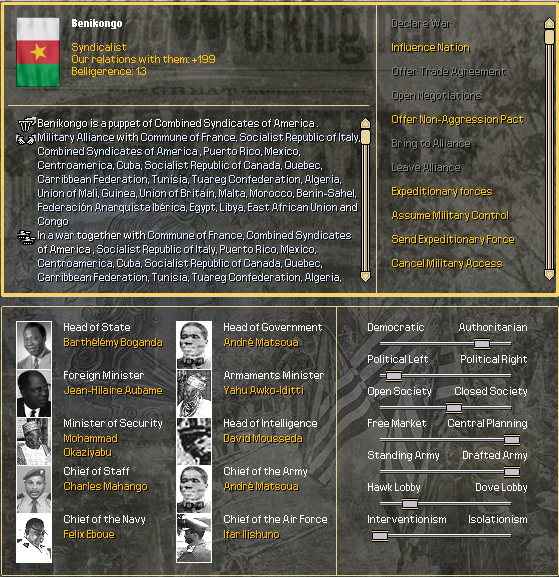

I don’t suffer the delusion that we will always do what is right. The leaders of free Africa will, ultimately, be left with the lion’s share of this tremendous task. I have faith that they will succeed and I look forward to playing a small part in forging this partnership of equals. To transform a relationship of exploitation and atrocity into one of friendship and mutual aid would prove that humanity has the potential to live at peace with itself. I pray that today’s optimism carries forth.





This Land is Your Land: A Darkest Hour: Kaiserreich AAR
in AARland
Posted
Chapter Six: The Second Wave (Winter 1944-1945)
“Plug that gap now!”
What looked like a full company of enemy soldiers were pouring through the breach in American lines. They had flat ground in front of them and ample opportunity to flank American positions on the left and right. There weren’t enough to overrun the Americans… yet.
“I’ve got a company on the way, T.”
“How soon?”
“Two minutes.”
“Not quick enough. The enemy is moving too fast. Do you have the guns set up yet, M?”
“No, T. This terrain is tricky, I need a few more minutes.”
Another company appeared in the breach. The enemy had deployed smoke up the middle and the Americans’ operational machine guns were firing blindly into it. There was enough ammunition for the guns to get away with it, for now, but the results were bound to be less than optimal.
“Fire the rockets, M.”
“These are our last rockets. Are you sure, T?”
“Yes!”
Moments later, streaks of fire and smoke appeared from the horizon behind the American lines, from behind the hills they were so desperately defending against the enemy onslaught.
“Come on, come on, come on! Stop these Frenchies!”
The friendly artillery couldn’t fire quickly enough for the forces on the ground. A third French company appeared out of the smoke into the breach, and then a fourth. This had to be the beginning of the main thrust of the French attack. Intel on just how many units the French had left was shaky but this attack represented at least a third of their remaining force, maybe more. Just then, R Force appeared and slowed the French advance. They were heavily outnumbered, but they didn’t need to beat them, they just needed to hold them until…
“TEANNA!”
A short black teenager with braided black hair spins around in her chair and finds her mother, standing in the doorway with her arms crossed.
“Oh… jeez… just a minute, hold on, Mom.”
“What’s that, T?
“Nothing, keep up the attack.”
Out of the corner of her eye, Teanna saw yellow streaks zipping over the blotchy green terrain, evaporating the tiny sprites in a violent explosion of brown and orange pixels. The little tricolors blipping off the minimap meant one thing: the French spearhead was getting crushed.
“Teanna, I am not going to sit here raising my voice for no reason. Pause the game.”
The diminutive American commander flicks the mute switch on her microphone so her subordinates don’t hear her being scolded by her mother.
“Mom, I can’t pause the game, it’s online. Can I just get a few more minutes? I’m almost done.”
“Your grandfather is waiting.”
“He was supposed to come tomorrow!”
“Do you want me to tell a 74-year-old man to come back tomorrow because his granddaughter is too busy playing Shootymans?”
“It’s called World at W- never mind. Please, mom, we’re about to win. This is an important match.”
“You have three minutes.”
The American commander, no longer mysteriously indisposed, returned to find that control of the situation was slipping through her fingers. The smoke had partially cleared, and the French and American lines were now perilously close. Some units were engaged in hand-to-hand combat.
“Did you guys do a frontal charge? Dam- uh, darn it.”
“No, T, their reserves charged out of the woods as the smoke cleared. Is your mom yelling at you again? Tell her to make more cookies.”
“My dad makes the cookies, not my mom. And stay focused!”
Artillery was out of the question. The close quarters combat created too much risk of friendly fire. But now that the blocky gray smoke sprites were dissipating, the commander could more clearly see the array of French forces. They didn’t have enough infantry to see this attack through. So why had they done it?
“M, get the guns out of there now!”
“You got it, T.”
Madeleine got two thirds of her guns out before French counter-battery fire raked the hill she had occupied. That had been the French gambit: push forward enough to get a bead on Madeleine’s position, then obliterate her guns and give the French supremacy in artillery. Not a bad plan, but not good enough to beat Teanna’s squad.
The French infantry pulled back towards the woods after their commanders realized the ploy had failed. Robert’s forces had taken losses but held their position, and critically, most of the machine gun positions on the left and right of the American line had survived, meaning that the French running back across the clearing were running into their field of fire without smoke to cover them. With dozens of their soldiers falling dead in a manner of seconds, La Mafia Québécoise finally raised the white flag. They didn’t have the forces to stop Robert and Teanna’s infantry from chasing down their surviving artillery.
The Atlanta All-Stars won the day. Teanna had figured they were finished as soon as they did the worst thing a team playing France could do: they’d gotten their armor killed early. Still, LMQ had proven to a be resourceful opponent. Not as resourceful as the All-Stars though. Teanna, Robert and Madeleine would move on to Round 4 against Murder Death Kill. MDK was using Qing this tournament. Teanna hated fighting Qing. Especially as America.
“Yes!!! Okay, good job guys, gotta go!”
Teanna exited the game with a few swift clicks, and bolted to her feet, spinning around to find her mother with her arms crossed in the doorway.
“See, mom? Under three minutes!”
“It was four and a half. But I’ll let it slide. I’m not really sure what was going on there, but you sounded like quite the leader.”
“I get it from you.”
Teanna smiled a disarming smile at her. Her mother shook her head at this, but couldn’t stop a slight smile from appearing on her face.
“Come on. Your grandfather is waiting.”
Teanna did feel bad that she had made her grandfather wait, so she edged ahead of her mom in the hallway and stomped down the stairs.
Her grandfather was sitting patiently at the kitchen table, keeping his hands pressed up against his warm coffee cup. He heard the commotion of Teanna’s heavy footfalls and looked over to see his granddaughter running down the stairs.
“Good Lord, how does a girl that tiny make so much noise?”
He began to slowly and deliberately brace himself to stand up out of his chair.
“Oh, Grandpa, please don’t stand, you don’t have to stand.”
Like many a proud old man would, he continued trying to stand anyway but Teanna’s arms were wrapped around him soon enough. Finally, he settled back into his chair and returned the hug.
“How are things, child? How was your New Year’s?”
“Good! Mom and Ashley and I went to the fireworks at the Spartakiade Grounds. How about you?”
“Oh, that’s fun. I called your Uncle Gerald and then turned in at nine. Exciting, huh?”
He laughed his raspy laugh. Smoking for all those years had done a number on his throat. Teanna’s mother spoke up from the stairs as she descended.
“Teanna, you were so wrapped up by that computer game of yours, you forgot the whole reason Grandpa is here.”
Her mother waved a photograph in the air, one that she had taken from Teanna’s desk.
“Oh, duh!”
Teanna sprang up, slid across the hardwood floor and plucked the photograph from her mother’s hands.
“So, Grandpa, I have this, like, family history project at school? So, I went through the old pictures we have upstairs and found this one with you and all these guys. Nobody knows who they are.”
She flipped the picture over and then placed it down in front of her grandfather, who squinted at it and then grabbed his reading glasses from his shirt pocket. He put them on and then lifted the photograph closer to his face, finally recognizing the four young black men smiling and standing in front of a large lake.
“Oh, wow. Oh, wow.”
~*~*~
From: ahaskins@atl.filmmakers.synd
To: all@atl.filmmakers.synd
Sent: 5:55 AM April 22, 2010
Subject: ALL HANDS ON DECK: The PAF&G is coming to Atlanta!
Body: The news hasn’t been made public yet, but the mayor’s office told me that the Pan-African Congress has chosen Atlanta for the next Pan-African Festival and Games. This is a really big deal for the city because it’s the first time the event is coming to America. The Pan-African Film Festival is also coming which means that the host nation will be able to choose the films it wants to headline.
Let me be clear on one thing:
I REFUSE TO LET THE LOS ANGELES BUREAU HEADLINE AT A FESTIVAL IN ATLANTA. IT WILL NOT HAPPEN. NOT UNDER MY WATCH.
With that being said, we must begin our journey to headlining the first ever Pan-African Film Festival in America TODAY. And we’re going to need everybody we got to make it happen. So here it is:
I need every one of you, no matter what your position or how long you’ve been with us, to submit any film ideas you have. Even if you think they have nothing to do with the theme of the diaspora, submit them anyway. We need the best ideas we have if want to come out ahead in this. And that idea might be yours!
Andrea Haskins
Bureau Chief
Atlanta Filmmaker’s Bureau
~*~*~
From: tcarter@atl.filmmakers.synd
To: creativecommittee@atl.filmmakers.synd
Sent: 11:26 PM April 22, 2010
Subject: PAFG Submission
Hey guys,
Very exciting news about the Festival! It got me thinking about a paper I wrote in school about my grandfather, who told me a story about when he was living in Chicago and him and three of his friends saw a movie about an American fighting in Mittelafrika and then made a pact together that they would go to Africa to help finish the African revolutions. I’ve attached a scan of the photograph they took that night and of the paper I wrote. Be warned that I was thirteen when I wrote it so it might be a bit confusing to read. Hit me up if you have any questions about it.
Thanks,
Teanna Carter
Apprentice Special Effects Engineer
Atlanta Filmmaker’s Bureau
[ATTACHMENT 1]
GrandpaAndHisFriends.png 4.35 MB
[IMAGE PREVIEW UNAVAILABLE]
[ATTACHMENT 2]
Familyhistoryassignment.rtf 34 KB
~*~*~
Teanna Carter
Personal History Paper
Mrs. Gargano
January 2, 2001
72/100 Good concept but it looks like you rushed it and it seems pretty obvious to me that you didn’t even attempt to revise it. I know you’re better than this, Teanna.
I found this photo of my grandfather and three of his friends in an old box. It doesn’t have a date or names on it, but my grandfather said it was taken in 1944 in Chicago.
He said he and his friends had watched a movie about an American soldier doing heroic things fighting in West Africa on a big screen they had put up for the Third Congress. Who’s they?
My grandfather and his friends had been apprentices for Chamber delegates. But their time was running out and they were going to have to go back to factories to work. Don’t start a sentence this way. My grandfather said he thought he had the ability to do something other than factory work that was also important. Read these sentences out loud. If they’re awkward, rewrite them.
He thought maybe he could be a scientist and work on some kind of secret project.
But when the British Civil War happened, he thought that maybe things weren’t as good in the world as he had thought. Socialist countries had been united but now things were tense between them. Different socialist nations were starting to do things in different ways that they didn’t agree about.
When he saw the movie, his friend Marvin said that they should go to Africa to help the rest of Africa defeat the colonialists. They all went to the Foreign Ministry office and signed up to volunteer the next day. My grandfather said he went to Namibia and helped the Army there fix up the railroads to the other countries so that fighters and supplies could be moved around to different countries where they helped the fight. This sentence runs on. His friend Marvin died over there. Over where? Be specific. His other friend Leon fought in Angola. His other friend Joshua fought in South Africa.
This is important to my family history because it’s how my grandfather decided he wanted to work for the Foreign Development Agency. If not for that, he might not have met my grandmother, who is Igbo and from Benikongo. You need to elaborate more with this final paragraph for it to be a suitable conclusion. You clearly did the work to research this, but your write-up needs a lot of work. Come talk to me after class.
~*~*~
From: ijohnson2@chi.filmmakers.synd
To: ahaskins@atl.filmmakers.synd
Sent: 1:56 PM May 19, 2010
Subject: RE: Archives Request
Body:
This concept sounds very interesting, so please feel free to contact us for any more assistance you may need. As you requested, I went through the archives and pinned down the records for the four men in the photograph.
Robert Carter, your associate’s grandfather, did indeed serve with the Volunteer Brigades in a support role in Windhoek, Namibia. His records show very little of note during the time in question. There were no special merits or demerits.
Leon Thomas, Jr. is the man to the right of Robert. Something you should know right away is that he is the Thomas in Pryor-Thomas, meaning he’s her father, so that’s an interesting wrinkle given how Pryor-Thomas feels about having anything about her personal life in the media. Thomas served in the Angolan detachment of the Volunteer Brigades as a medic. He was awarded the Medal of Military Merit by the Angolan government for his efforts in a battle near what is listed as Sá da Bandeira, today known as Lubango. Promising, but we don’t know any details about his heroism.
Marvin Harris III is the man to the left of Robert. He served in the Mozambican expedition as an infantryman. He was killed in action in that debacle.
The man to the left of Marvin is Joshua Brown. He served in South Africa as a “specialist.” What that means is undefined. There’s no information listed about his service at all, which is unusual. I would suggest getting into contact with the South African archives to see if they have records of his service.
By the way… you sounded like you were going to start sending bombs to the LA bureau. Nobody wants a bureau from another city to headline in theirs but you’re gonna burn yourself out if you let yourself stay so mad about it.
Isabel Johnson
Lead Researcher
Chicago Filmmaker’s Bureau
~*~*~
From: jmartinez@nyc.filmmakers.synd
To: ahaskins@atl.filmmakers.synd
Sent: 9:18 AM June 8, 2010
Subject: RE: Angola???
Hey Andrea, it was great to hear from you! When are you coming up to New York again?! We need to have lunch.
I love the idea, and I think the judges will go for it. I’m sure it’s better than whatever Los Angeles is doing, I don’t think you need to be so worried about them. Anyway, we do have people in Angola working on some nature shit for the Ministry of Education. I’ve been sorting through footage of aardvarks fucking for weeks and helping you with this would be a welcome change of pace. I forwarded everything in your email to our team there and I’ll let you know as soon as I hear back.
Joel Martinez
Lead Producer
New York Filmmaker’s Bureau
~*~*~
From: ahaskins@atl.filmmakers.synd
To: all@atl.filmmakers.synd
Sent: 10:24 AM June 14, 2010
Subject: SOMEBODY TOLD
Body:
Los Angeles knows about the Angola proposal and has their own people on the ground already, and they’re definitely trying to steal OUR idea. I’m gonna figure out which one of you decided to blab on some dumb fucking forum which I’ve TOLD YOU: LA IS ALWAYS WATCHING THOSE FORUMS. When I do figure it out, you’ll be making STI prevention PSAs for the rest of your fucking life. Get your shit together!!!
Andrea Haskins
Bureau Chief
Atlanta Filmmaker’s Bureau
~*~*~
From: ahaskins@atl.filmmakers.synd
To: all@atl.filmmakers.synd
Sent: 10:29 AM June 14, 2010
Subject: Regarding my last email
Body: I apologize for the severity of my last email. It was unprofessional and unbecoming. Please refer to bureau bylaw 715.6A regarding keeping production information confidential. Furthermore, I am aware and always willing to abide by our participatory disciplinary process. Thank you.
Andrea Haskins
Bureau Chief
Atlanta Filmmaker’s Bureau
~*~*~
From: jmartinez@nyc.filmmakers.synd
To: ahaskins@atl.filmmakers.synd
Sent: 5:56 PM June 26, 2010
Subject: Re: Angola research
Body: Apparently the Angola archives fucked up and gave the information my guys requested to somebody from the L.A. bureau who is also in Luanda. They were perfectly nice about it and dropped it off at the studio we’re working out of here.
Anyway, the nature bullshit is held up because some baboons (literal baboons) wrecked our camera. Since my Director of Photography is an obnoxious perfectionist, the camera that got wrecked needs some ridiculously specific part that is only made in Vietnam. The shit we put up with for our craft! That means my guys don’t have shit to do so I had them digitize all the documents the defense ministry handed over about the foreign volunteers. And they handed over a lot, way more than what you asked for.
The records include details of ALL foreign support efforts of the Angolan revolution, even what nations who didn’t send fighters did. It’s a massive file so they’ll send it over through FTP when they can.
Joel Martinez
Lead Producer
New York Filmmaker’s Bureau
~*~*~
From: jjefferson@atl.filmmakers.synd
To: creativecommittee@atl.filmmakers.synd
Sent: 2:56 PM August 6, 2010
Subject: Done with the Angola files
We’re preparing a full presentation of what’s in the Angola files, but I wanted to get a brief summary of the key points to everybody before the weekend.
Leon Thomas Jr. does appear in Angola’s service records, and his service record is just about as vague as the American record that Isabel found for us. The Leon Thomas Jr. story according to the Angolan and American records is that he was a medic and he was heroic enough in Lubango to get a medal. What was that heroism? Nobody bothered to write it down.
Leon, as a semi-public figure, has mentioned getting a medal in Angola, but doesn’t really discuss what he did to earn it. Not an uncommon trait amongst war heroes, but something that I think arouses suspicion combined with something else we learned.
Who’s going to clear this up for us? The British, of course! Unlike the American Red Army, who seemed content to vomit volunteers and equipment into Africa without ever following up to see what those men and materiel were being used for, the Republican Army organized and sent their own units with British commanders. And they kept records of what they did.
This is pretty typical of the time. British military intelligence had long standing connections with African socialist groups and provided support to their favored factions within the broader Angolan Revolution. Compared to the French and British, American intelligence networks in Africa were embryonic. The American Red Army went from having no contacts in these colonies to managing large-scale war efforts in a matter of months. So, the Angolan revolutionaries figured out that they could goad America into sending more troops by showering honors upon the volunteers. The American government, in their amateurish lust for good will and good press, totally took the bait and threw troops and equipment at any group that could sing even the first line of The Internationale and would pin a medal on an American.
The same flattery tactics didn’t work on the British. The British command was deciding how many people it would send to Angola and so Angolan coaxing for more support took place at higher levels. Thus, the Angolans were more likely to be honest about what the British fighters were doing. An American fighter in Angola was six times more likely to be awarded a medal than a British fighter.
So, in order to get a more accurate picture of what actually went down in the Angolan Revolution, we dive into the British records. The British kept records of all engagements they had knowledge of, even ones with no direct British involvement. They do show one engagement near Lubango, where an Angolan militia (which included 75 American volunteers) surrounded and captured a Portuguese unit in the dead of night, inflicting “about 150” casualties on the enemy with only 2 Angolans suffering “minor injuries.”
Leon has always been vague about what happened in Lubango. He says he earned his medal for being a “good medic.” How many opportunities are there to be a good medic when there are two minor injuries in your entire force? I’ll let you all draw your own conclusions about that.
Jamie Jefferson
Researcher & Archivist
Atlanta Filmmaker’s Bureau
~*~*~
From: ahaskins@atl.filmmakers.synd
To: creativecommittee@atl.filmmakers.synd
CC: tcarter@atl.filmmakers.synd
Sent: 4:24 PM September 9, 2010
Subject: Focusing the Project
Body: If you missed the meeting today, then here’s a quick catch up on what we decided.
We can’t possibly fit the stories of all four men into one movie. Robert’s story is too uneventful, and Leon’s is far too unreliable. So that leaves Marvin in Mozambique and Joshua in South Africa. We don’t know enough about Joshua yet but many of you have made interesting cases to center the project around Marvin.
We decided not to do that. Here’s why.
France refused to help the Mozambican socialists because of a petty disagreement between the negotiators. This is really a pretty shameful thing we’d have to contend with for a story with Mozambique and I just don’t think it would make for the type of film that the festival judges would choose as a headliner.
It’s important for the film to center the fact that the Africans liberated Africa, with our assistance. While we can make an American the central character, we must also center the story of what they learned from and how they supported the local population. However, the campaign in Mozambique was disjointed from the start. The locals and Americans didn’t communicate effectively, so I don’t know if this is the kind of story we want to tell either.
And so, the climax of the Marvin story would be as follows: Marvin lands with the rest of the Americans. Because the Portuguese knew they were coming, they were massacred.
The Mozambican Revolution fails. I don’t know about you, but I’m not brimming with Afro-American pride because of this endeavor. It was a disaster, and while I’m interested by a film that deals with the frustrations when international socialist solidarity fails, I don’t think its appropriate for the Festival. Marvin is a hero, but not the hero for the story we need to be telling.
The paucity of film about the first Mozambican Revolution was a good point in favor of centering Marvin. However, South Africa’s revolution gets more attention for a reason, because it was longer, more fruitful and more intricate. On the other hand, it dominates French film about Africa because the French love to play up their alliance with the RSA. If you ask me, it’s because they’re ashamed of how they failed other African states. From what I remember from to the judges at the Lagos festival, they were fairly negative about how French submissions so often center white French heroes in the South African Revolution. However, we are not France. Black America is part of the pan-African community and, in my opinion, we are not being obnoxious or colonial by telling the story of a black American who fought to liberate black Africans. It’s different, and we have the experience and insight to do this kind of story the right way. Provided we can get the information we need about Joshua’s service, I think this could be a very promising subject.
Andrea Haskins
Bureau Chief
Atlanta Filmmaker’s Bureau
~*~*~
From: ahaskins@atl.filmmakers.synd
To: creativecommittee@atl.filmmakers.synd
CC: tcarter@atl.filmmakers.synd
Sent: 12:42 PM October 2, 2010
Subject: Re: The South Africa Project
Body: We heard from the archives and they can’t give us the files about Joshua’s service until the Ministry of Defence there approves their declassification. I am told that this is a formality and that there’s no reason not to declassify them. This will make it very public what we’re looking into. Luckily, I have it on good authority that Los Angeles has chosen their concept. I’m told that it’s basically Hamlet but the characters are all lions in the savanna. It sounds moronic. In the meantime, we did get some previously declassified information about a woman connected to Joshua. And it’s real good stuff.
Joshua married a woman named Unathi Masuku, and she was an instrumental figure in orchestrating the initial wave of urban uprisings which marked the beginning of the end for the white regime.
She earned three separate medals for heroism in the battle of Mbabane. Two of the medals mention bravery in hand to hand combat. Unathi was the REAL DEAL. We’re sending a team over and they’re going to track down her descendants immediately. Even if we don’t find anything about Joshua, we could probably just make the whole movie about her.
Andrea Haskins
Bureau Chief
Atlanta Filmmaker’s Bureau
~*~*~
From: jjefferson@atl.filmmakers.synd
To: creativecommittee@atl.filmmakers.synd
Sent: 2:48 AM October 9, 2010
Subject: Unathi’s Family
Body: Teanna and I talked to some Joshua and Unathi’s children today. They had some real interesting stories to pass down from their parents.
They had quite the story about some British guy named Roger. Apparently, he was Unathi’s first squeeze, as Unathi and her ANC cell had been paired with Roger’s British special operations unit, doing some real high stakes sabotage operations.
One day, they are headed to meet a French team for some big operation, and they all get ambushed. Roger gets wounded and Ubathi has to leave him behind in order to get the rest of her people out alive. She figures that Roger has been captured and wants to find out where he’s being kept so her people can attempt a rescue. A few days later, Ubathi gets word that her childhood home has been burnt down and that Roger’s head was left amidst the ruins, stuck on a bayonet. The regime forces had executed him and targeted Ubathi’s family for reprisal. It was supposed to intimidate her. Naturally, it ended up infuriating her instead.
Lo and behold, this happens to the exact same day that Joshua arrives in the town. He was supposed to be a regular infantryman but Ubathi picked him at random out of the new arrivals and conscripted him for her special operations squad. The children are insistent that this was destiny.
They didn’t have much to say about what Joshua and Ubathi got up to, so hopefully we can find out more about that. But they do mention that the family house outside Bulawayo is the house where Ubathi killed Roger’s murderer. Not really sure what the story is there but that region saw a lot of counter-revolutionary activity, so it would follow that his murderer would seek refuge there after the cities to the south fell to the ANC. I’ll look into it more.
Jamie Jefferson
Researcher & Archivist
Atlanta Filmmaker’s Bureau
~*~*~
From: ahaskins@atl.filmmakers.synd
To: all@atl.filmmakers.synd
Sent: 8:56 AM October 30, 2010
Subject: We Have Our Film!
Body: We spent all weekend going over the material provided to us by the South African Ministry of Defence and goddamn, we have our movie! Here’s the basic outline:
Ubathi Masuku, tough young lady, is fighting to liberate South Africa with a dashing Brit who she has feelings for. They get ambushed! The Brit is captured! Oh no! Ubathi resolves to rescue her comrade, but tragedy strikes when regime forces burn down her mother’s house and leave the Brit’s head as a warning! She’s not intimidated by this, she’s mad as hell! So, she picks out of a group of new arrivals a handsome young man who made a vow that he would help free Africa the way his father fought to free America. Joshua Brown is in the squad and they have a mission: Find everybody responsible for terrorizing her family and executing their people. They all have to pay! As Ubathi, Joshua and the squad work to bring justice to the murderers, Joshua and Ubathi bond and fall in love!
It’s got it all! Loss! Love! Action! We don’t have to make up too many things! This is our movie! I can’t wait to make it happen with all of you.
Andrea Haskins
Bureau Chief
Atlanta Filmmaker’s Bureau
~*~*~
From: ahaskins@atl.filmmakers.synd
To: tcarter@atl.filmmakers.synd
Sent: 10:56 PM April 26, 2012
Subject: just for you
Body: I wanted you to be the first person in the bureau to know this because this all started with you. We did it.
Gold Medal. Headliner of the Pan-African Film Festival. In our own city. On our own terms. Those smug bastards in Los Angeles can eat our WHOLE ASS, and it all started with you not being too embarrassed to show your terribly written middle school paper to all your comrades. Thank you so much.
Andrea Haskins
Bureau Chief
Atlanta Filmmaker’s Bureau
~*~*~
From: jyang@lax.filmmakers.synd
To: ahaskins@atl.filmmakers.synd
Sent: 6:45 PM May 5, 2012
Subject: Loved the movie!
Heya Andrea!
Just wanted to pass along congratulations on the big honor! Masuku’s Marauders, The Atlanta Bureau’s first headliner of a major film festival! Who would have thought when we were roommates at Haywood that we’d both have major headliners!
I did see the film and I have to say the ending was masterful! Joshua avoiding talking to Ubathi about what he’ll do after the war the whole film. And then he finally says he wants to stay! I. Was. SOBBING!! Where’d you find these actors?! They really made it all work.
The whole final scene where they go to the manor of Colonel Van Onselen was so great. They’re not just walking happily into the sunset, no that’s way too simplistic. Instead they find this quiet idyllic manor, and after every terrible thing that has happened, they are in this peaceful quaint little place removed from it all. Every bit of peace and pleasantness Van Onselen had in his life was gained from the cruelty he inflicted on others. And after all of that, Ubathi had taken it from him. That’s what she’s experiencing when she sits on his furniture and just sobs because she’s SO TIRED. That catharsis… I felt that. Does the revolutionary exult in their glory so much as they struggle to gain the opportunity to have that kind of catharsis and healing in peace and under their own sovereignty? Rhetorical question, of course.
We should get together and chat about our different angles on it. Just like the old days in our dorm.
Love and miss you,
Jenny Yang
Bureau Chief
Los Angeles Filmmaker’s Bureau